|

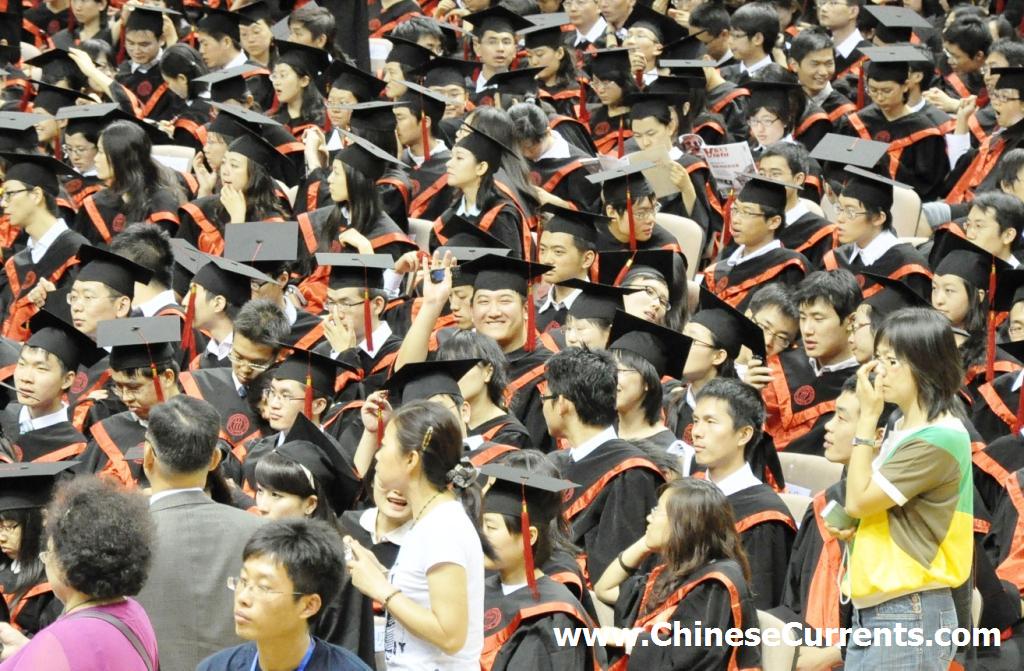

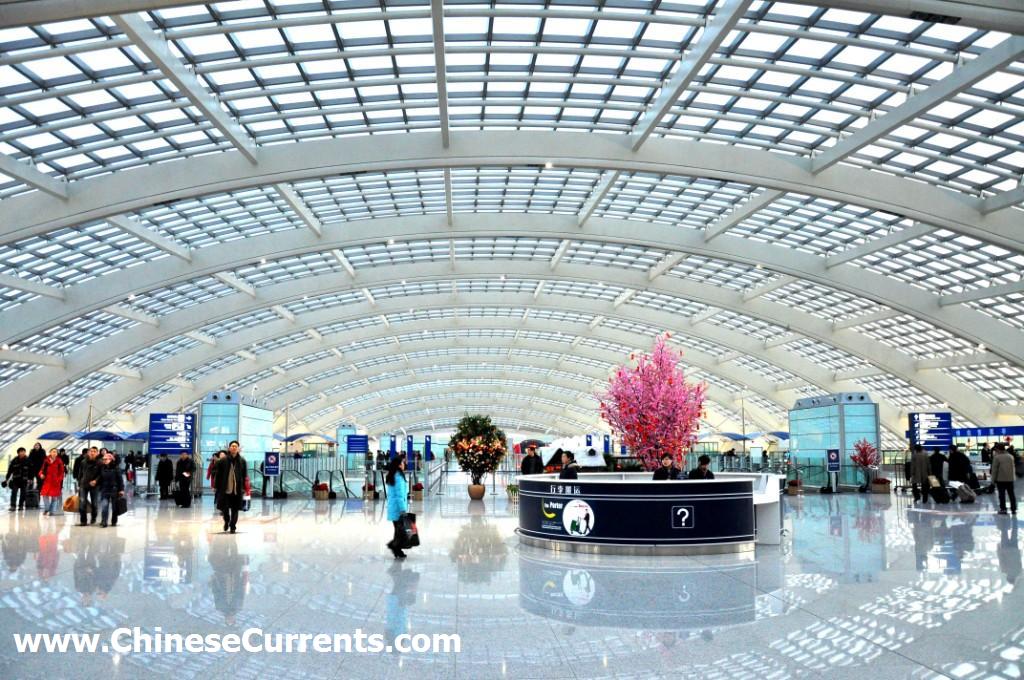
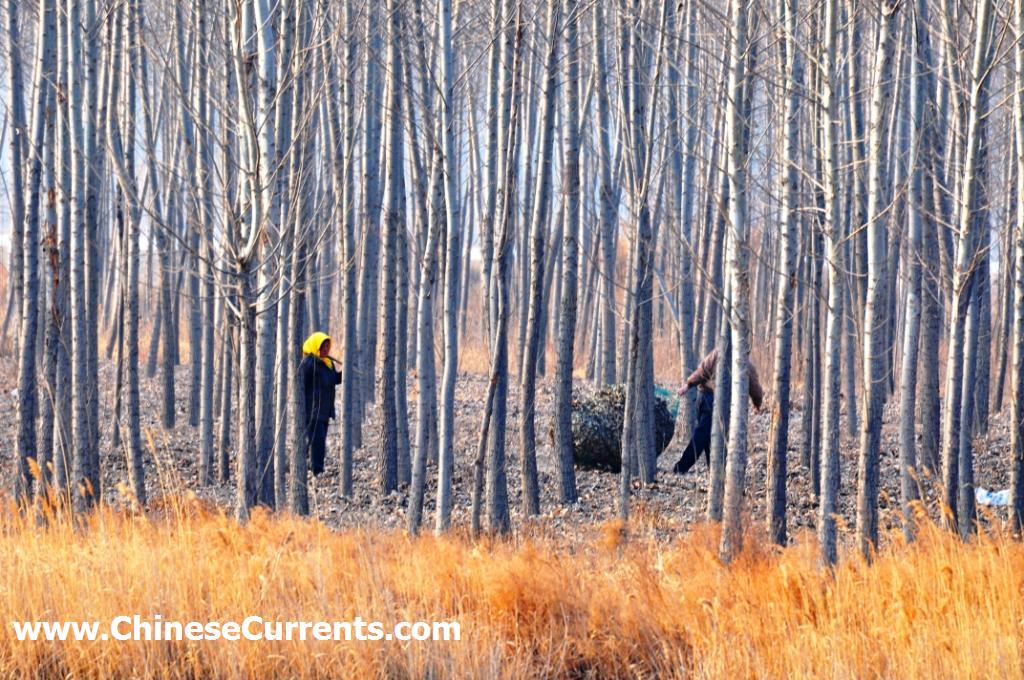
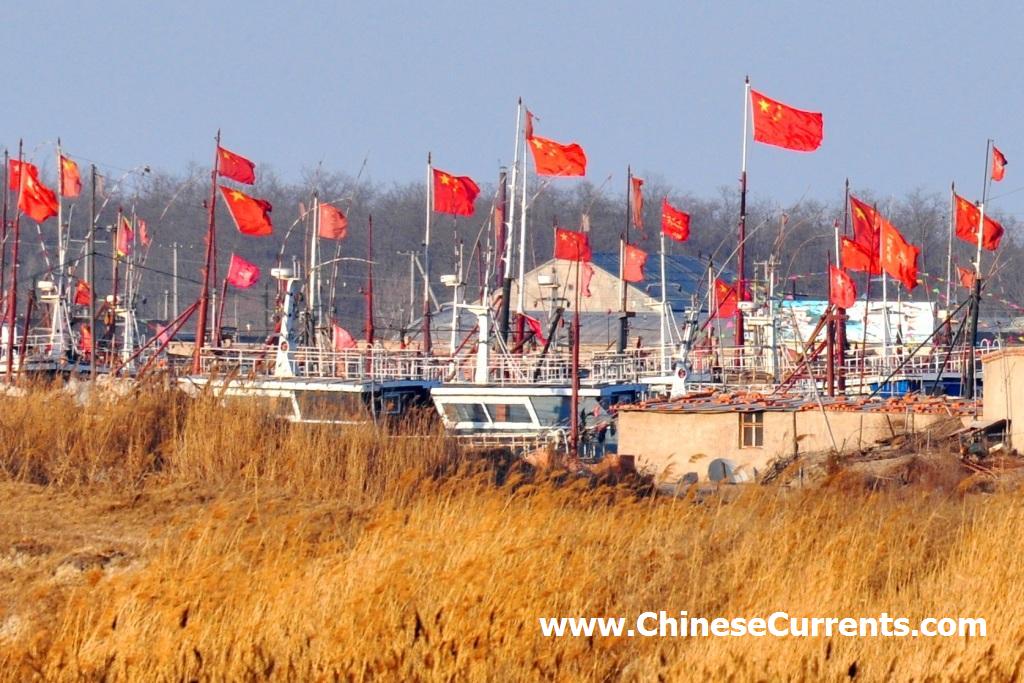
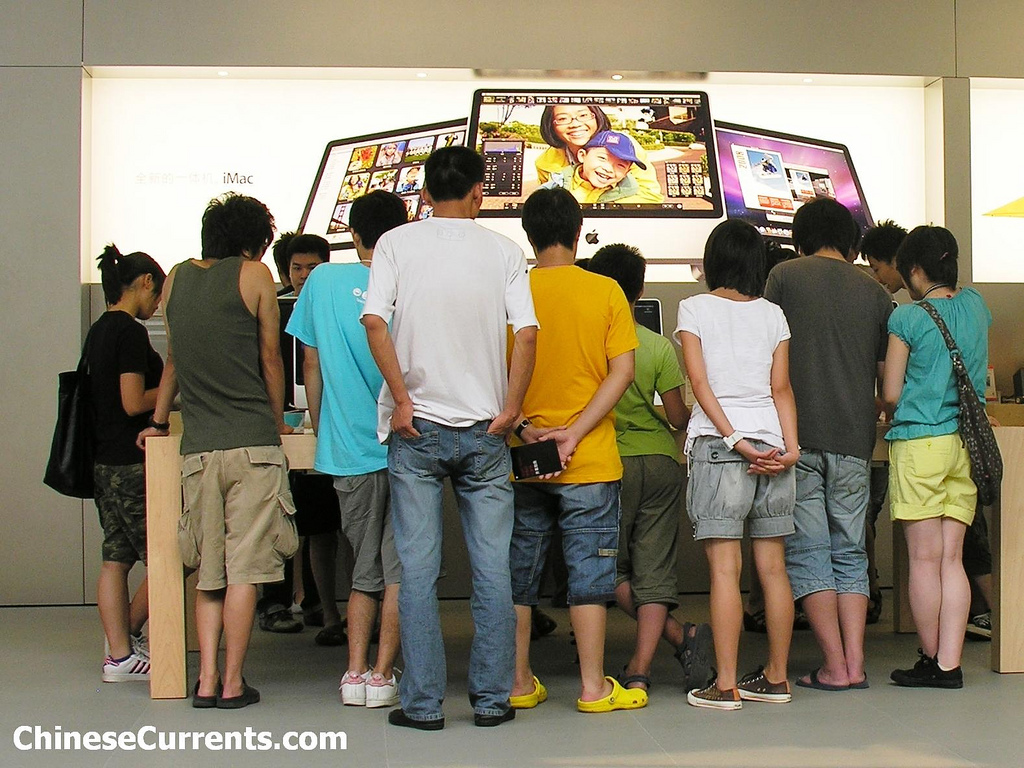
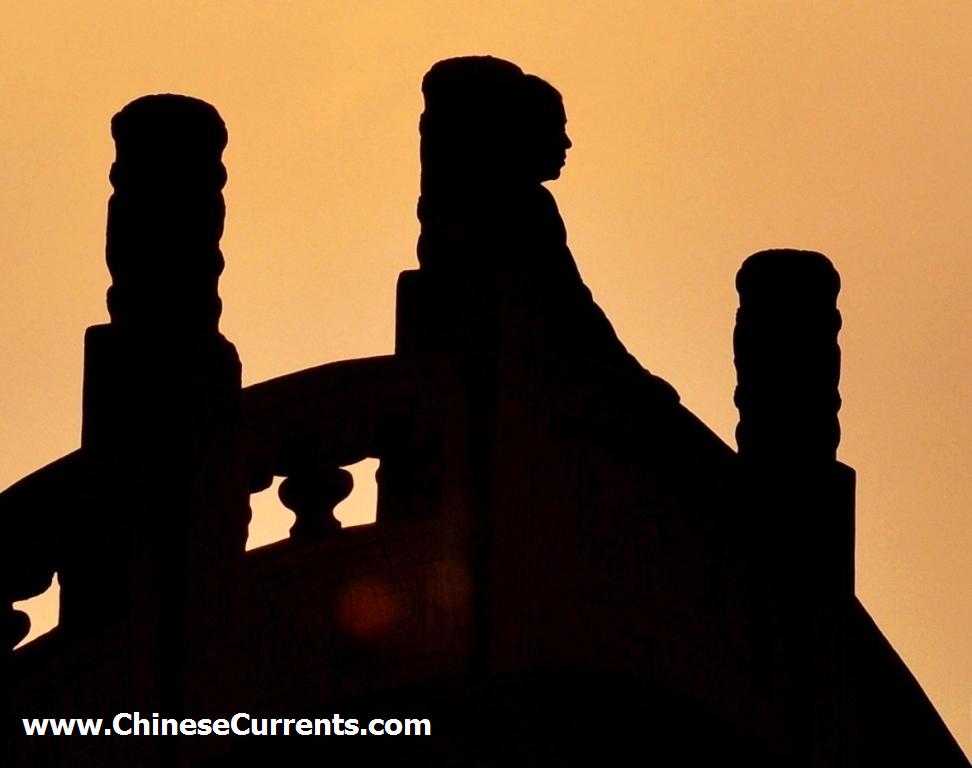
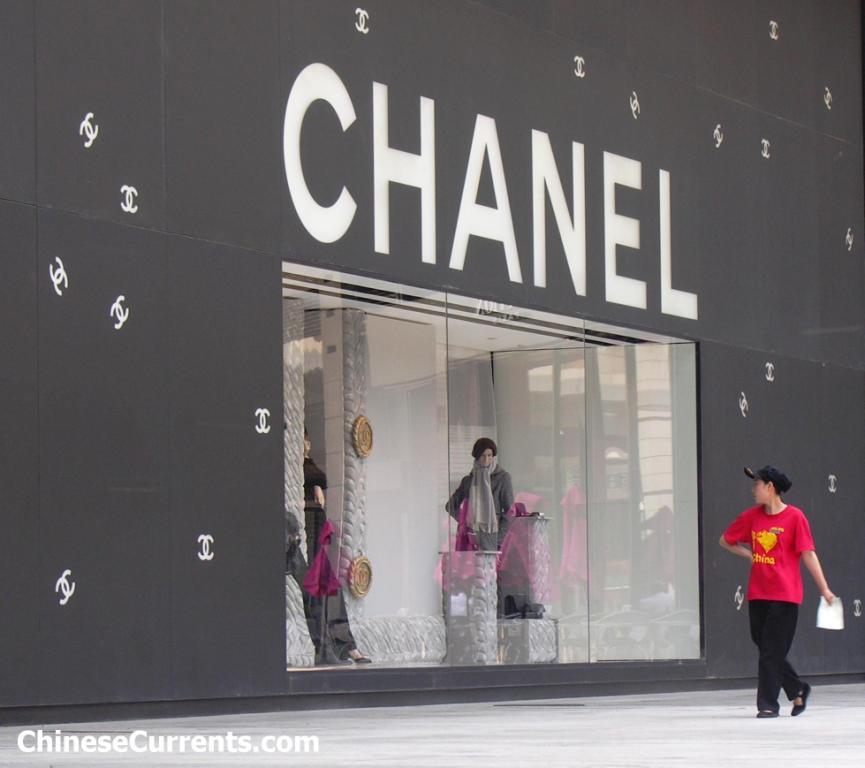
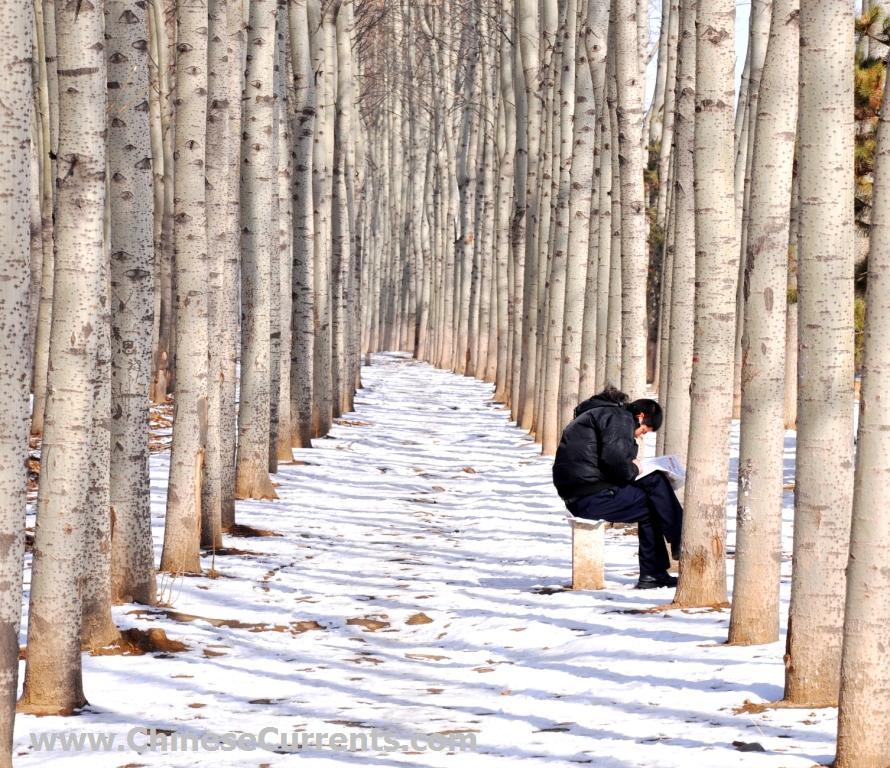
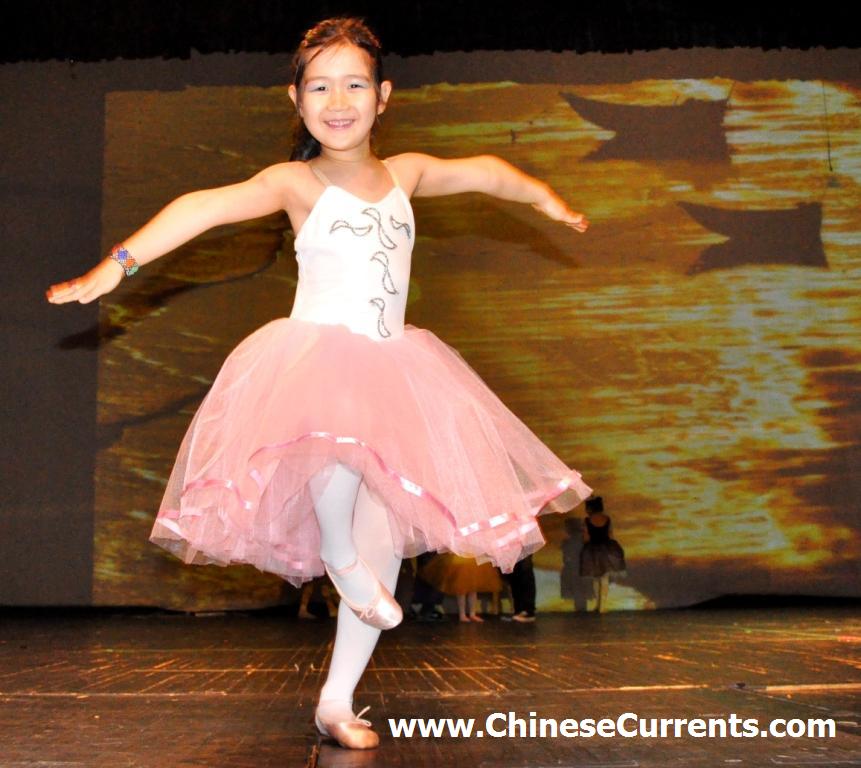
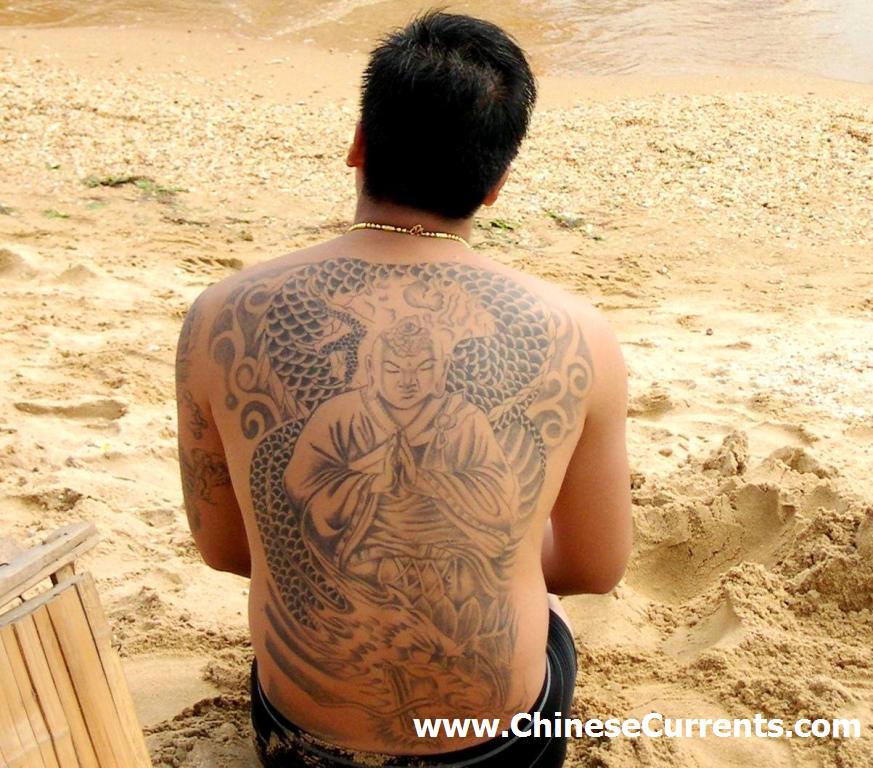

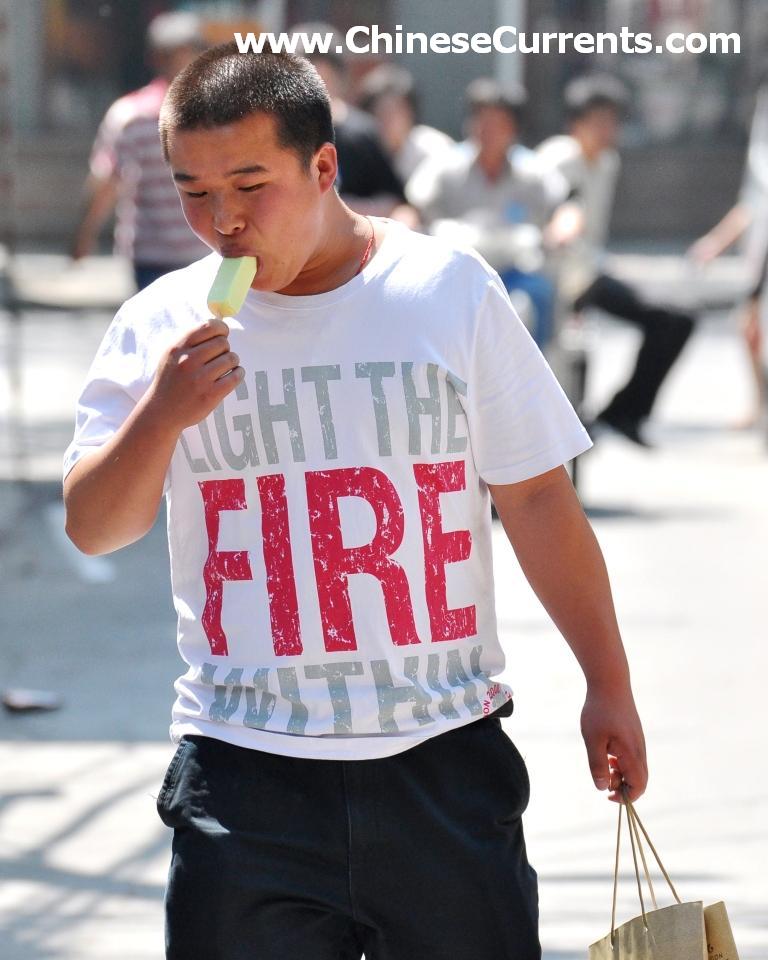
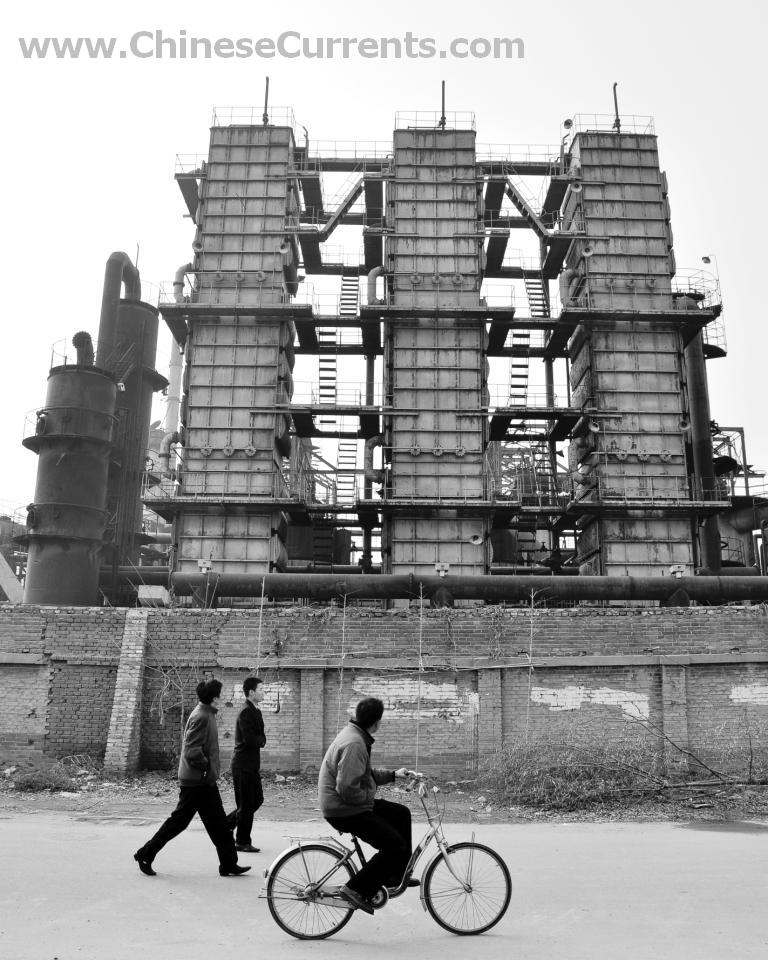

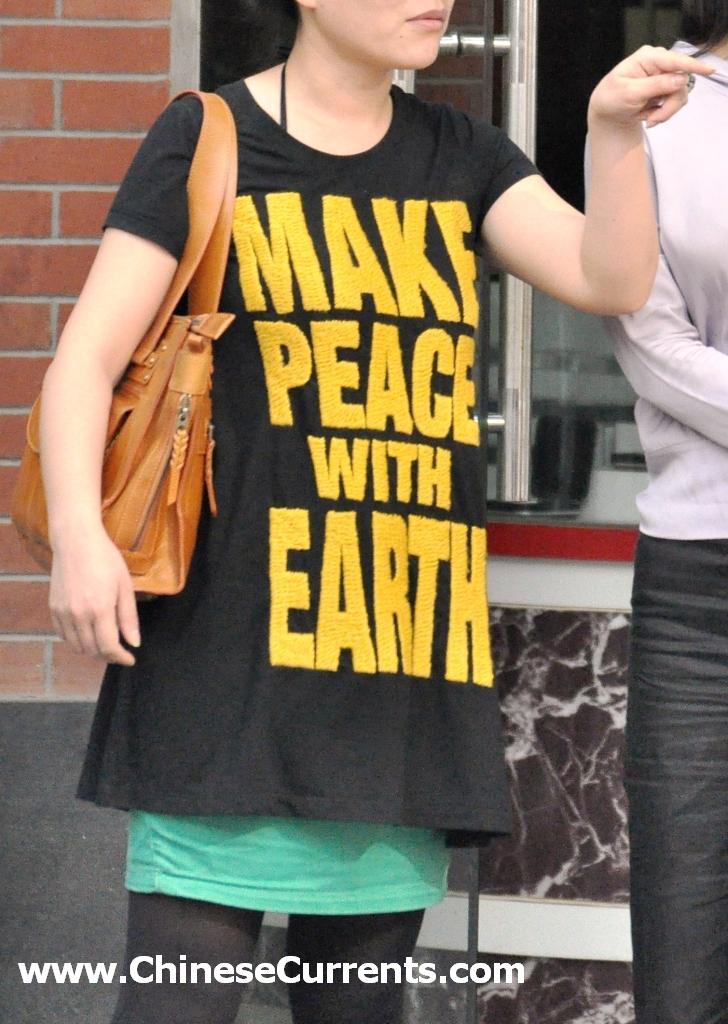
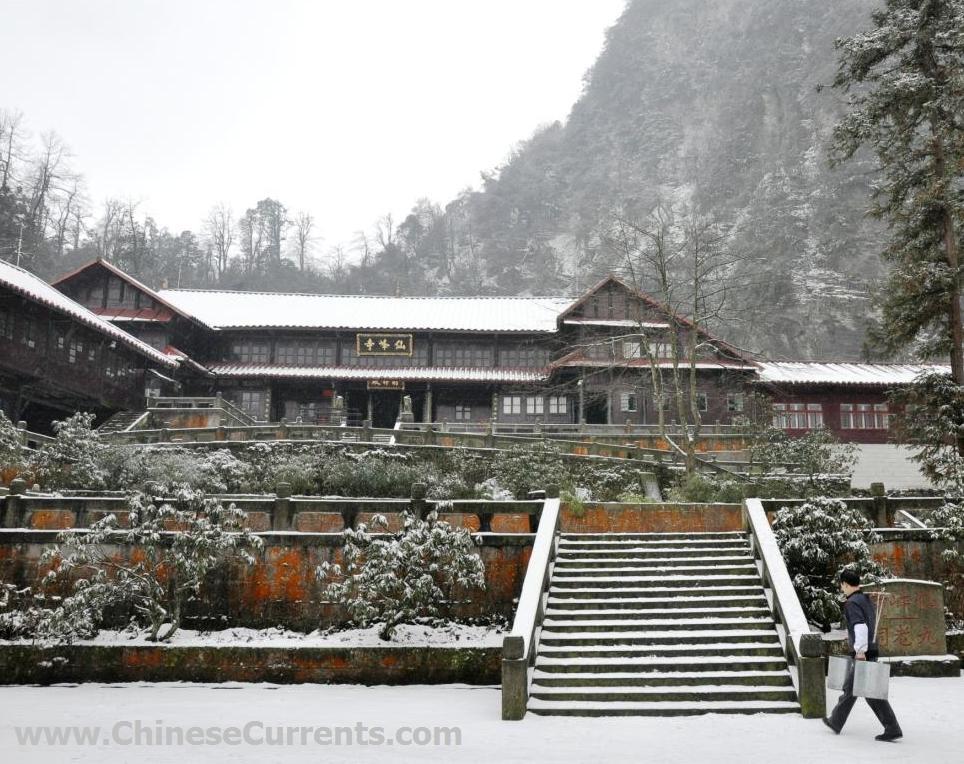
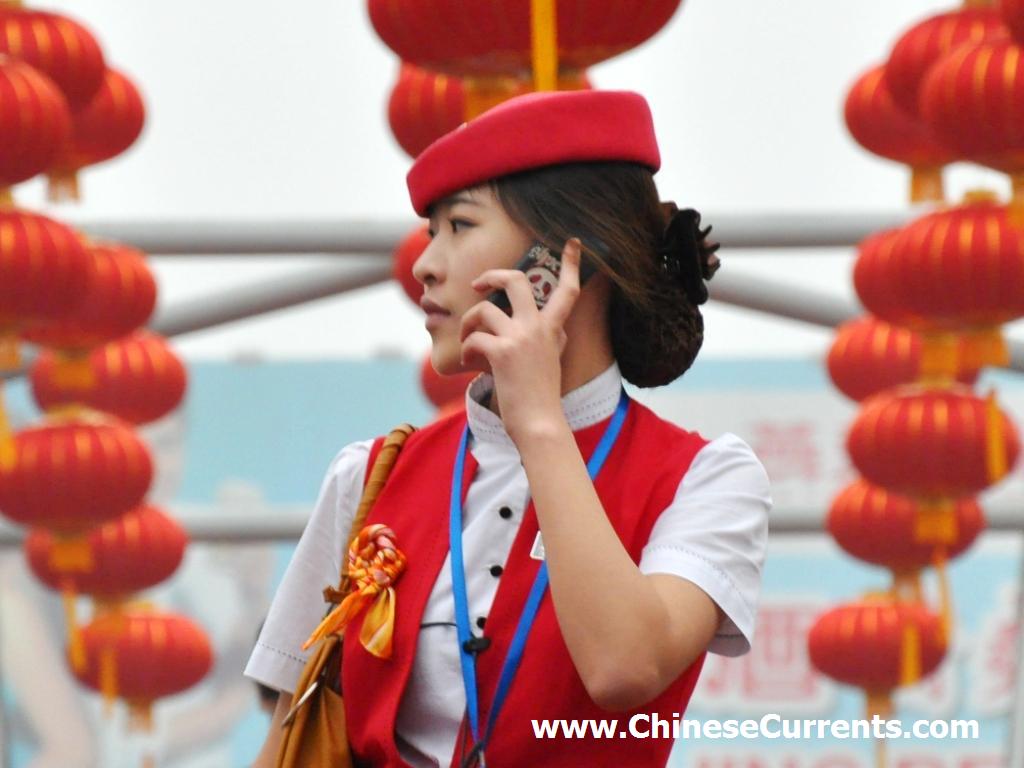
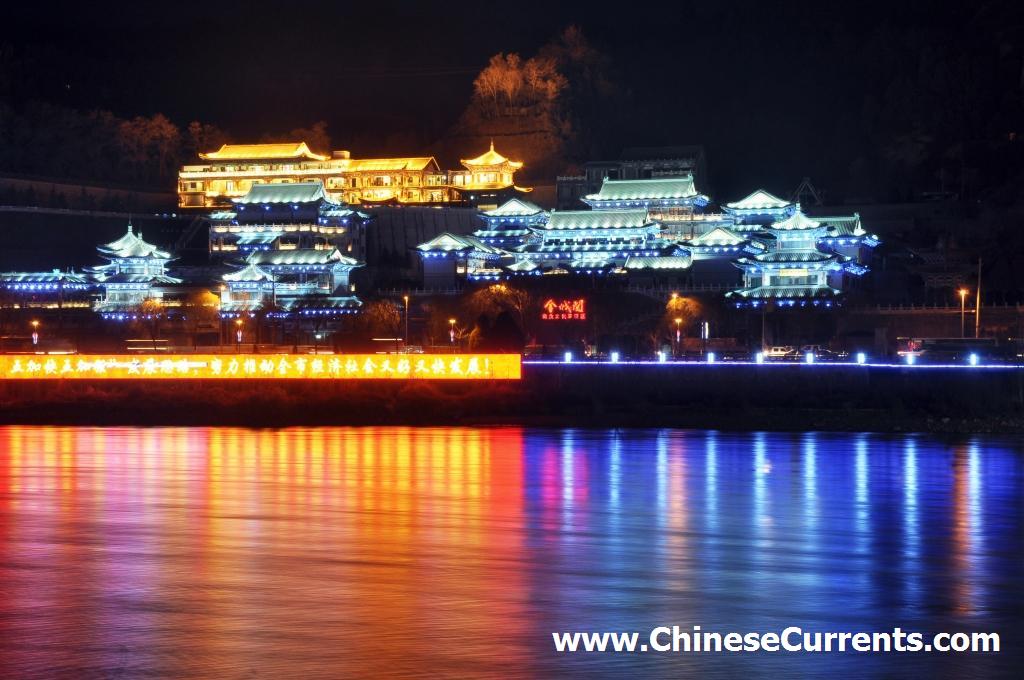
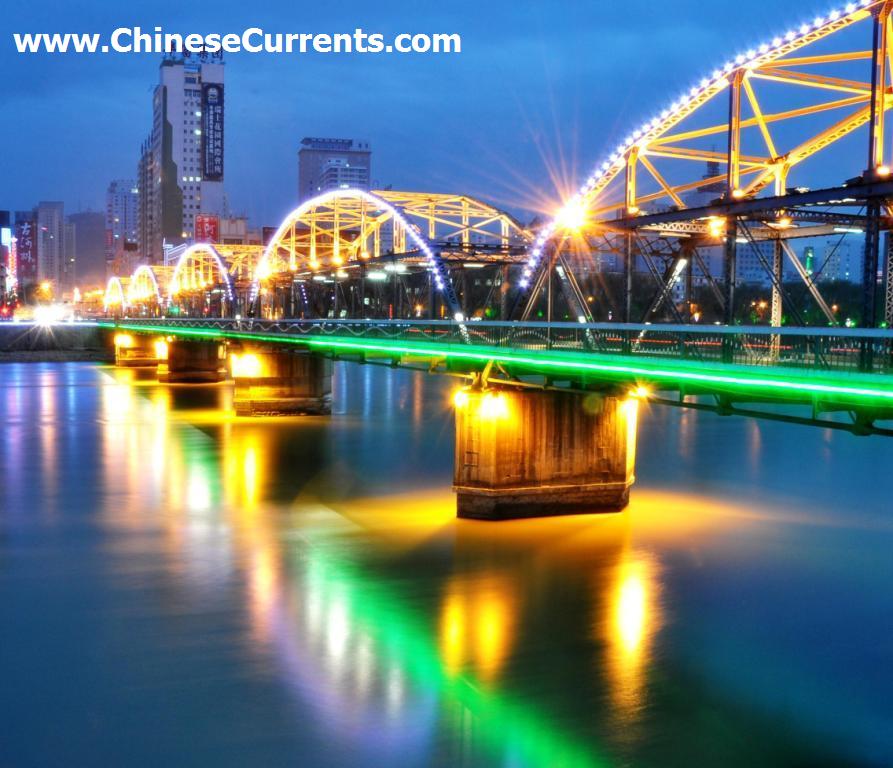
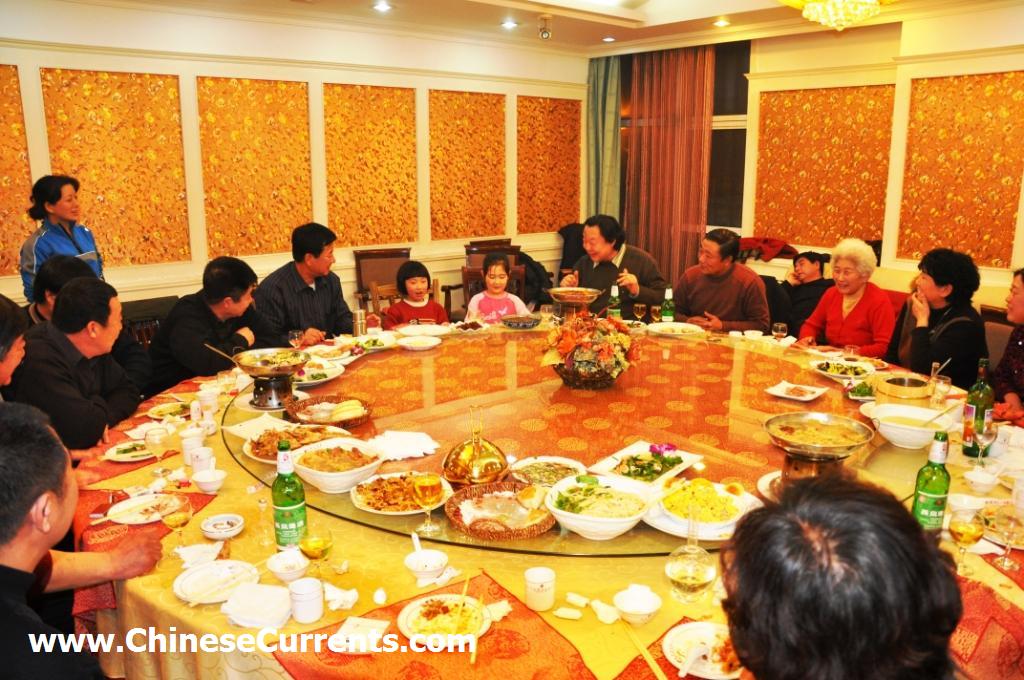
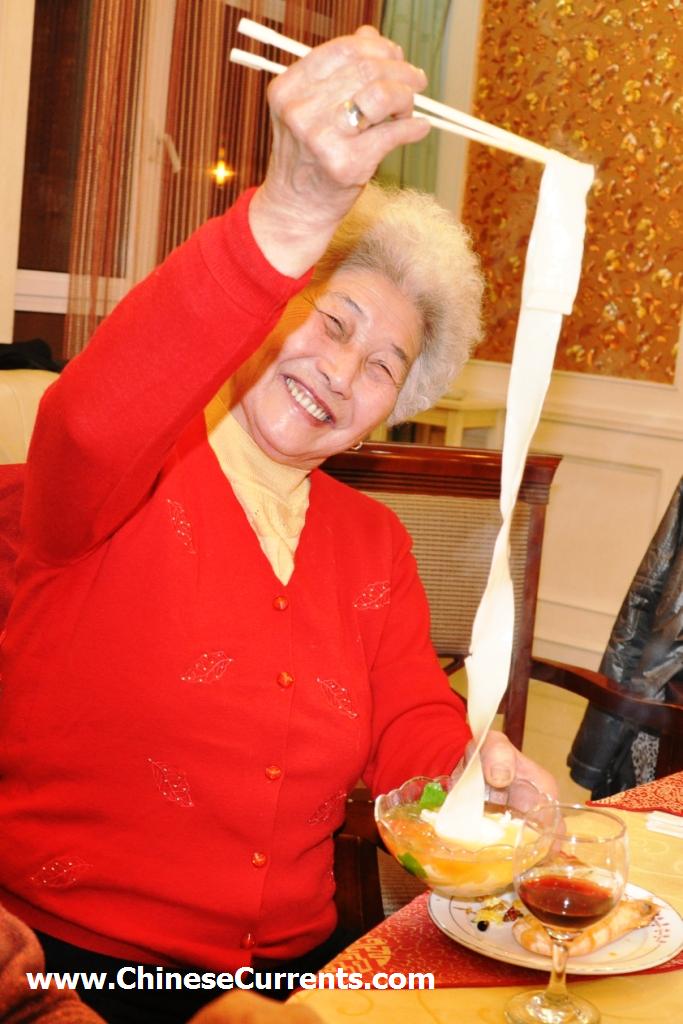
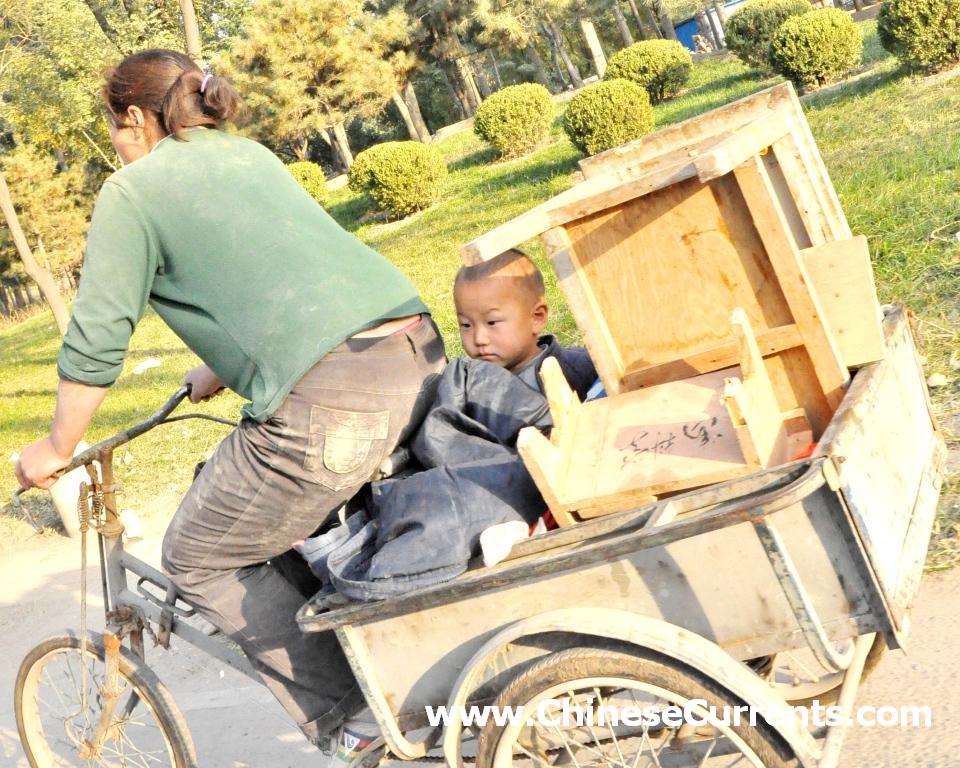
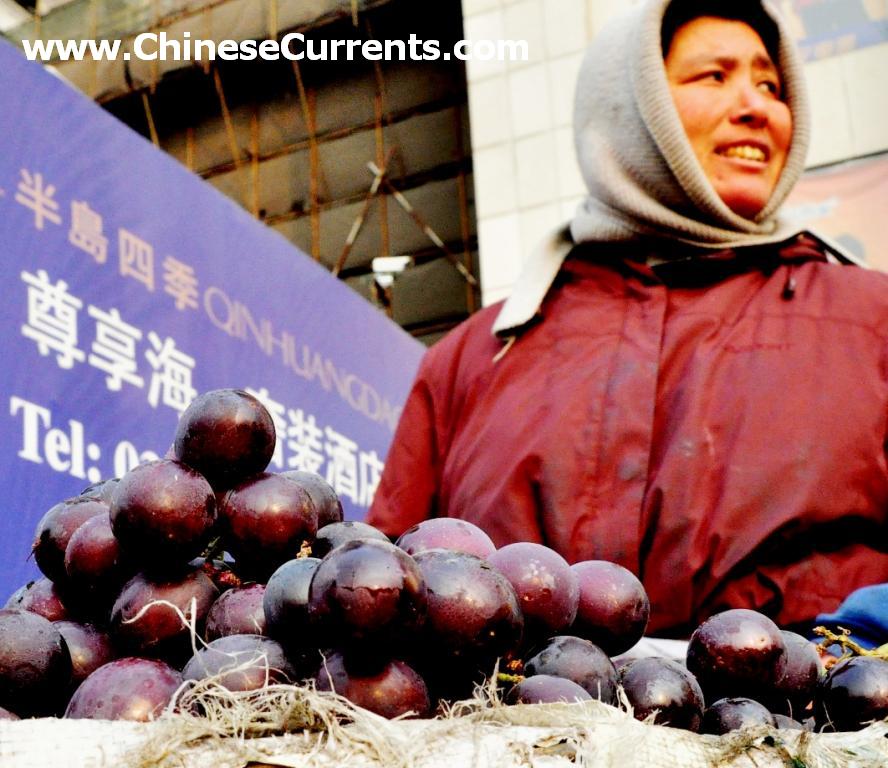
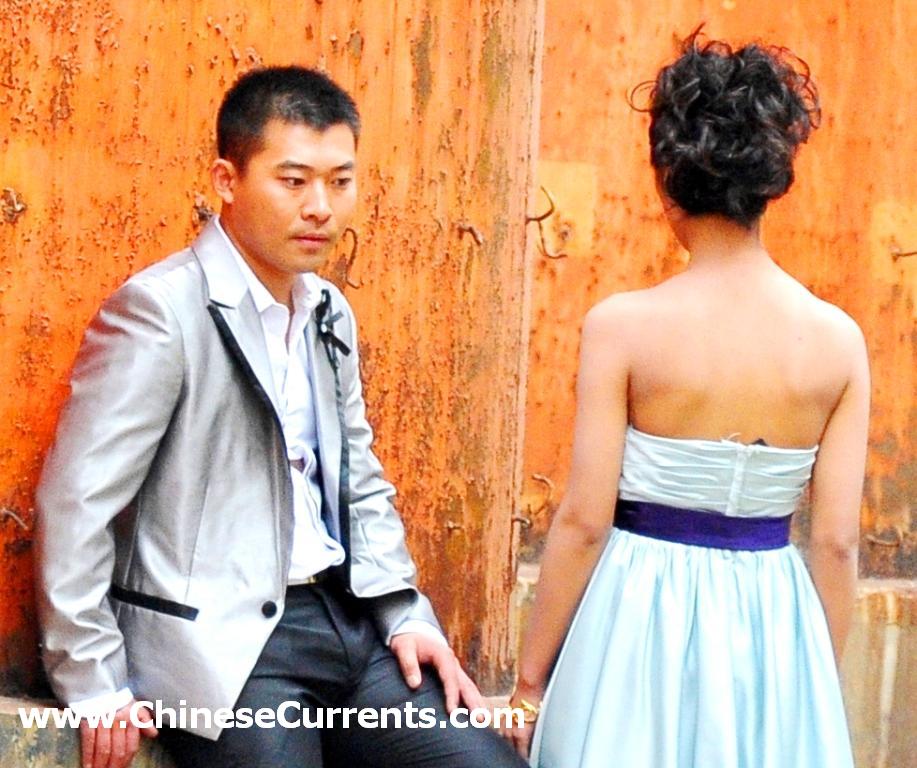
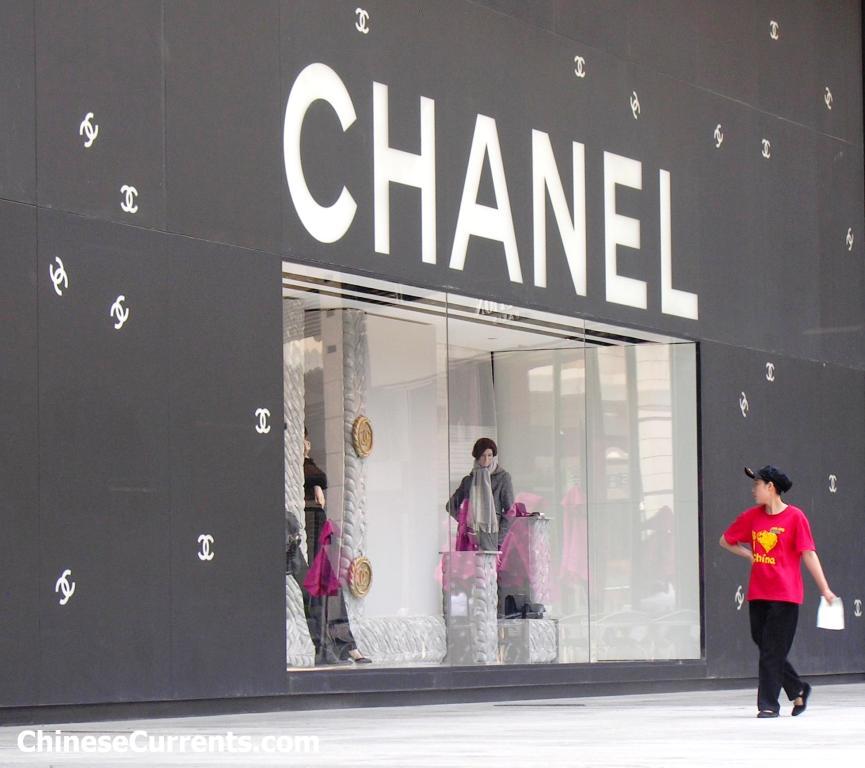
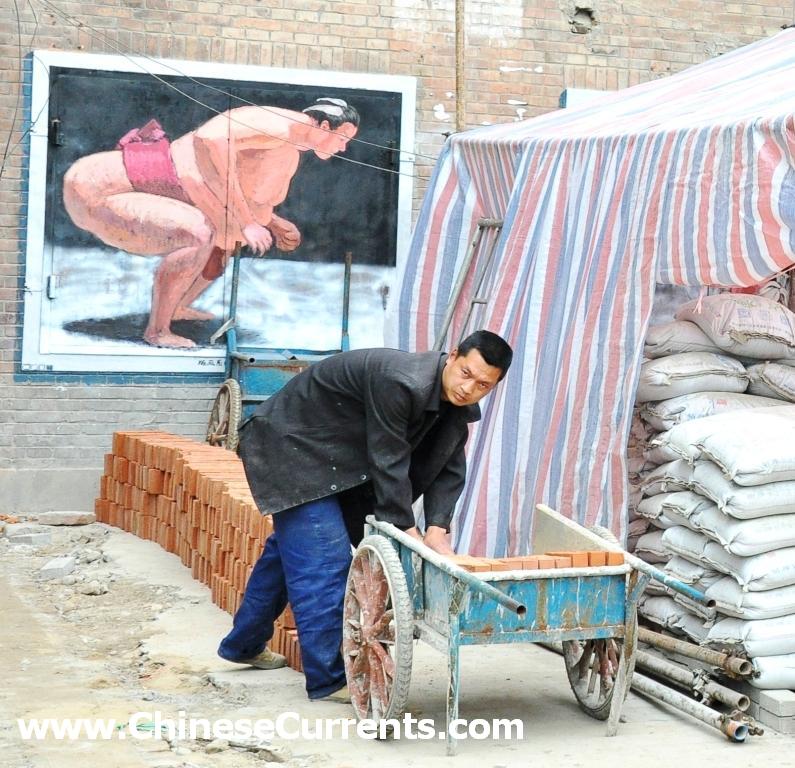
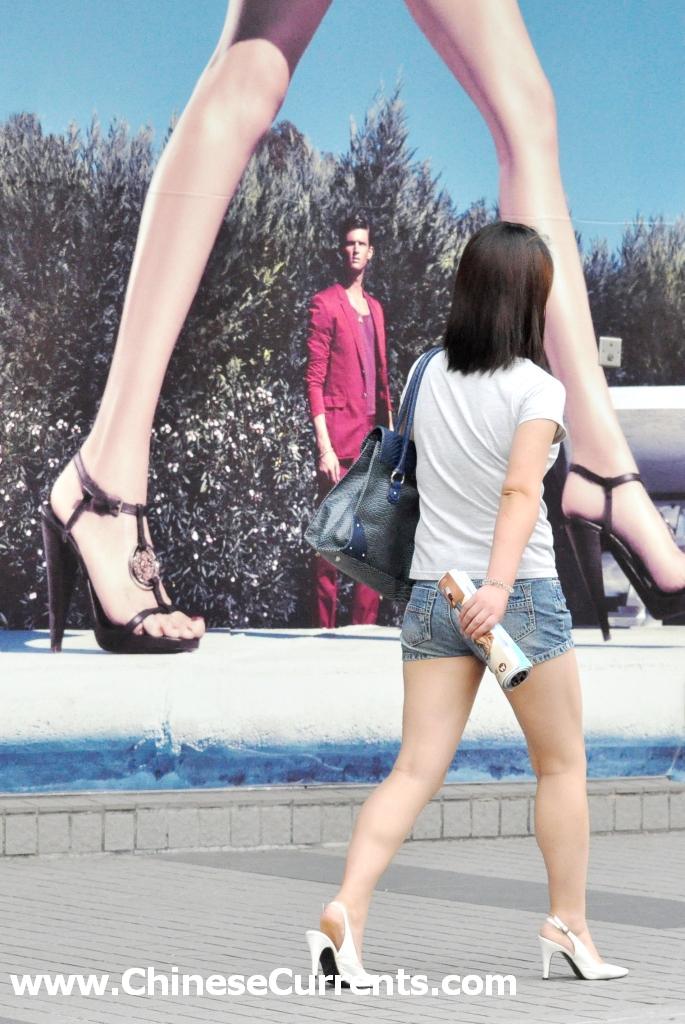
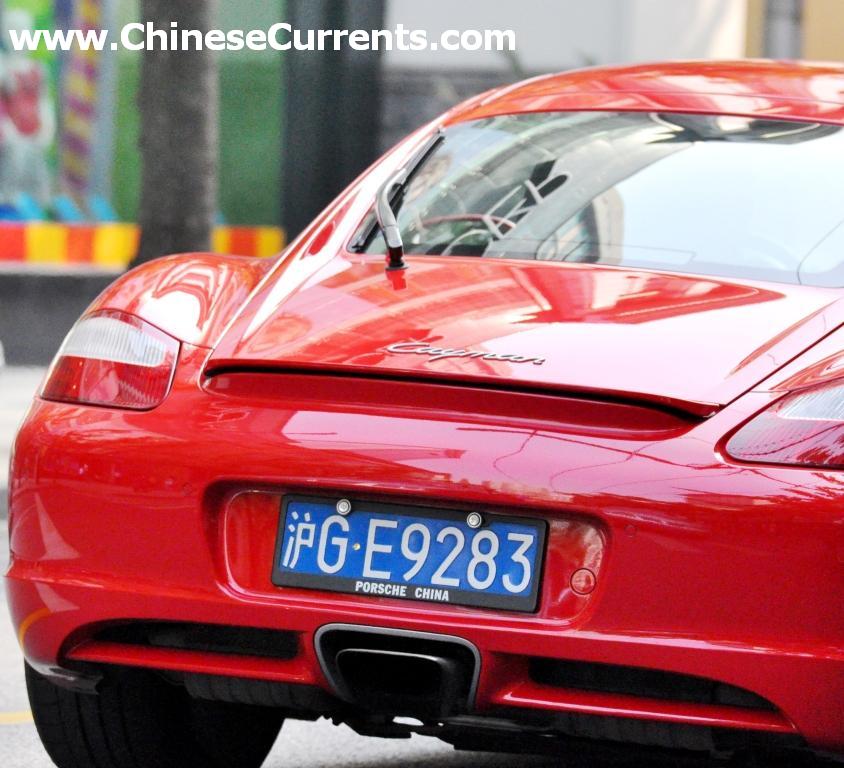
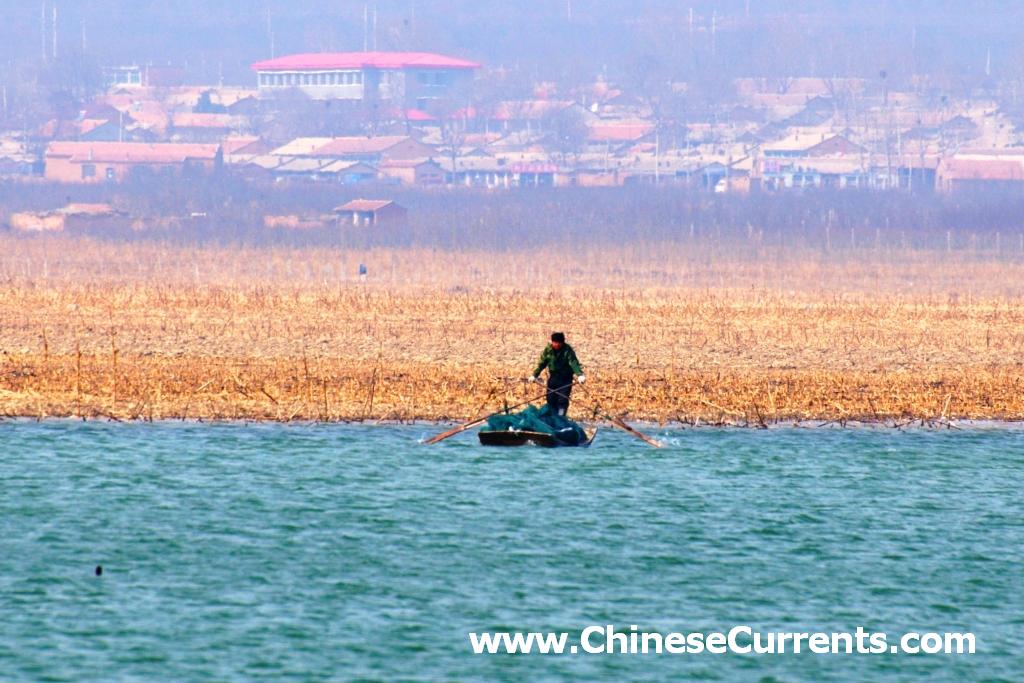
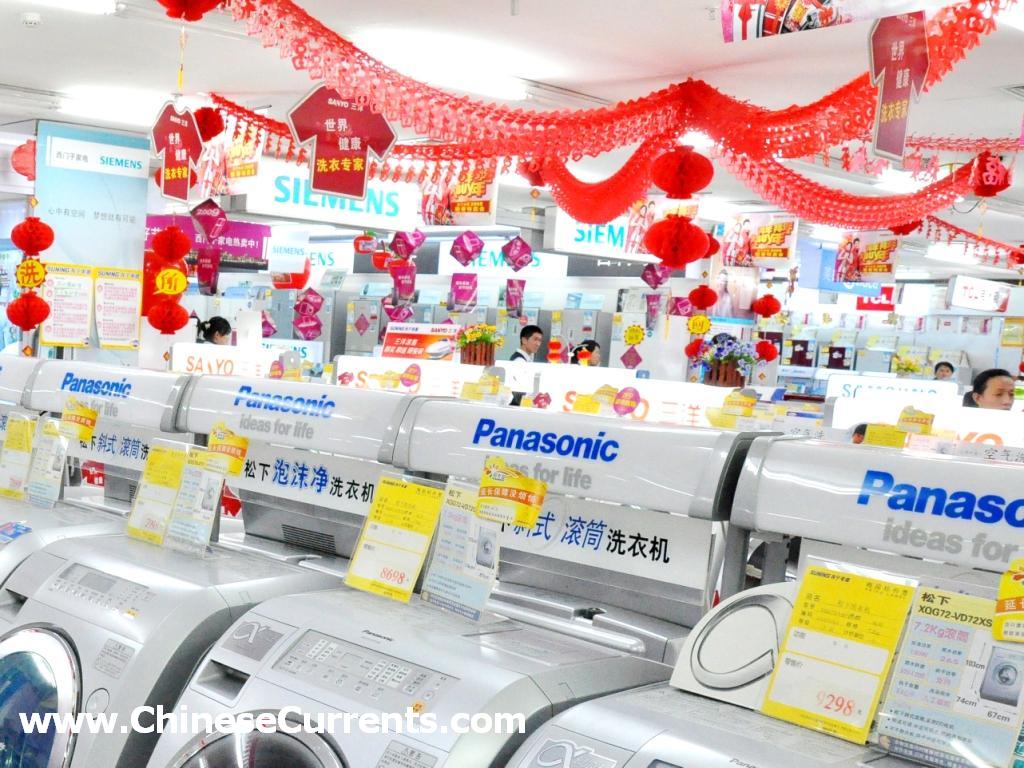
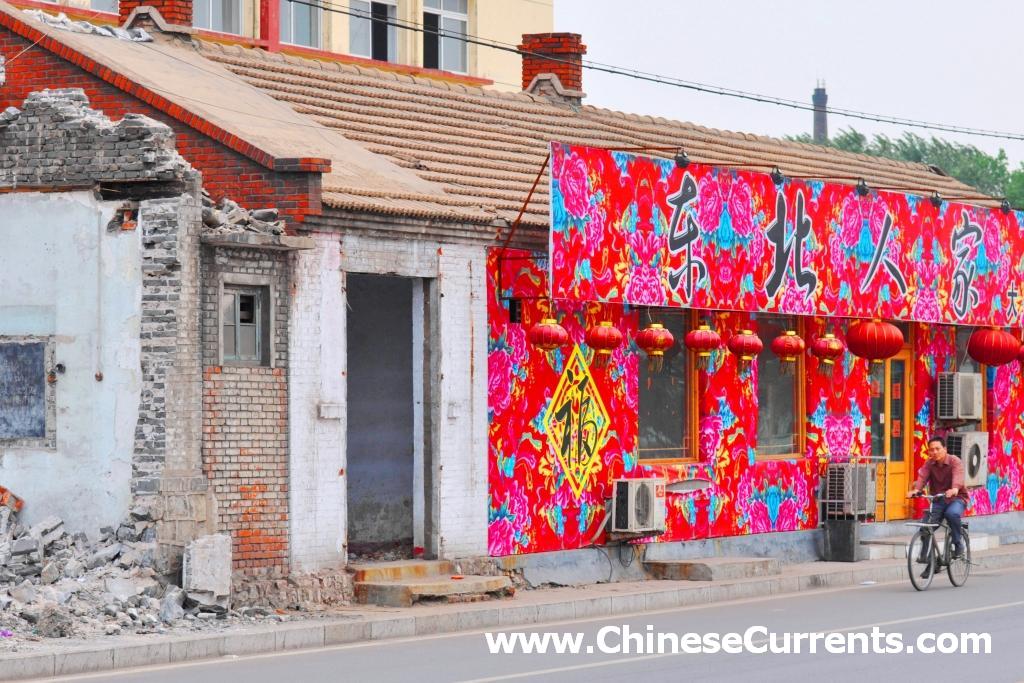
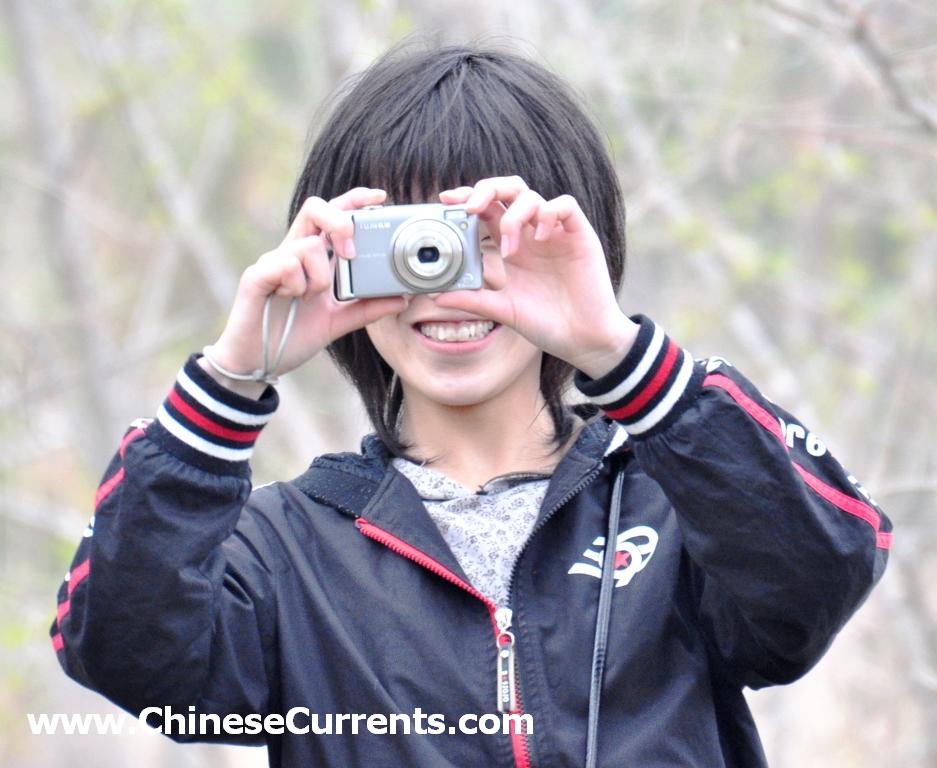
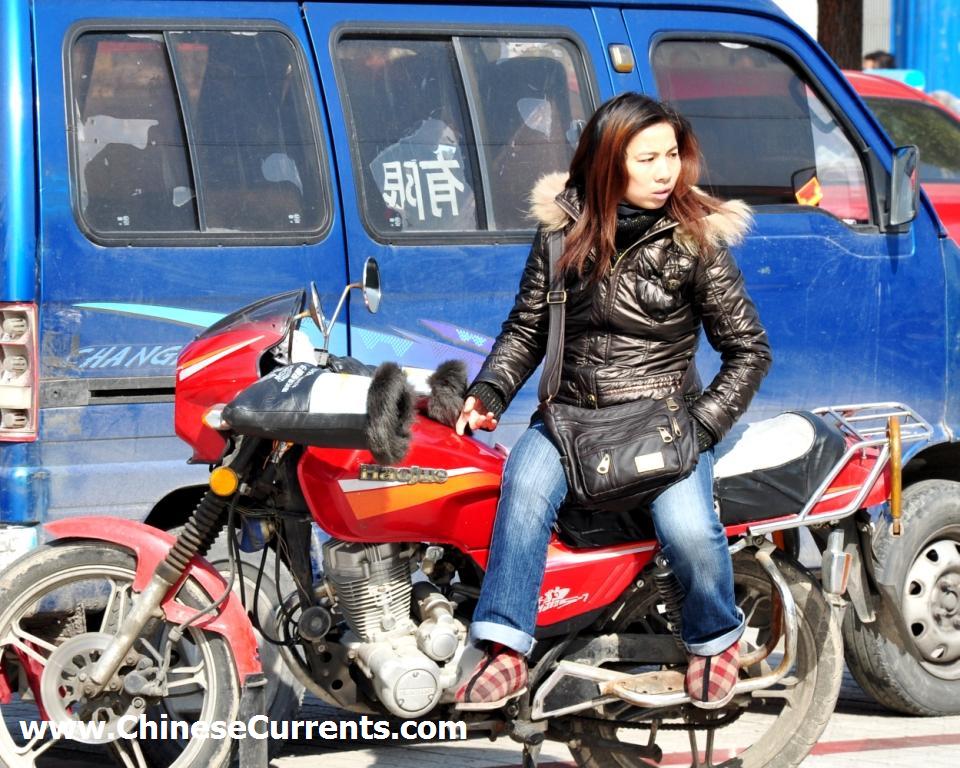
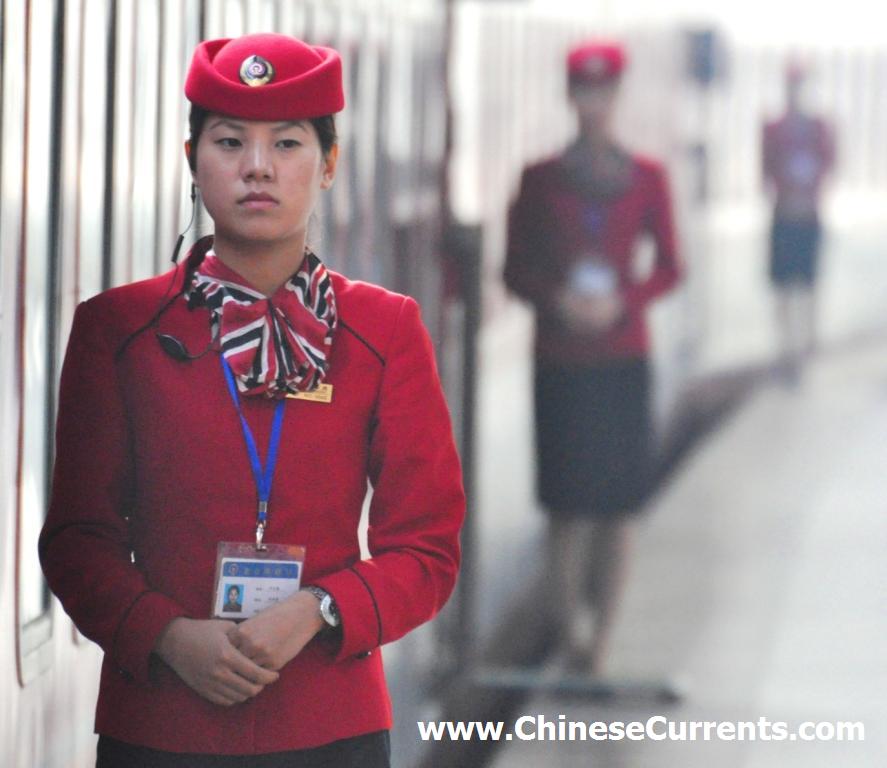
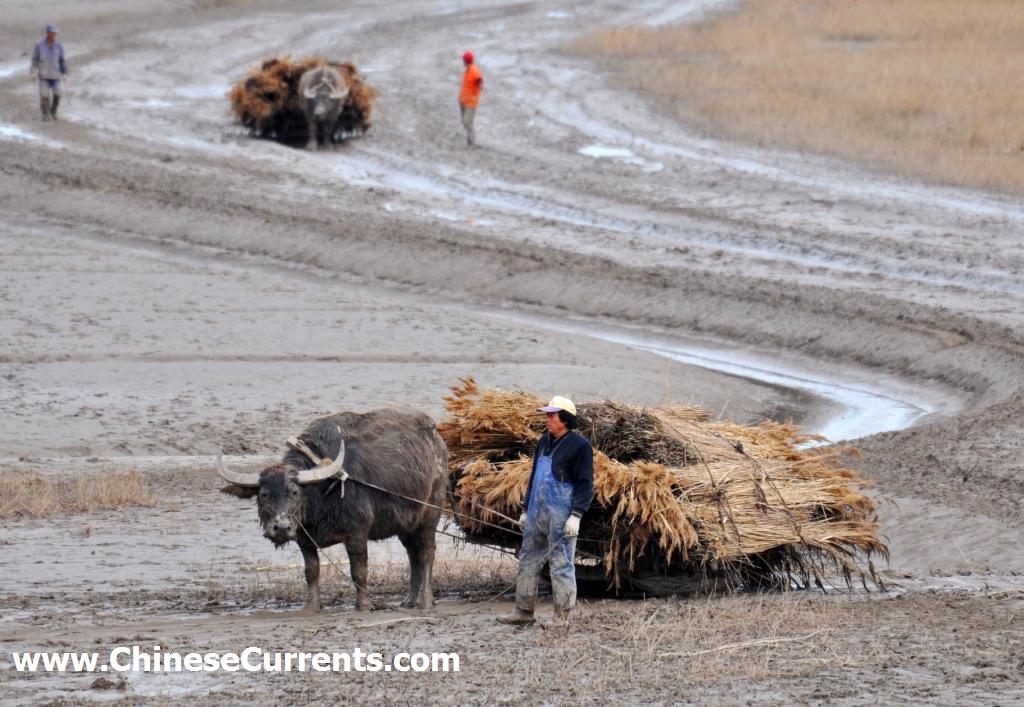
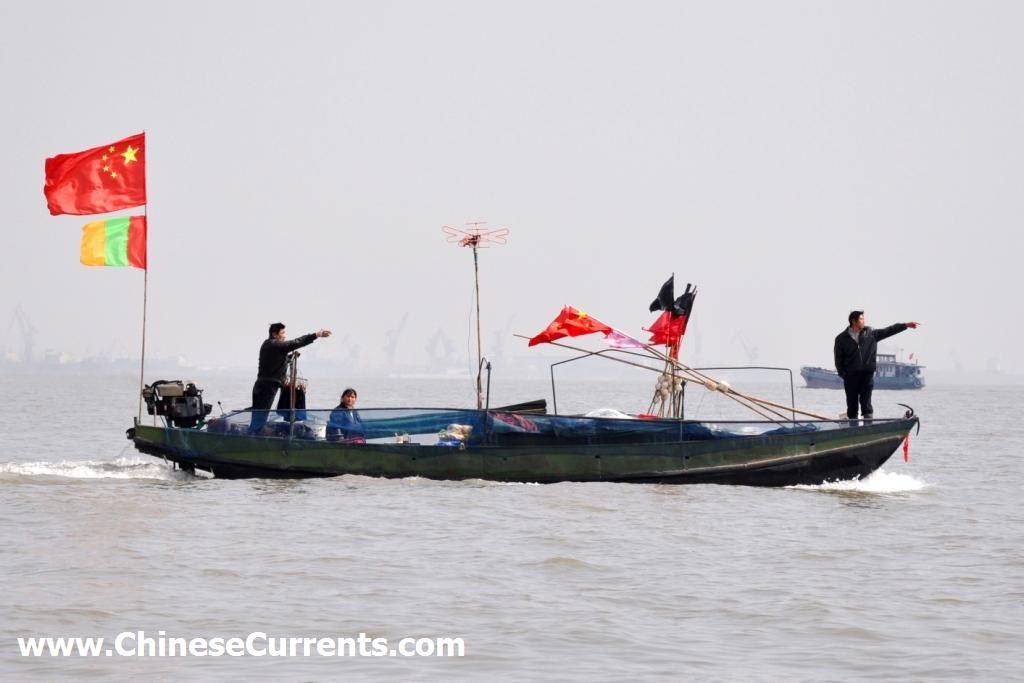
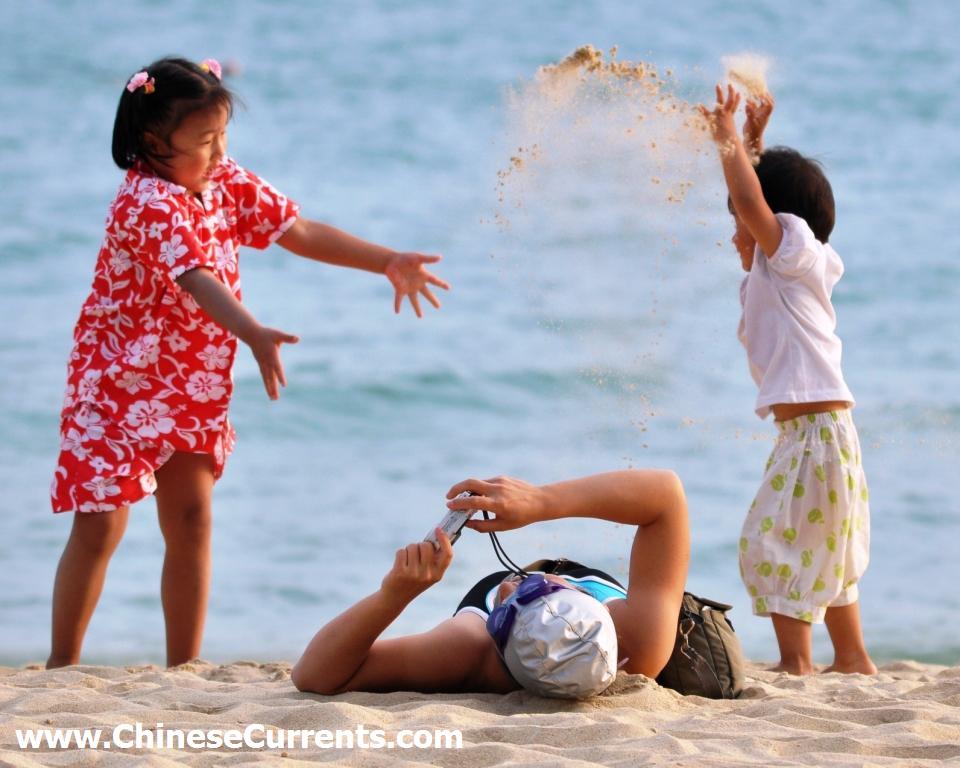
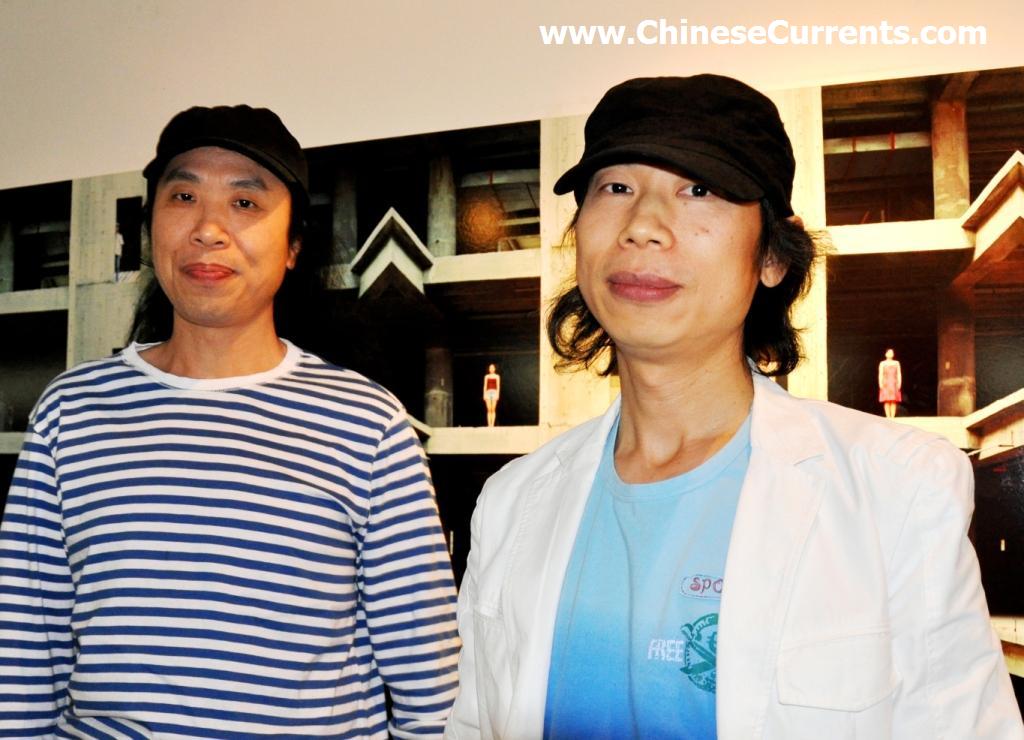
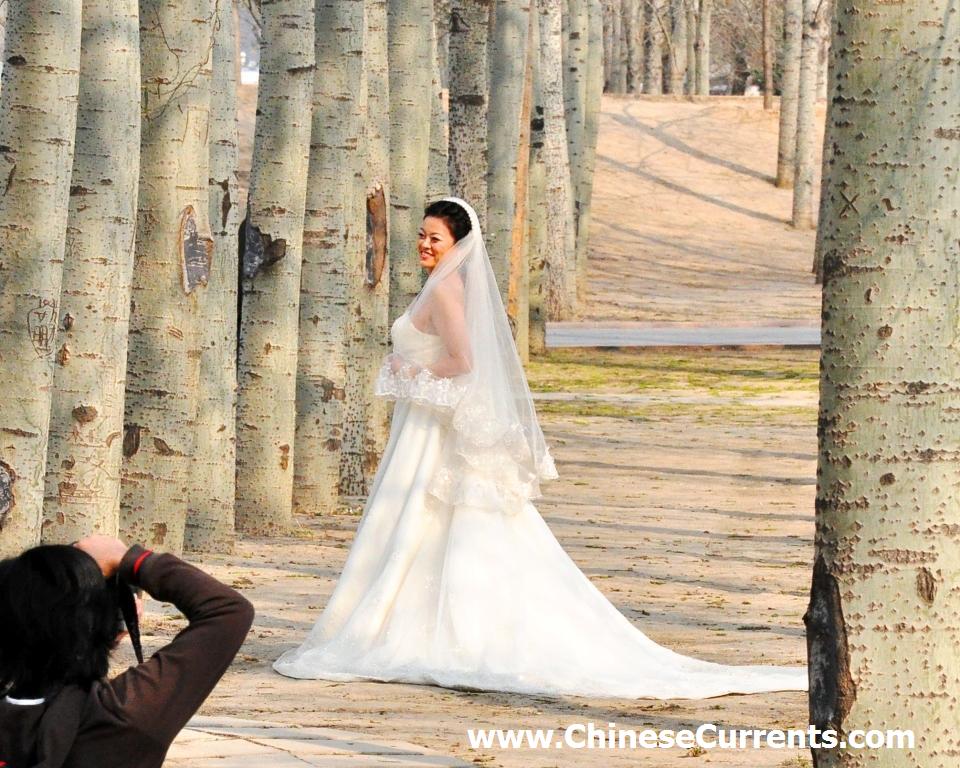
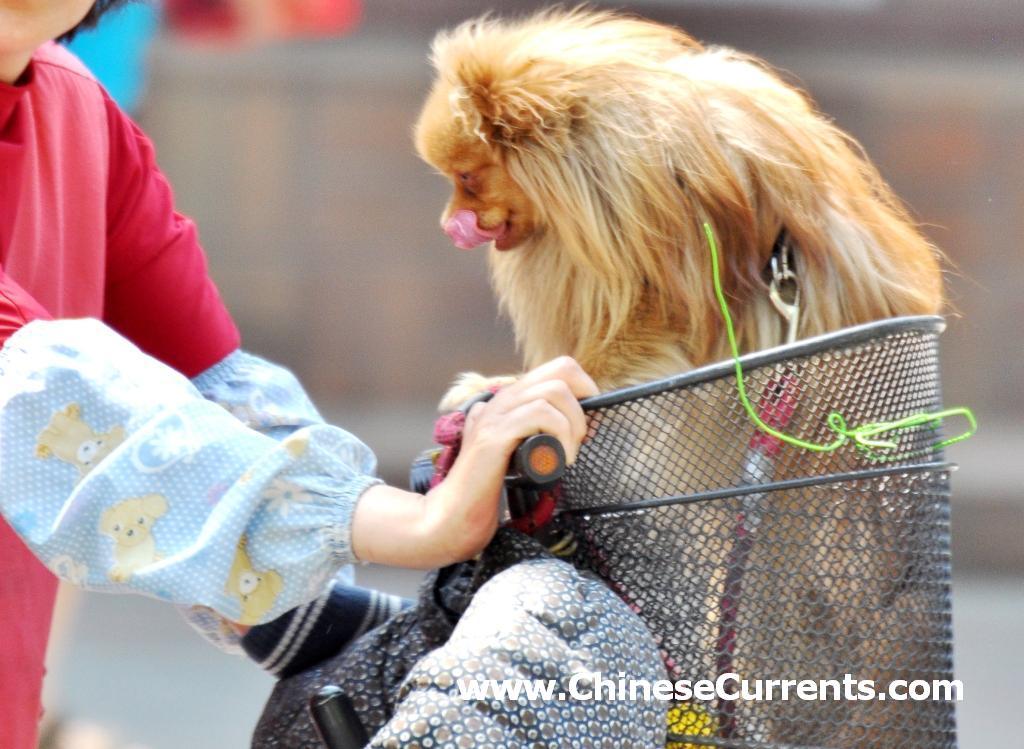
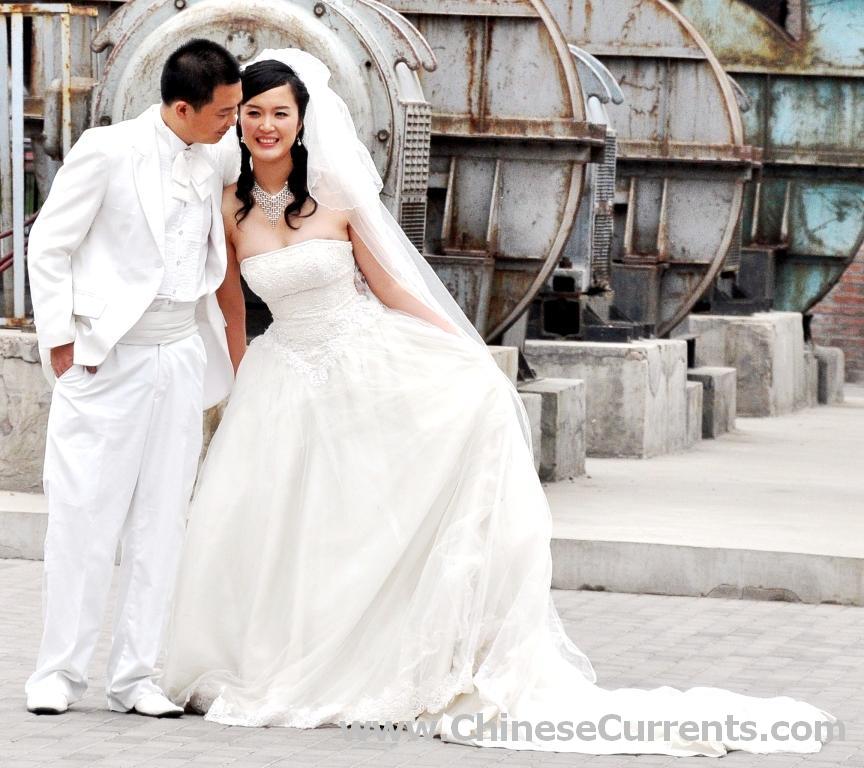
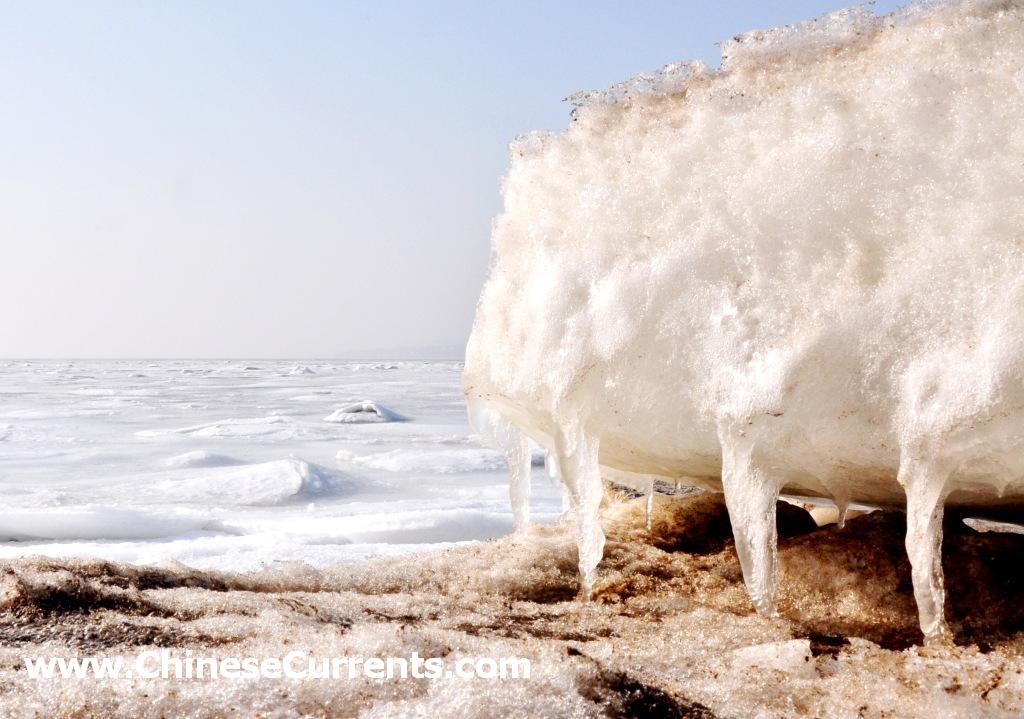
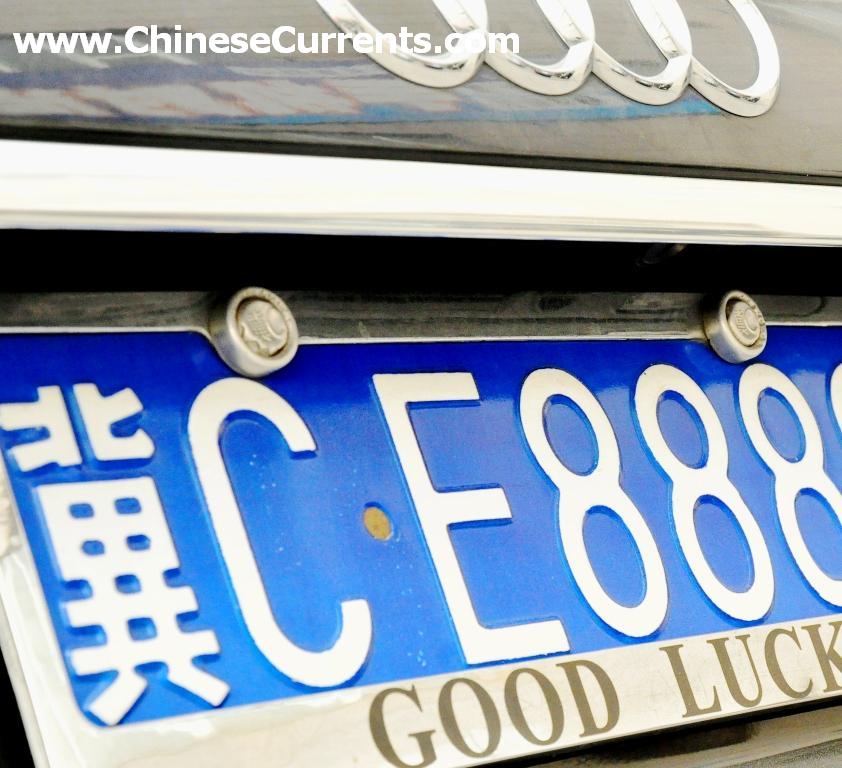
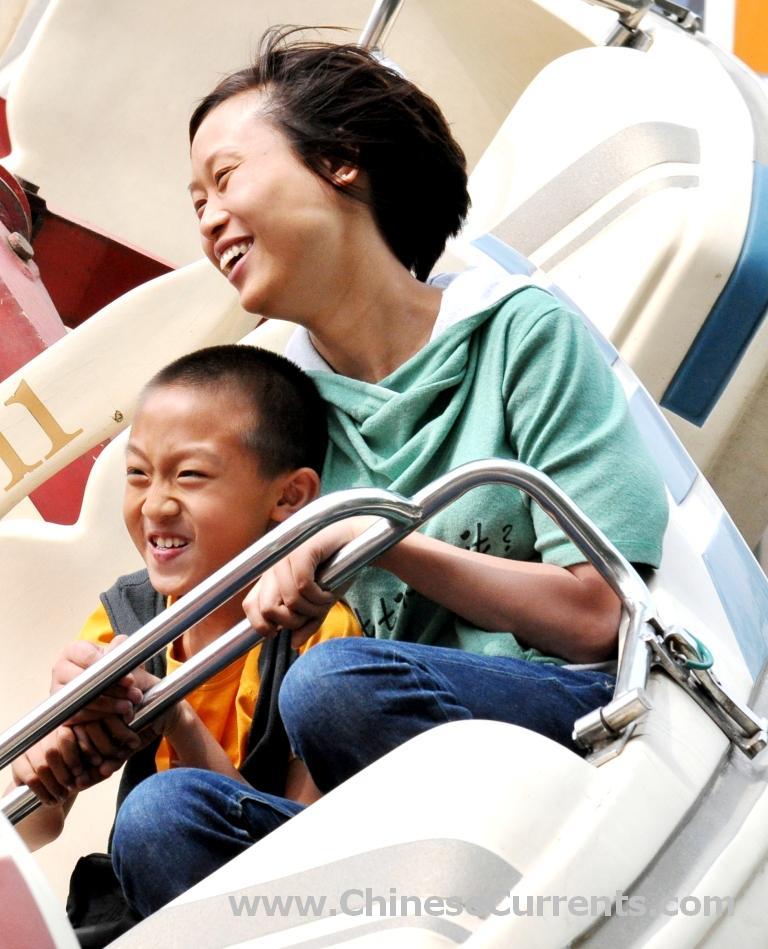
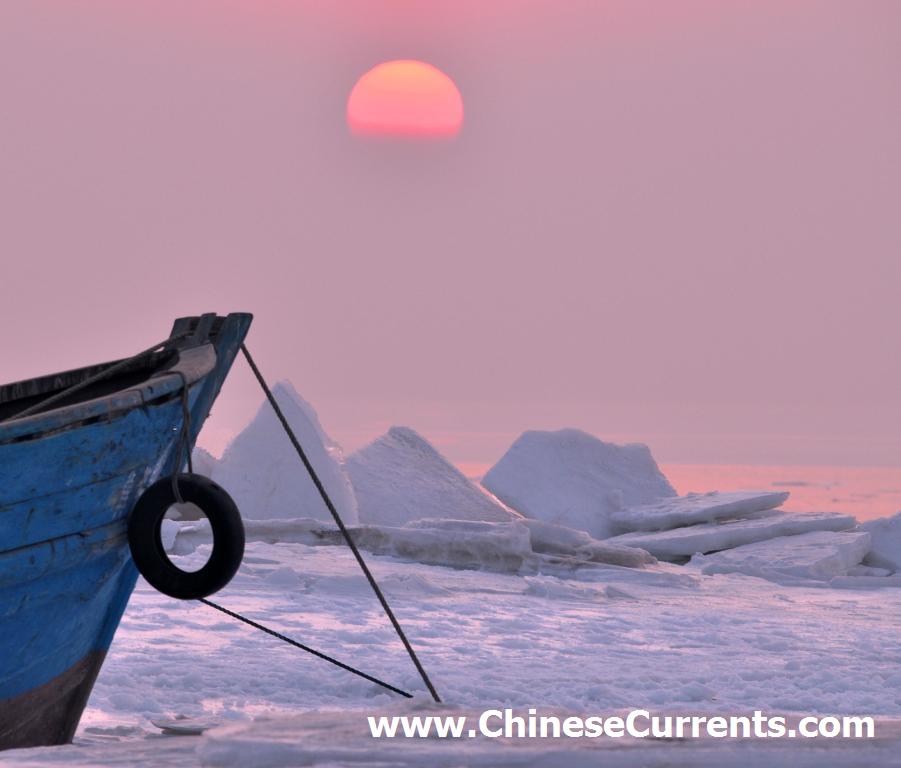
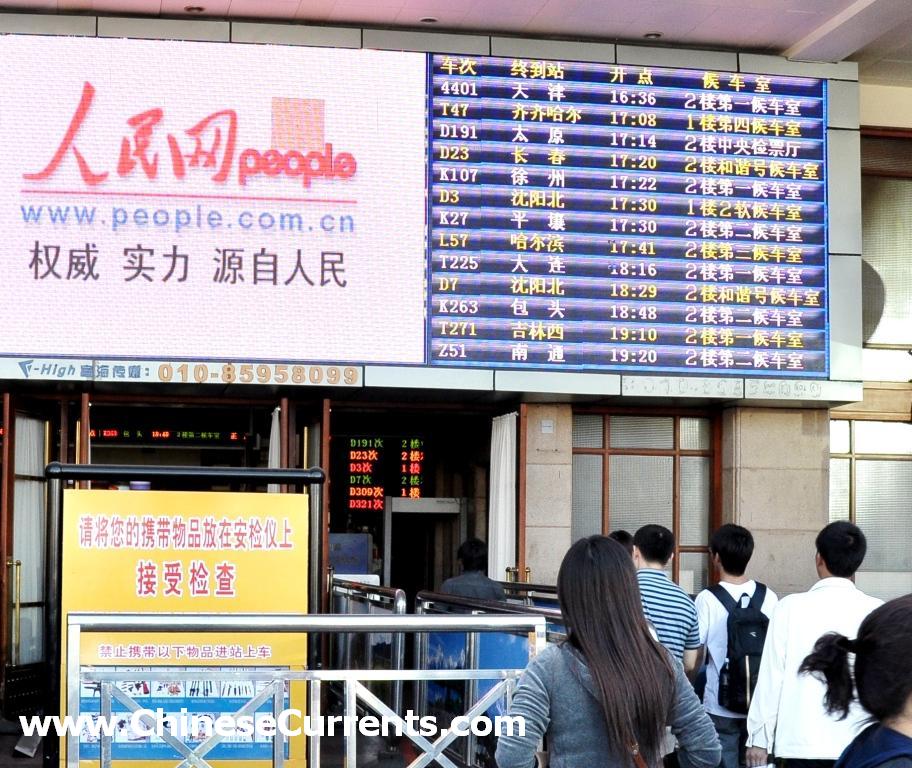
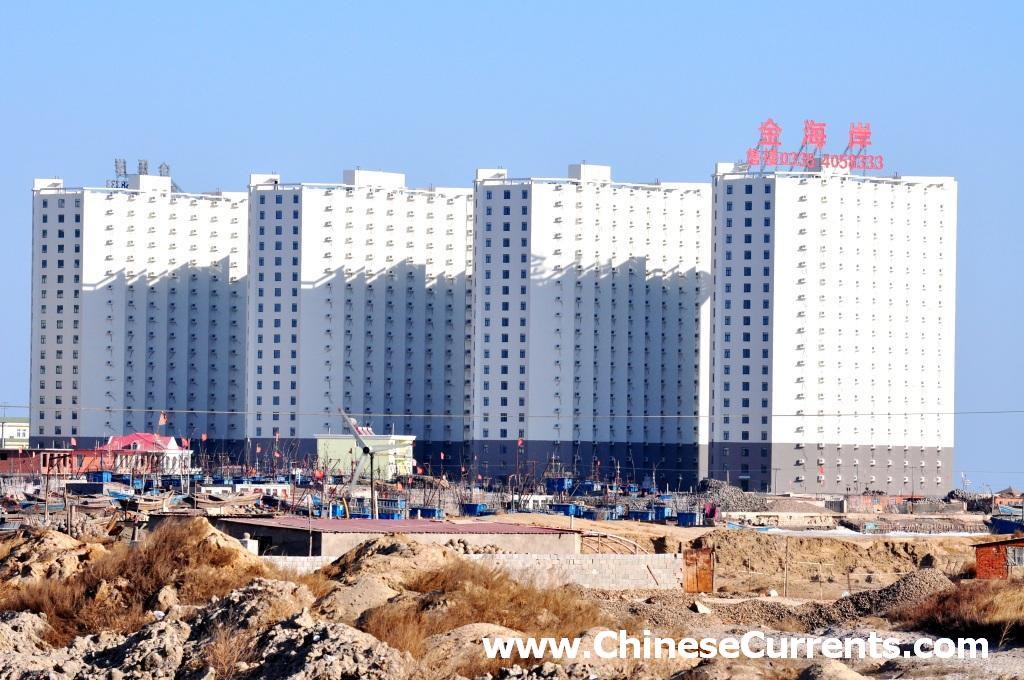
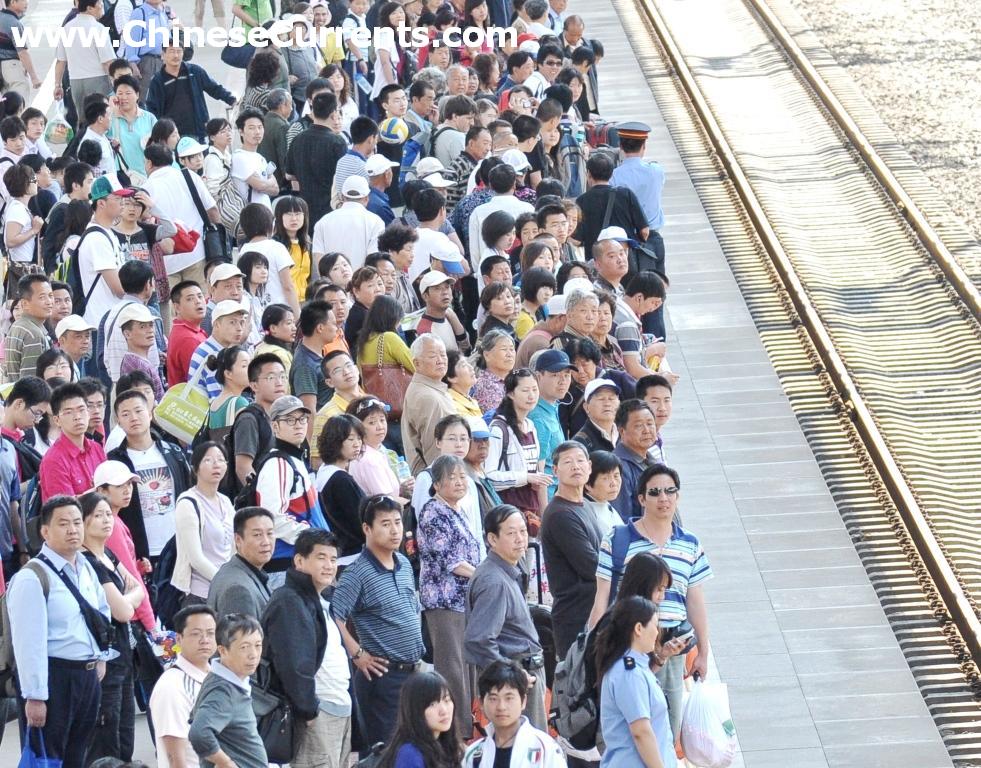
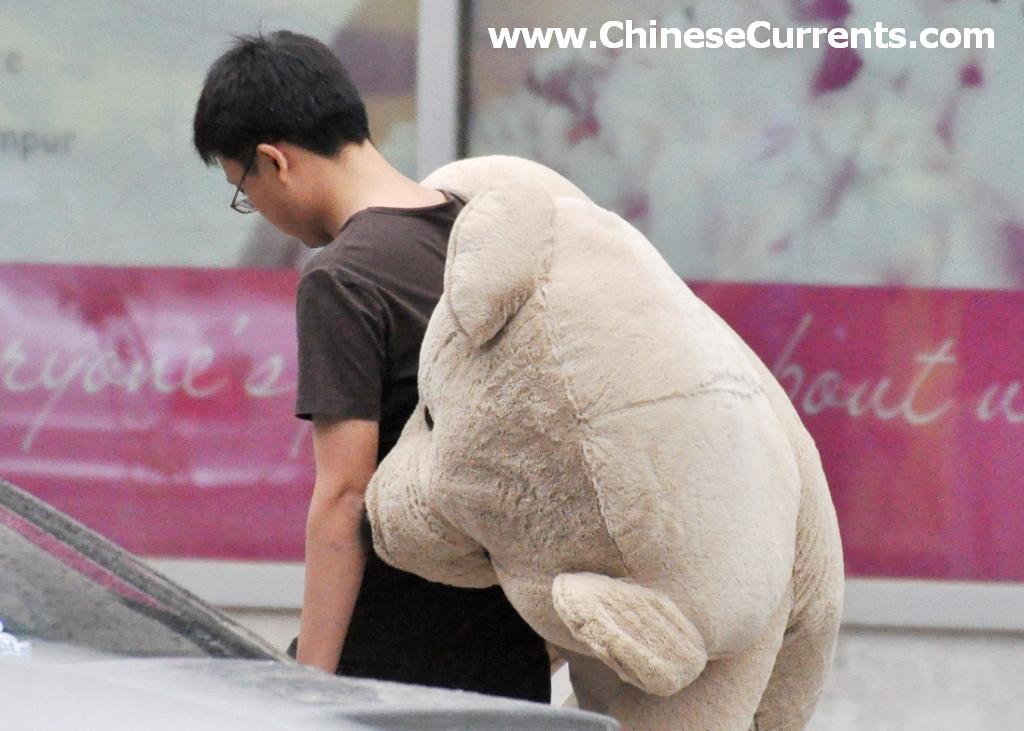
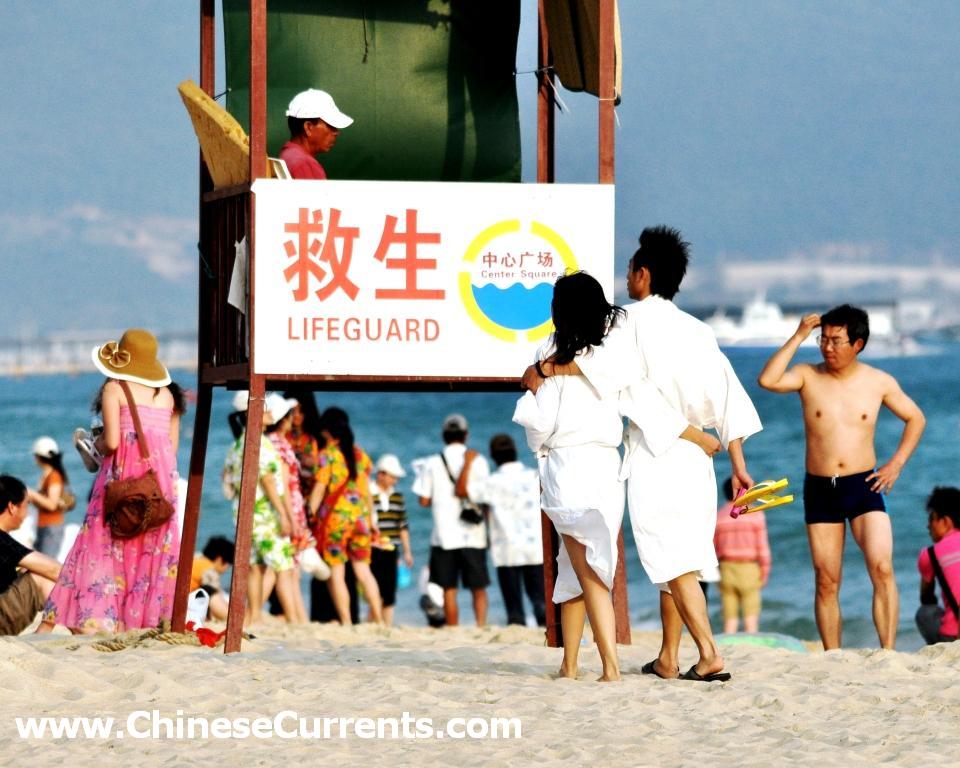
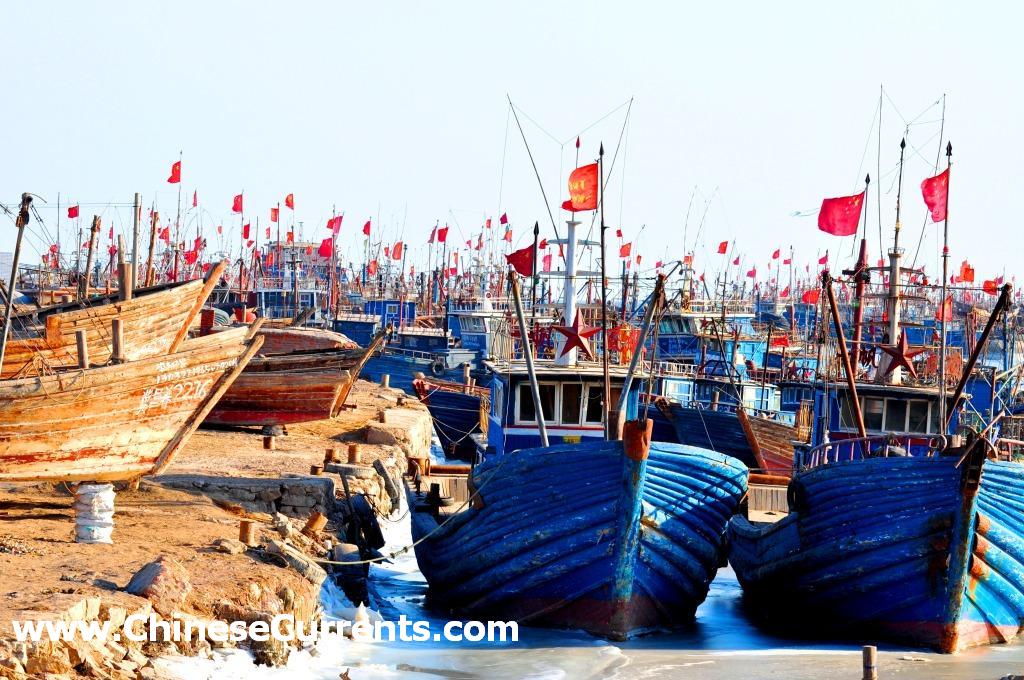
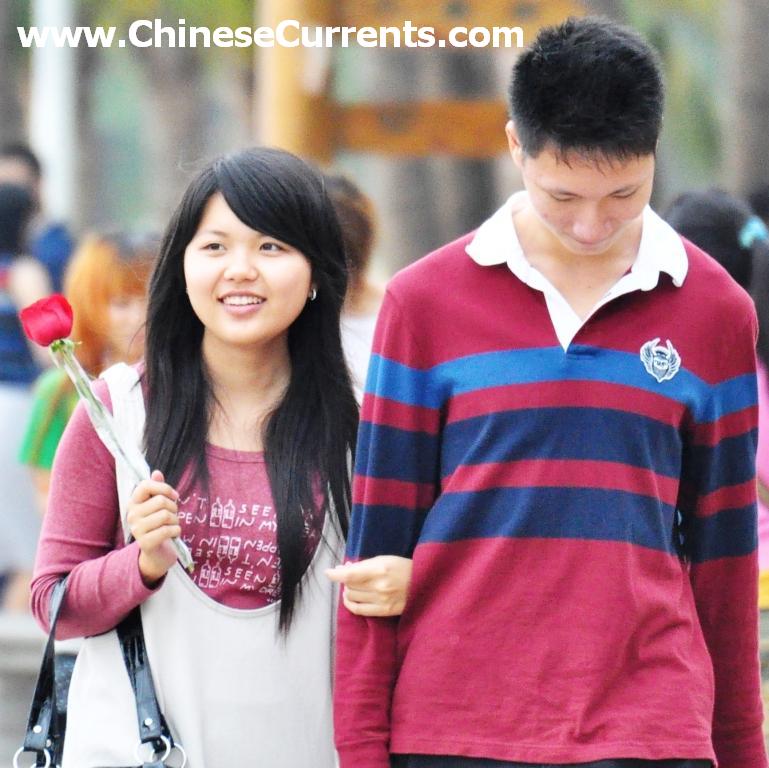
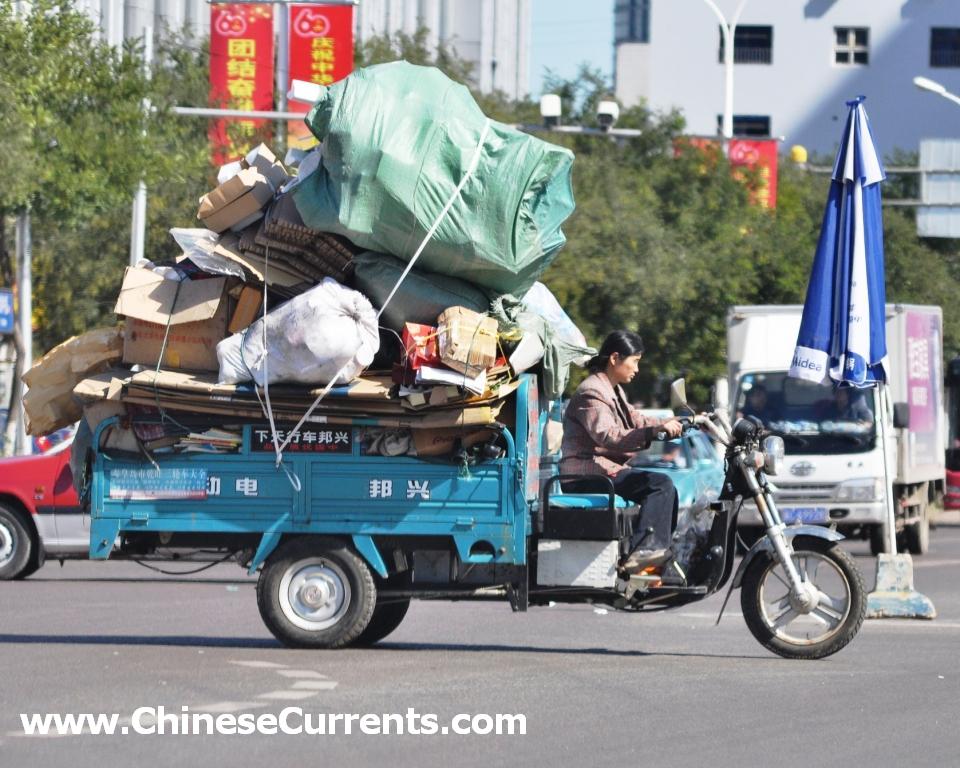
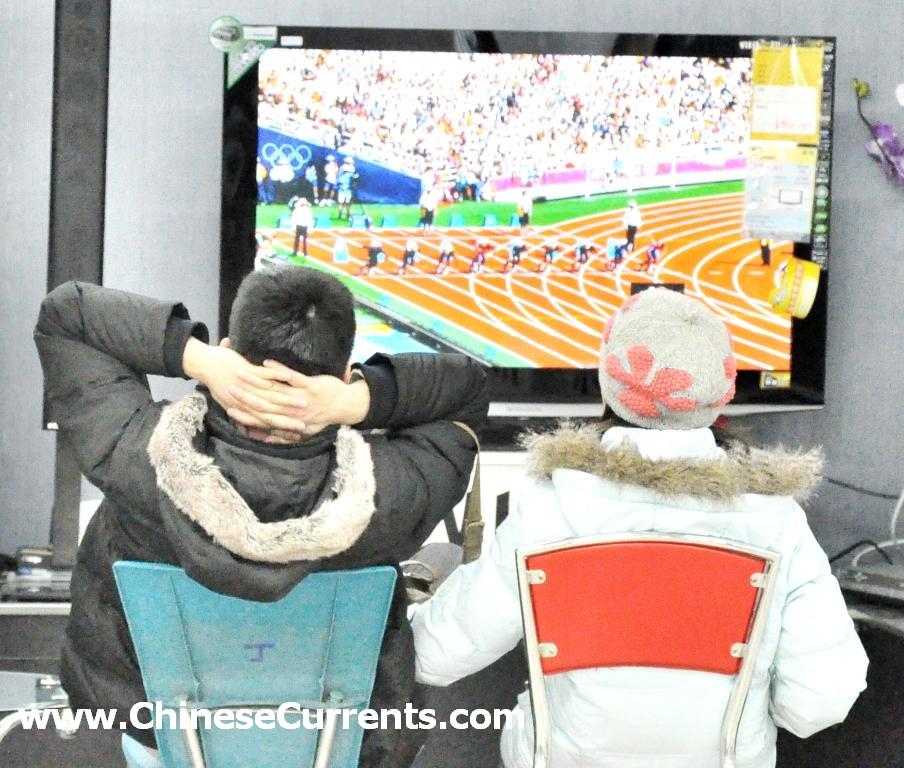
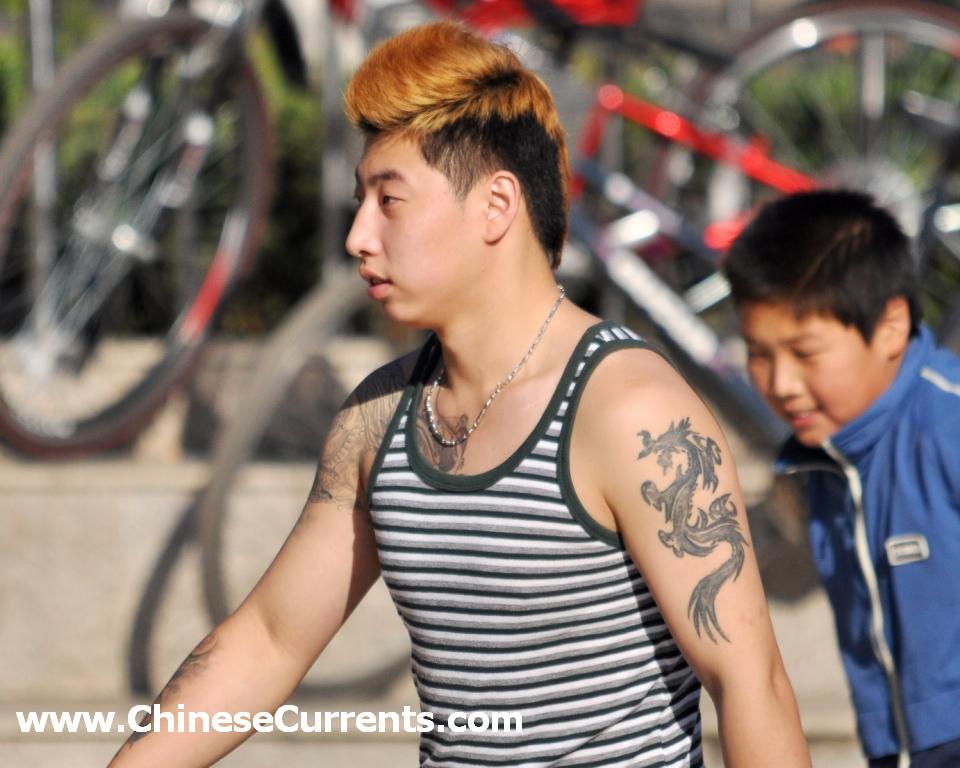
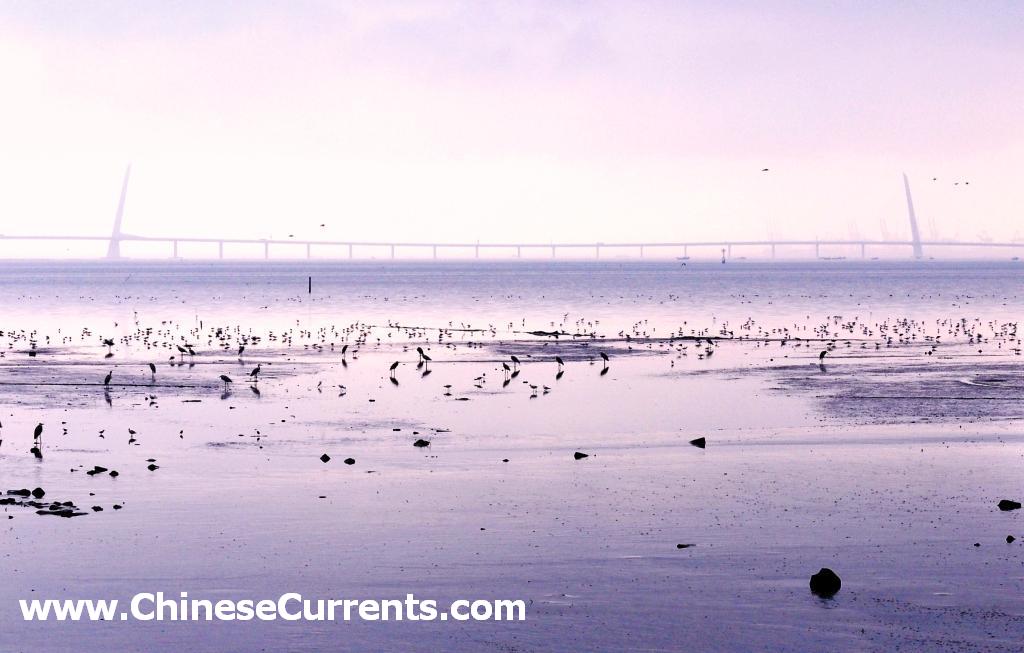
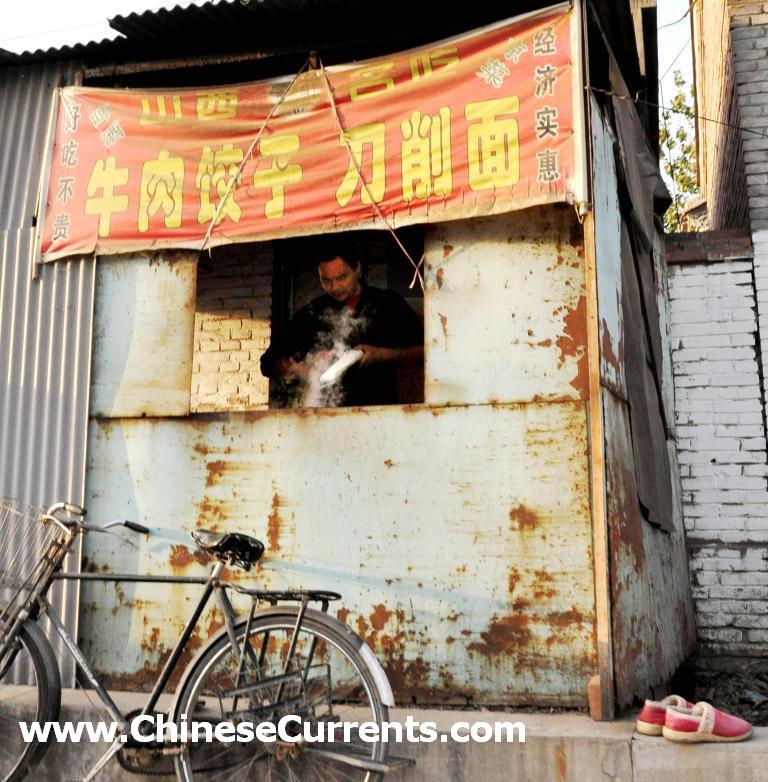
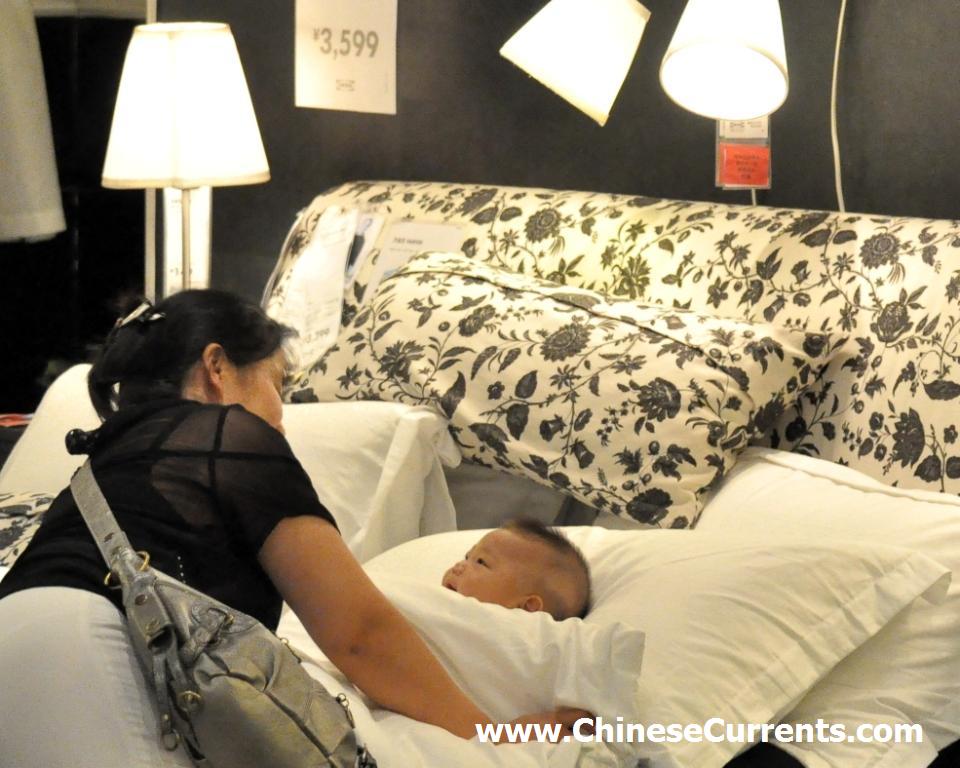
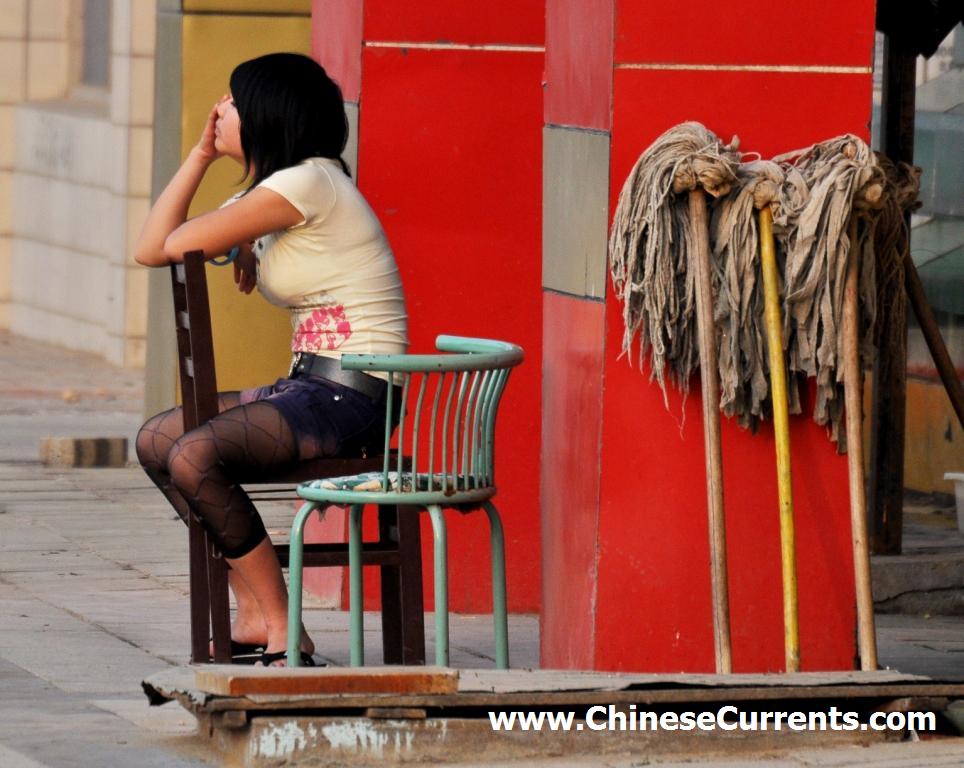
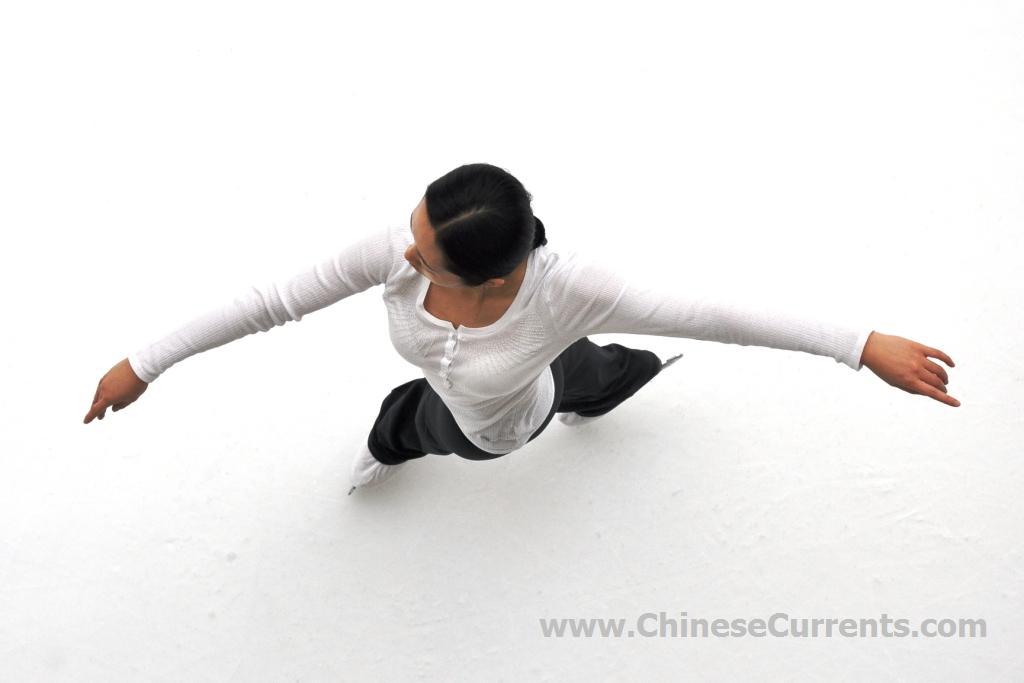
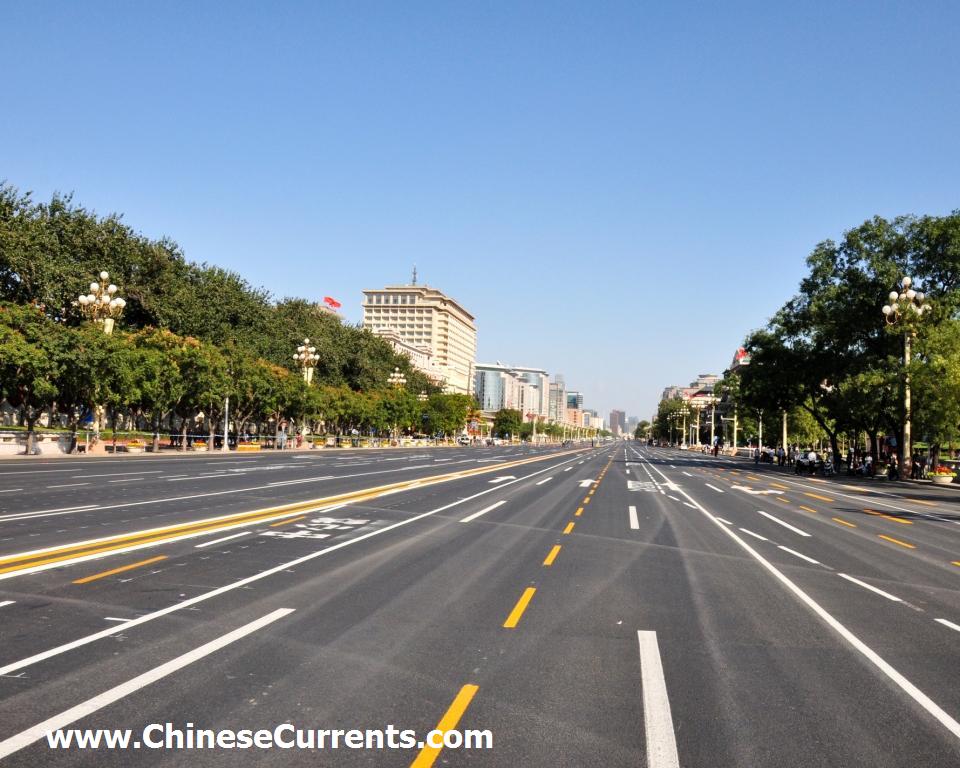
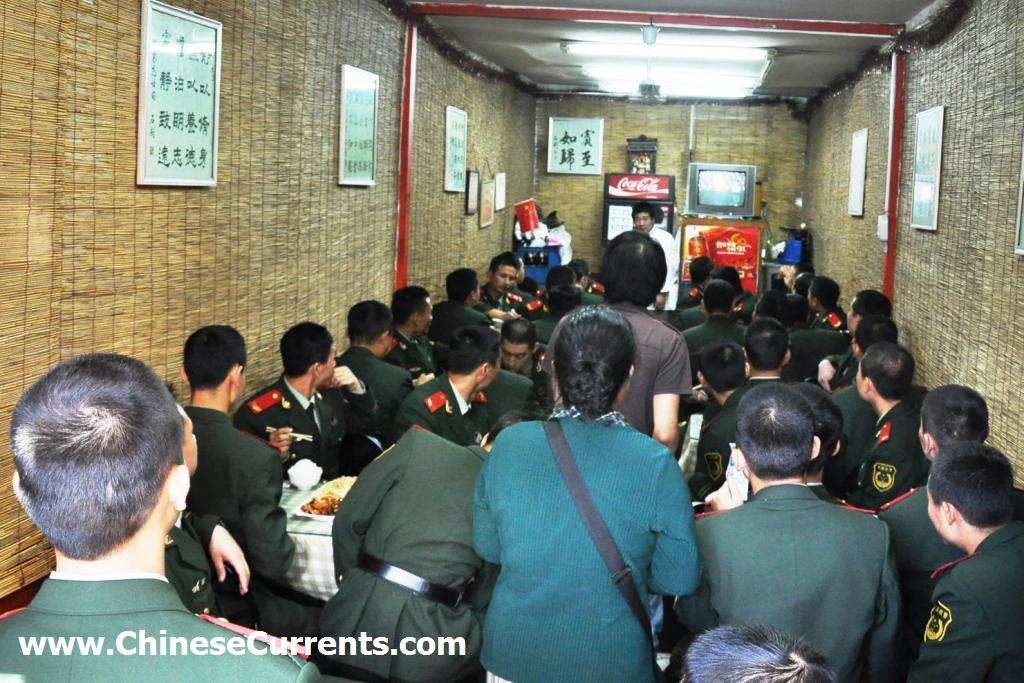
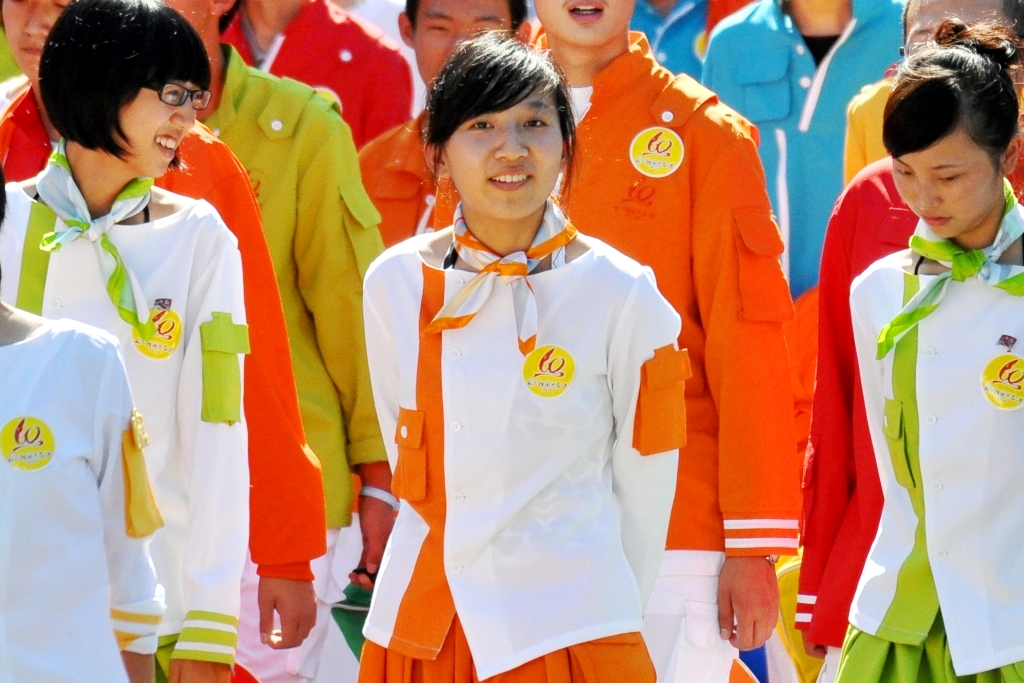
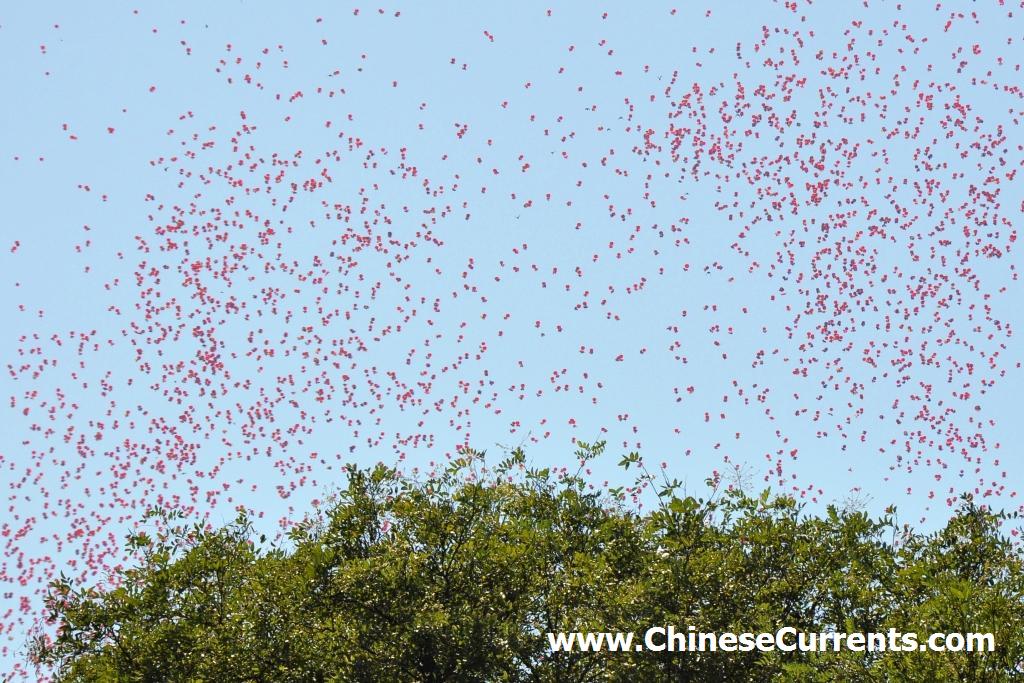
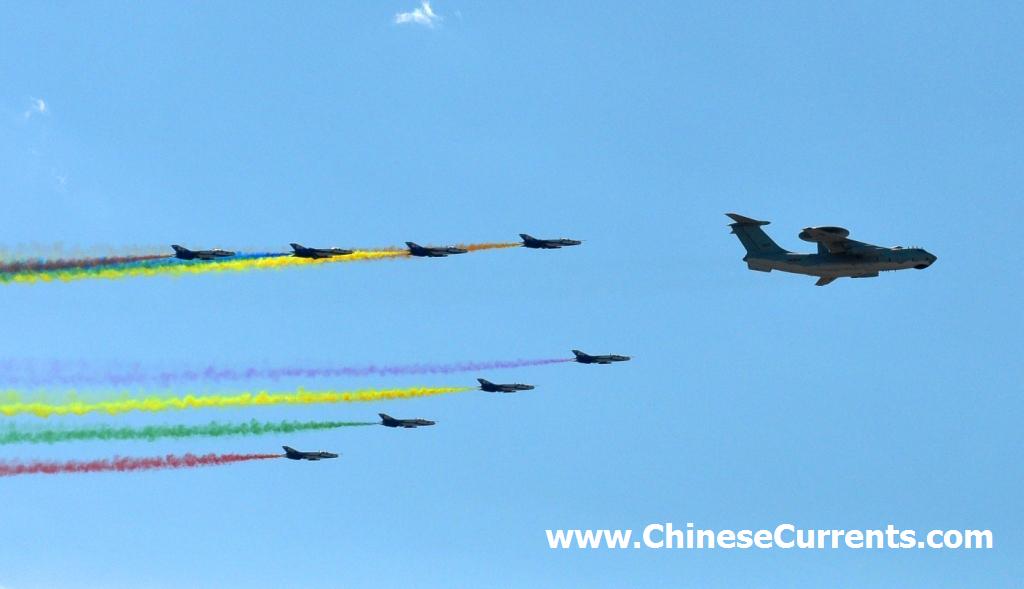
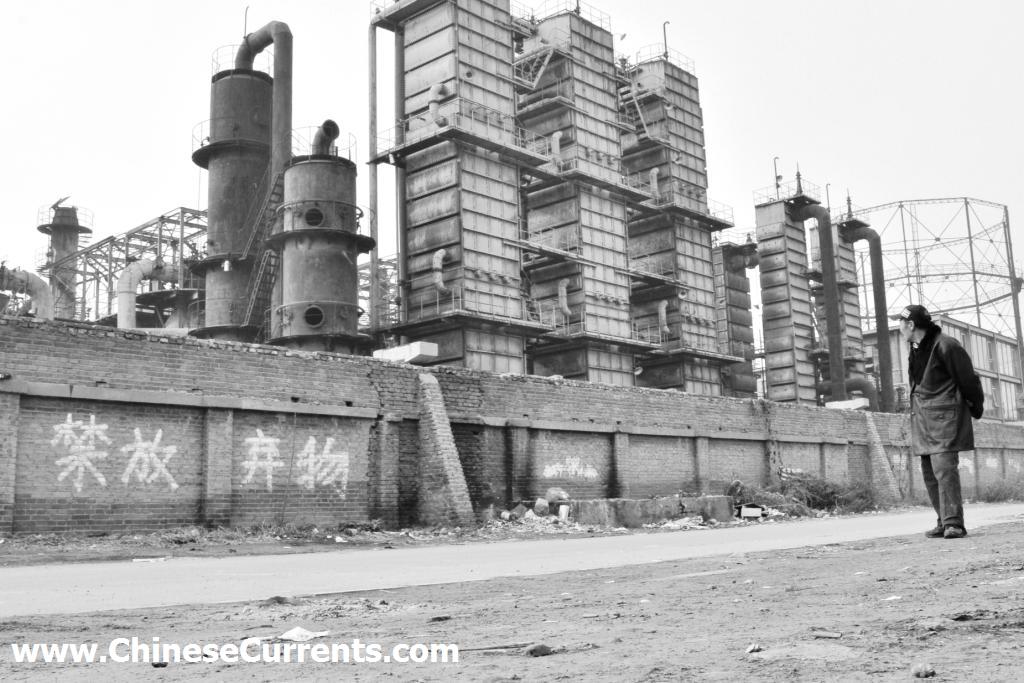

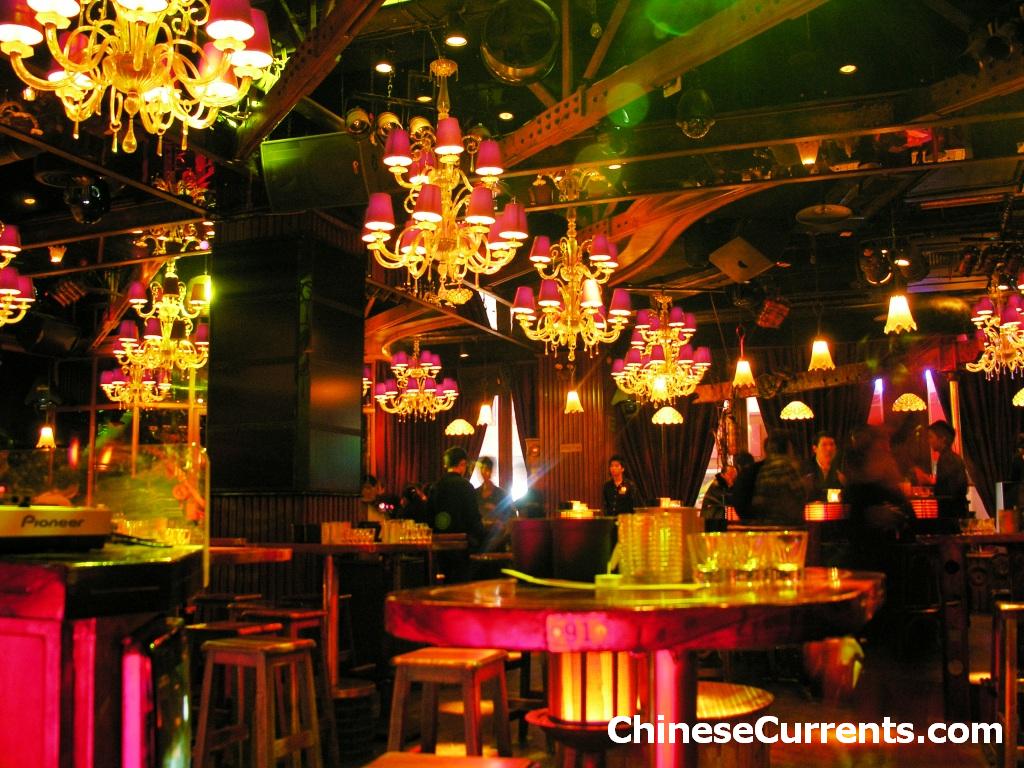
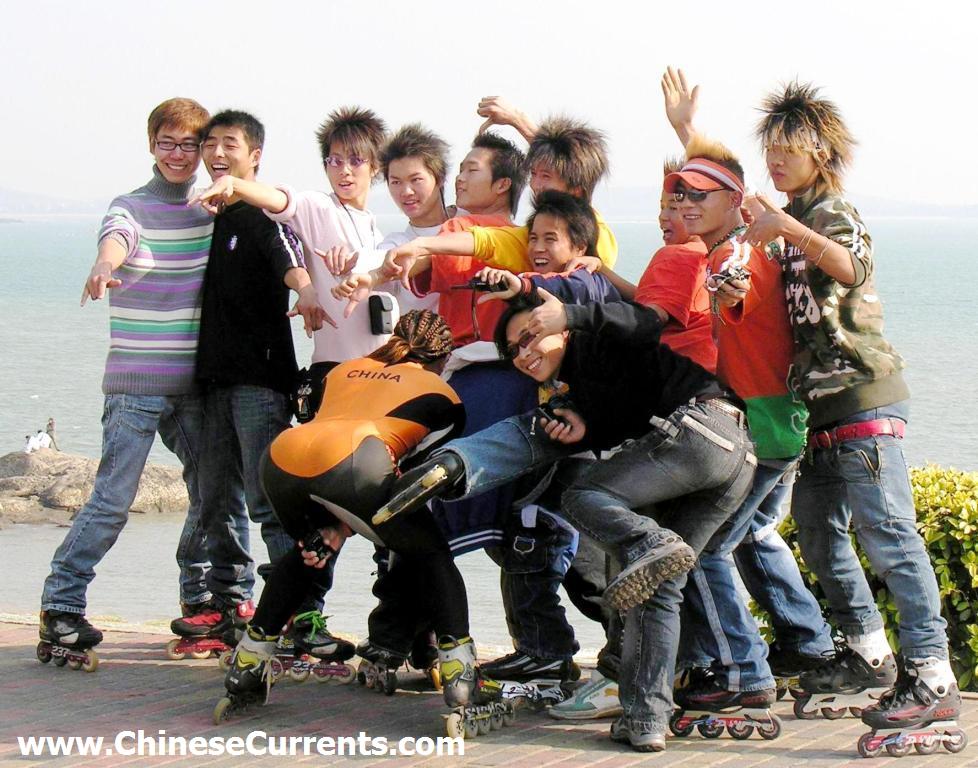
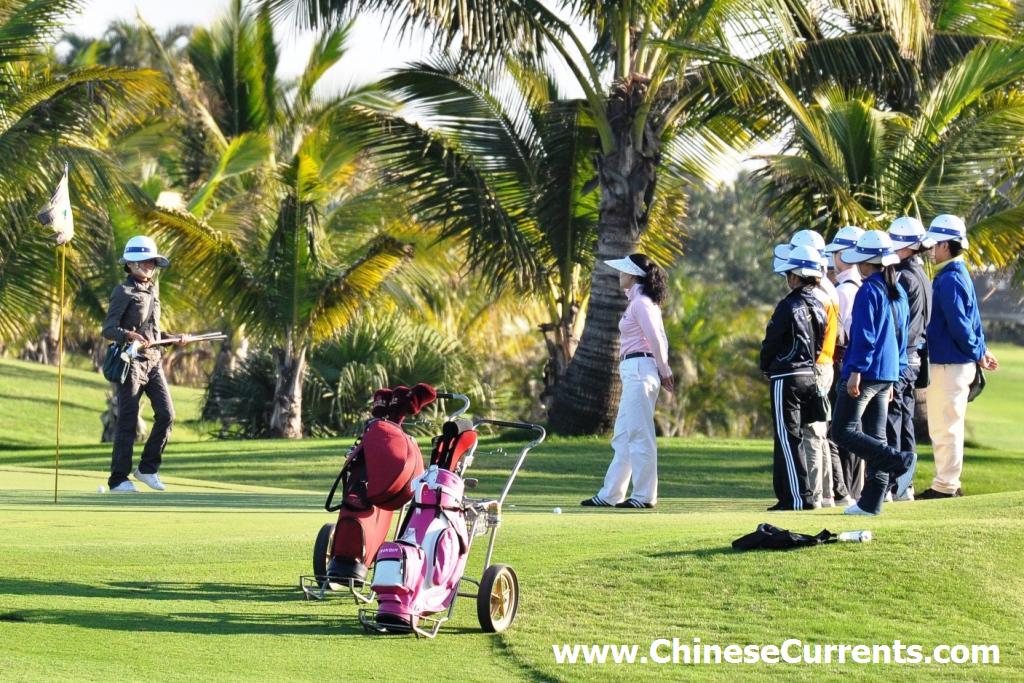
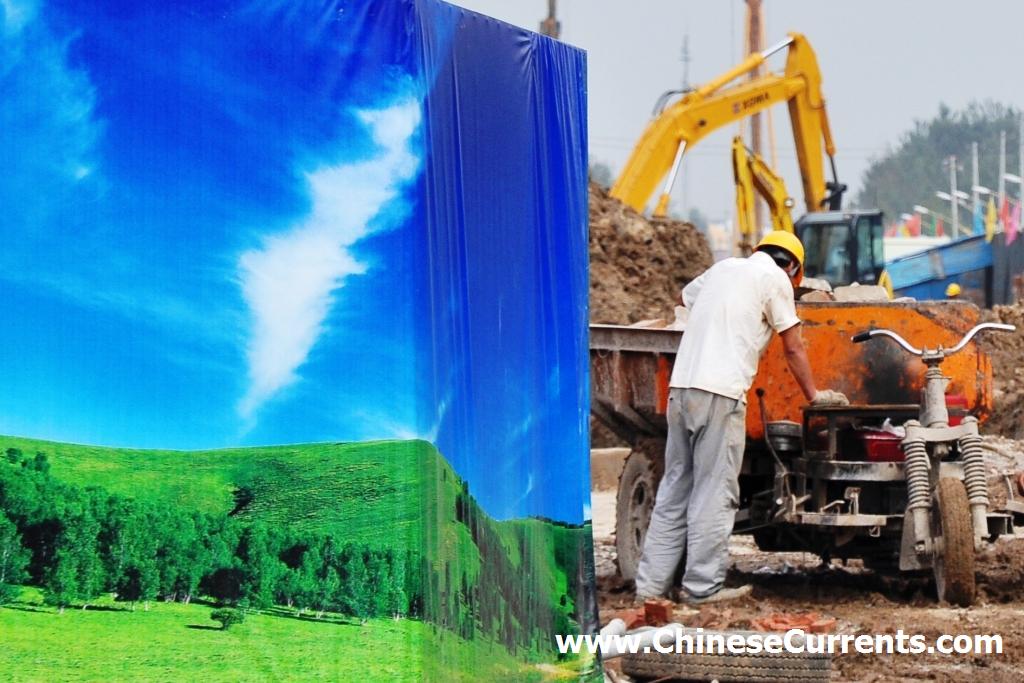
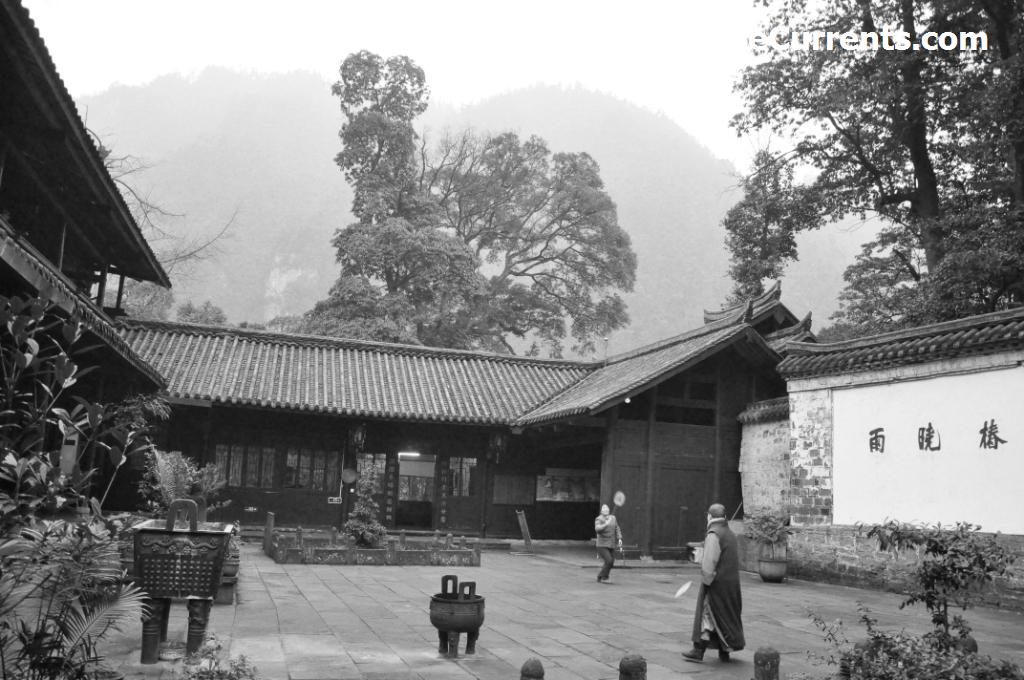
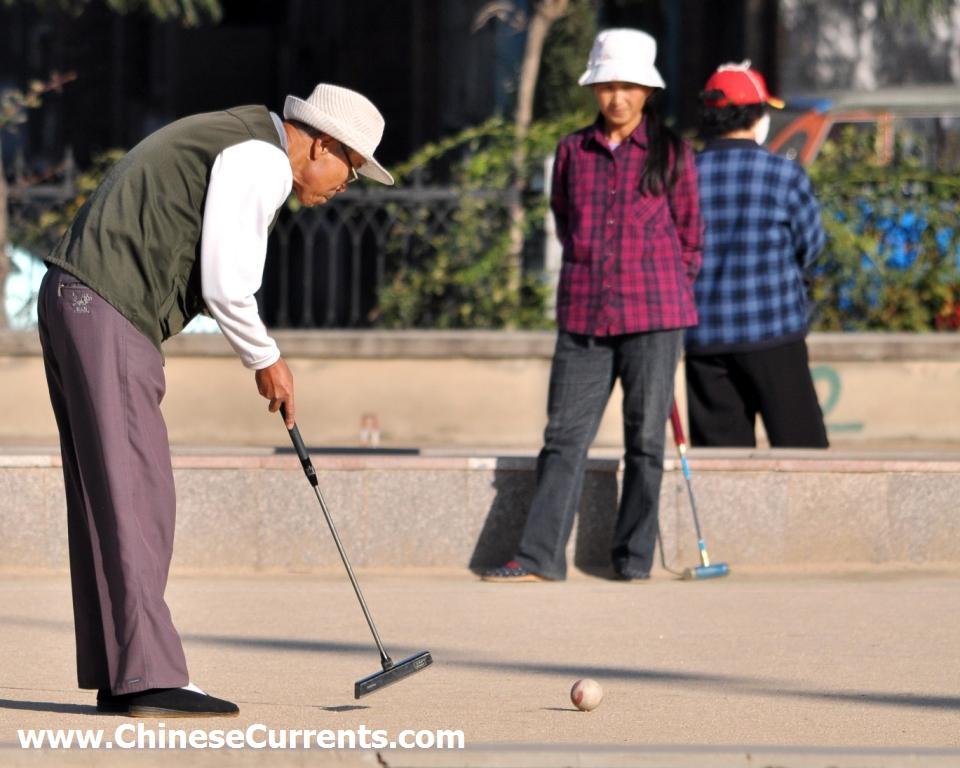
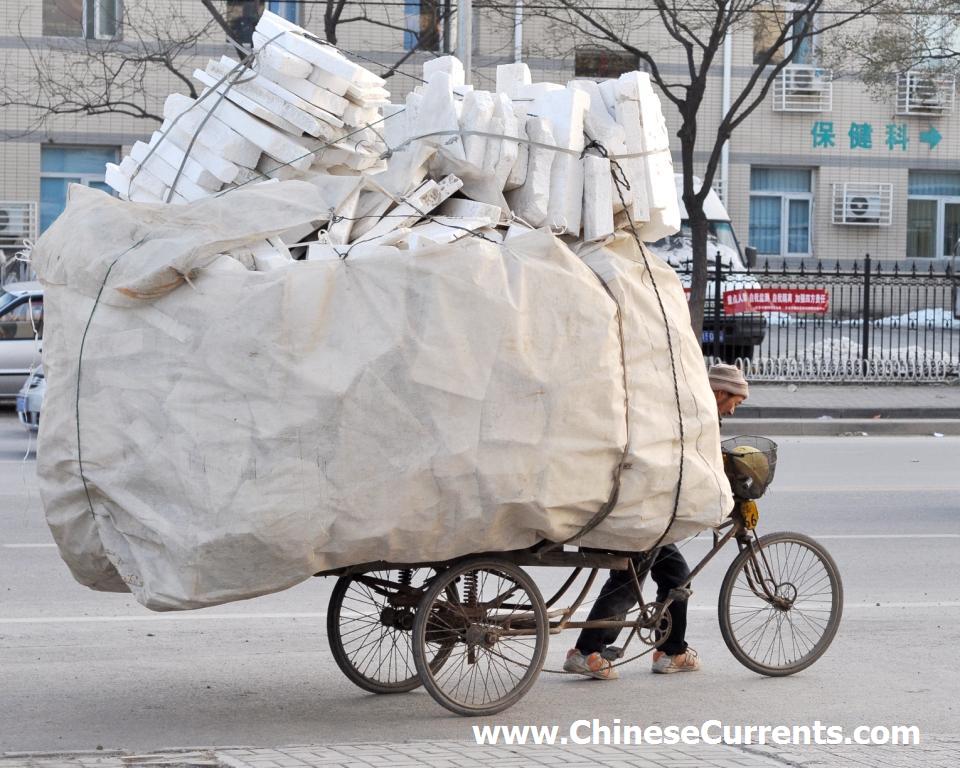
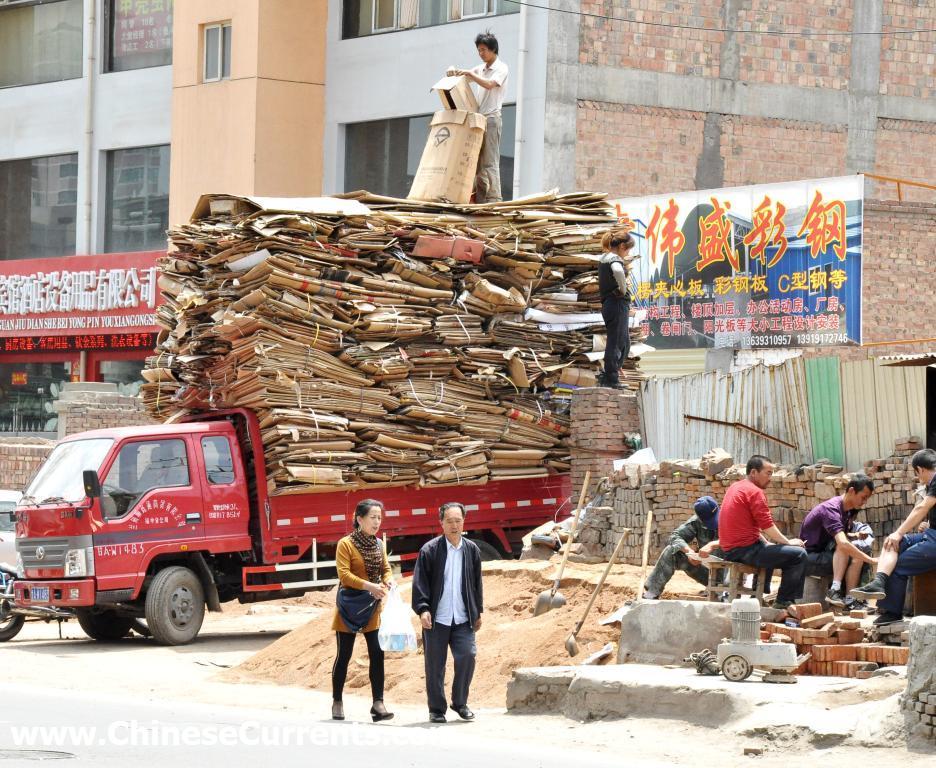
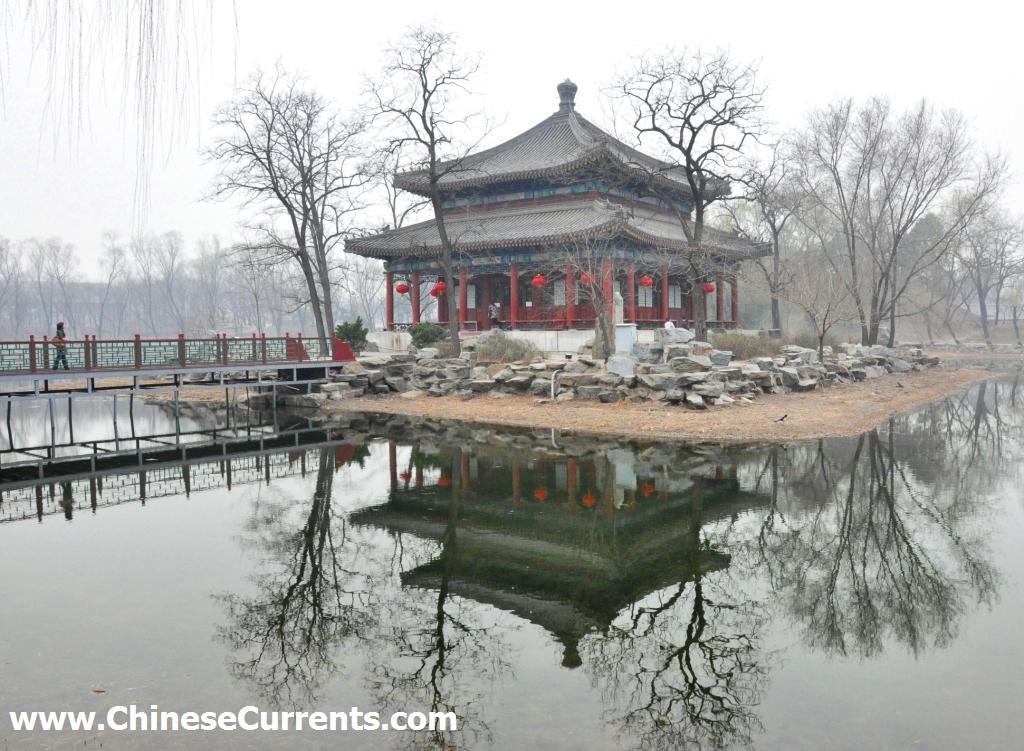
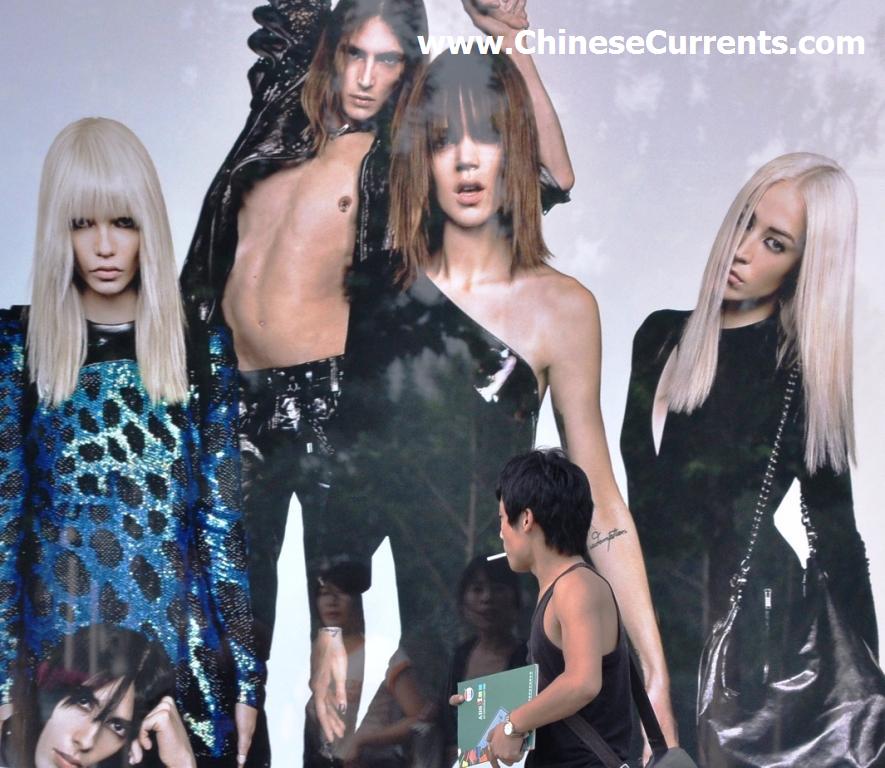
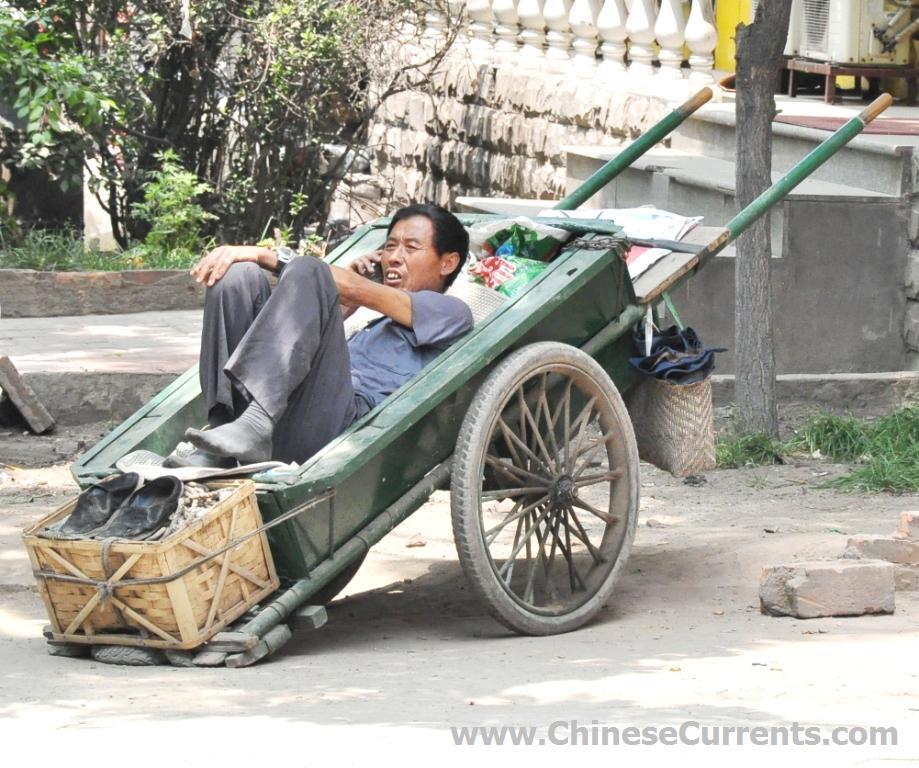
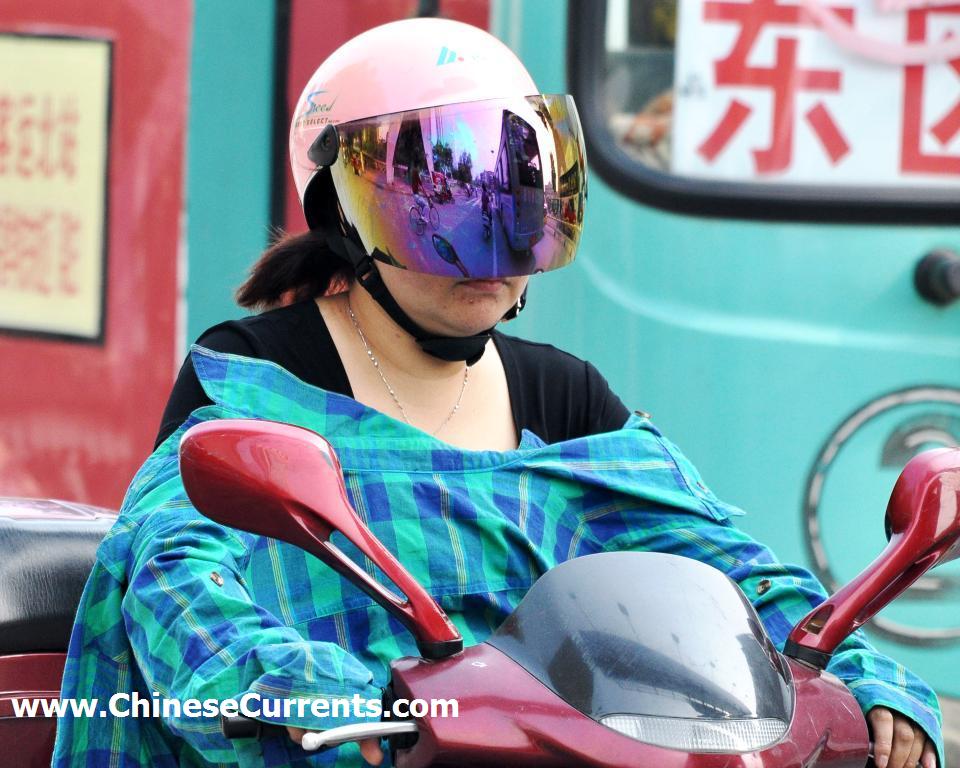
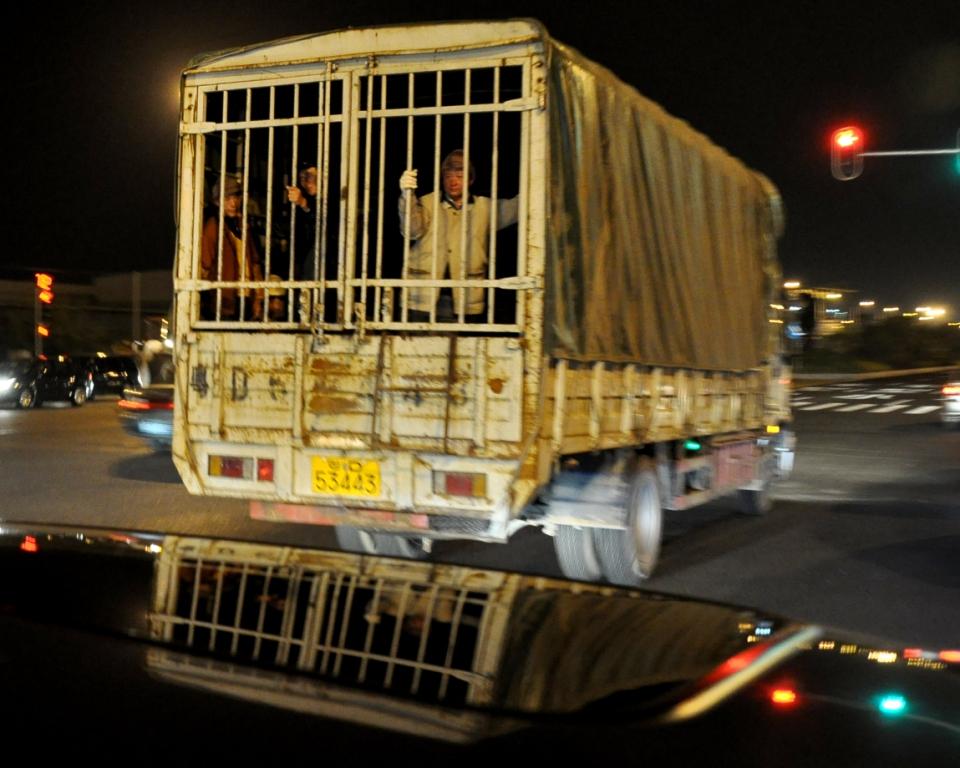
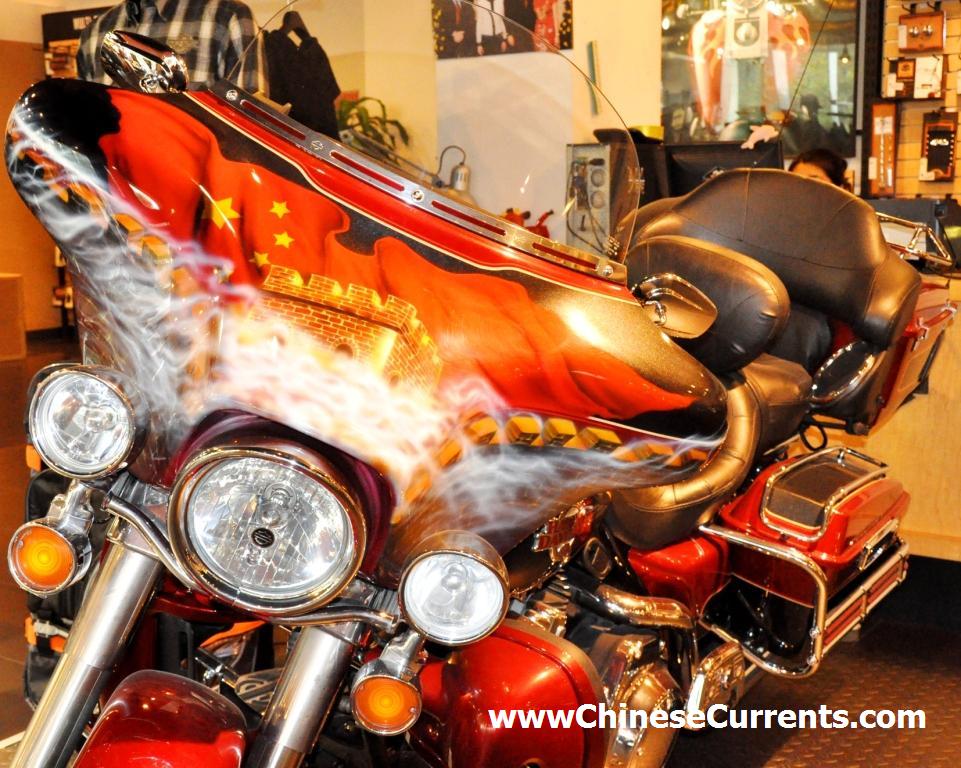
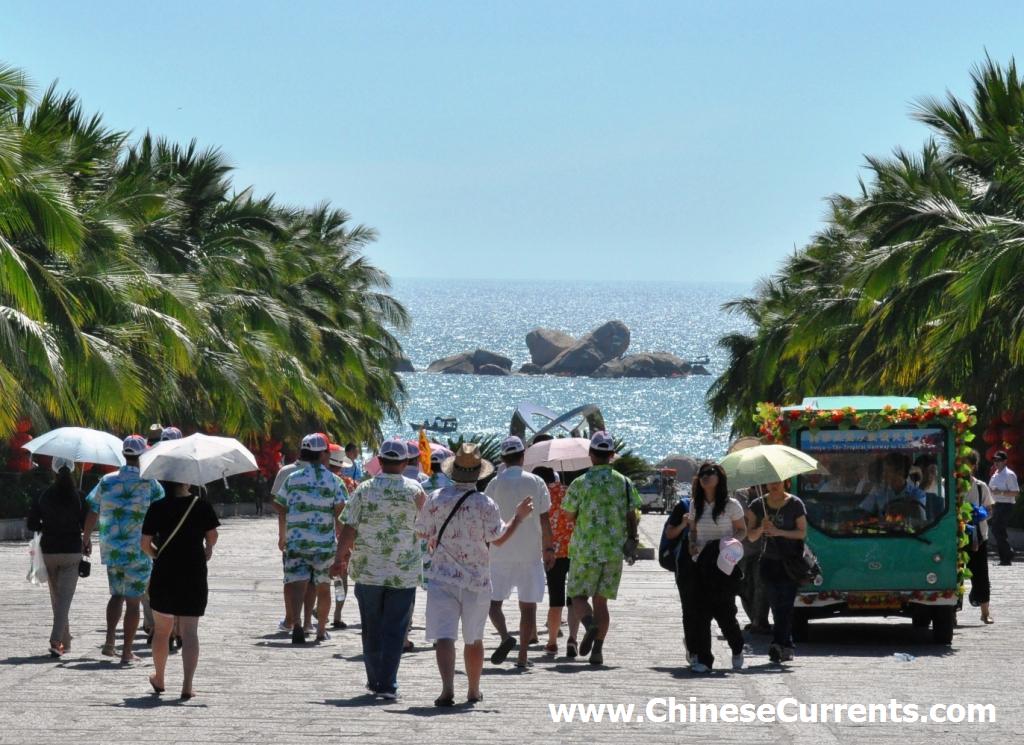
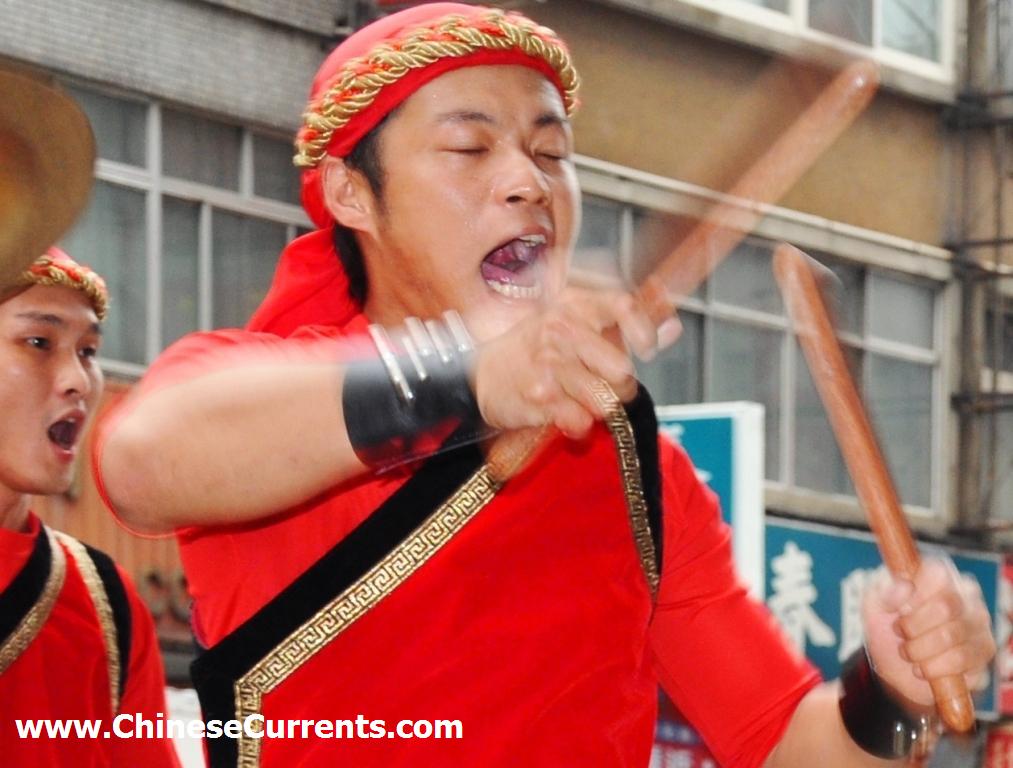
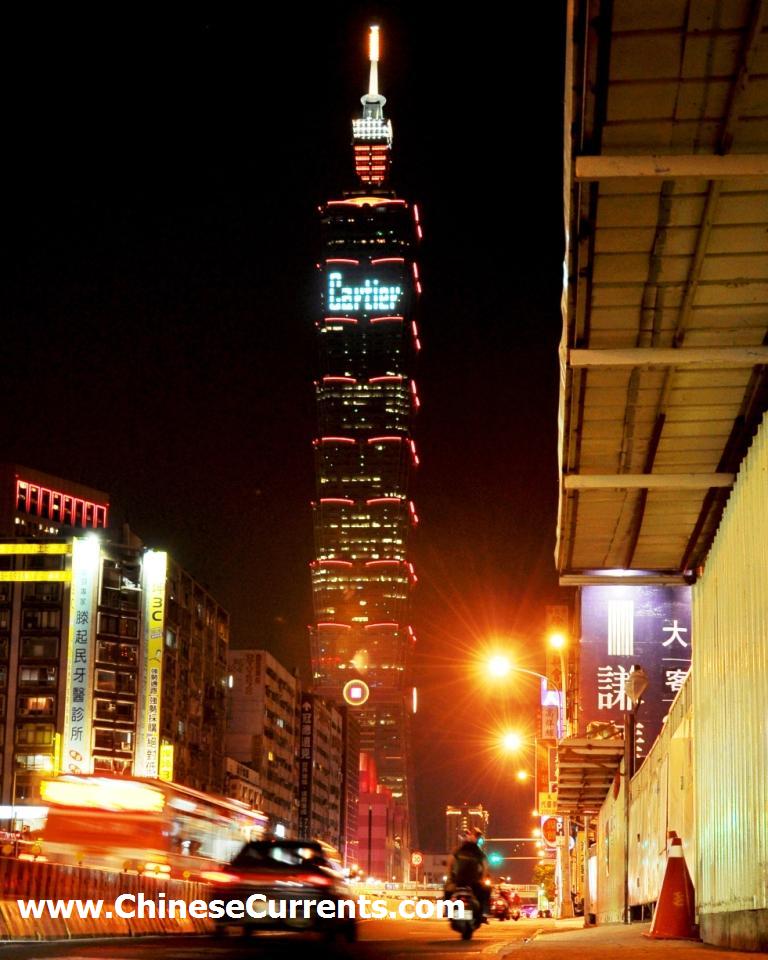
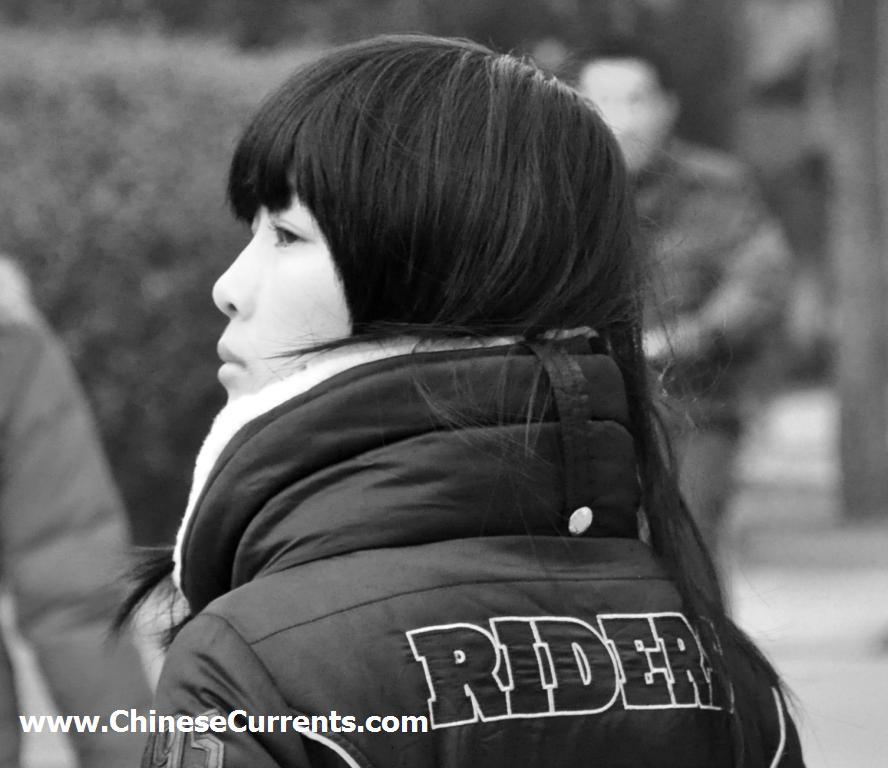
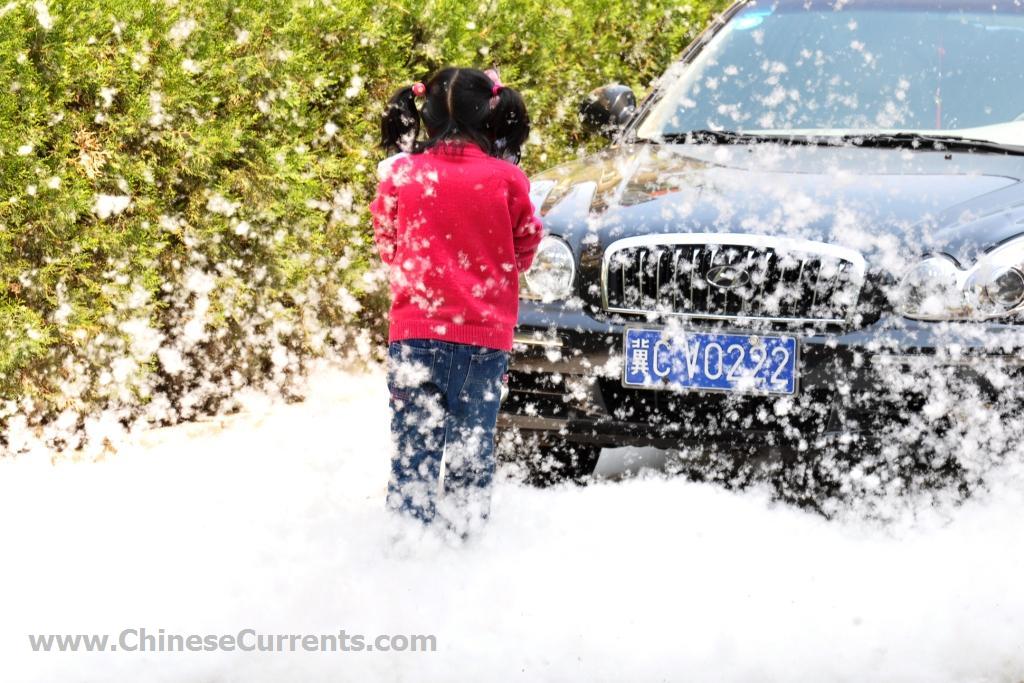
|
| Poplar seeds, not snow |
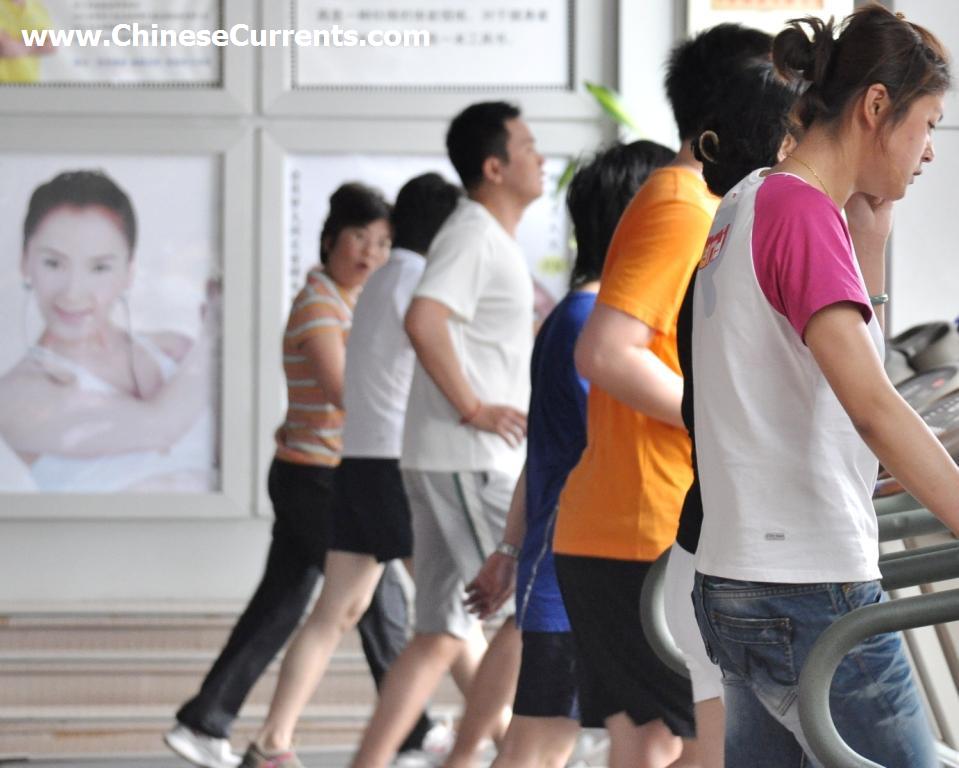
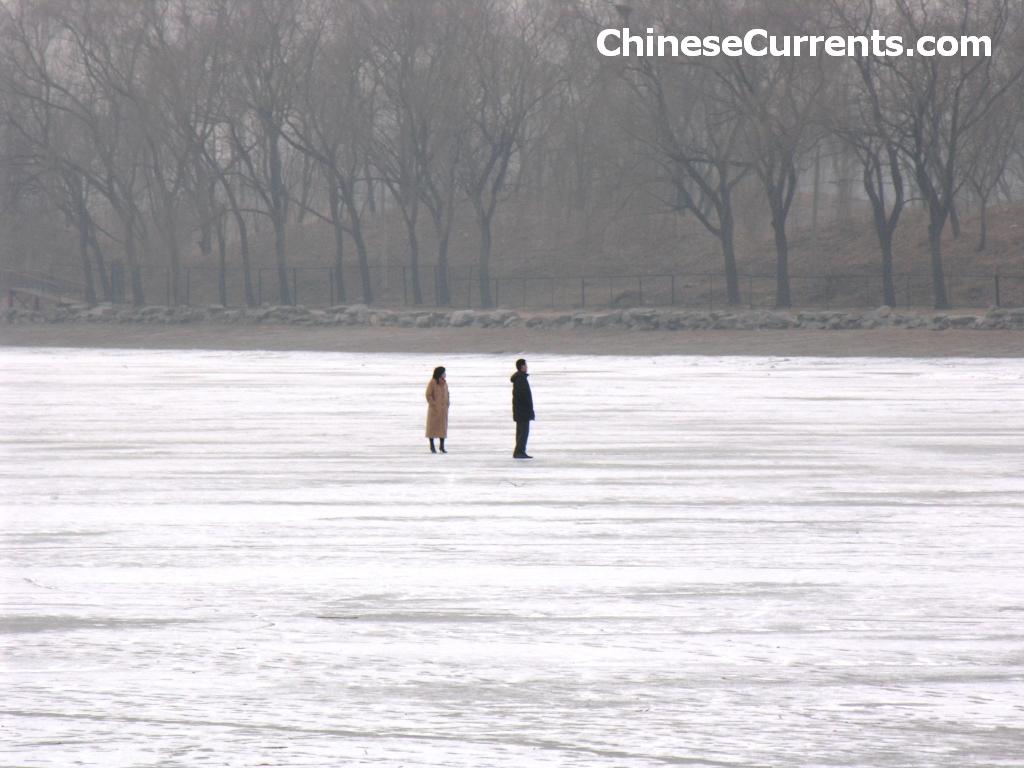
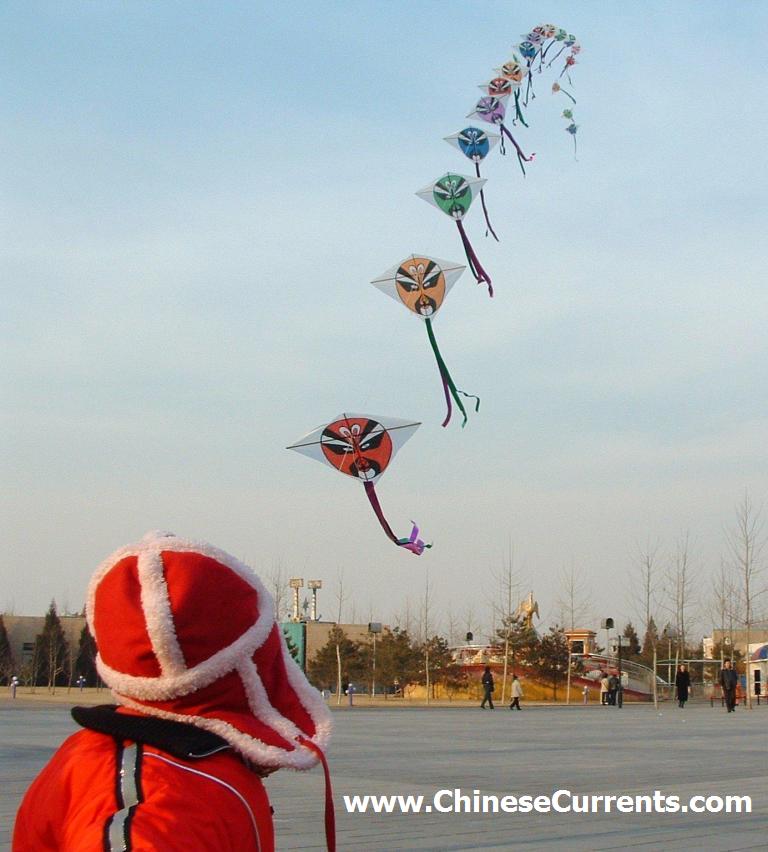
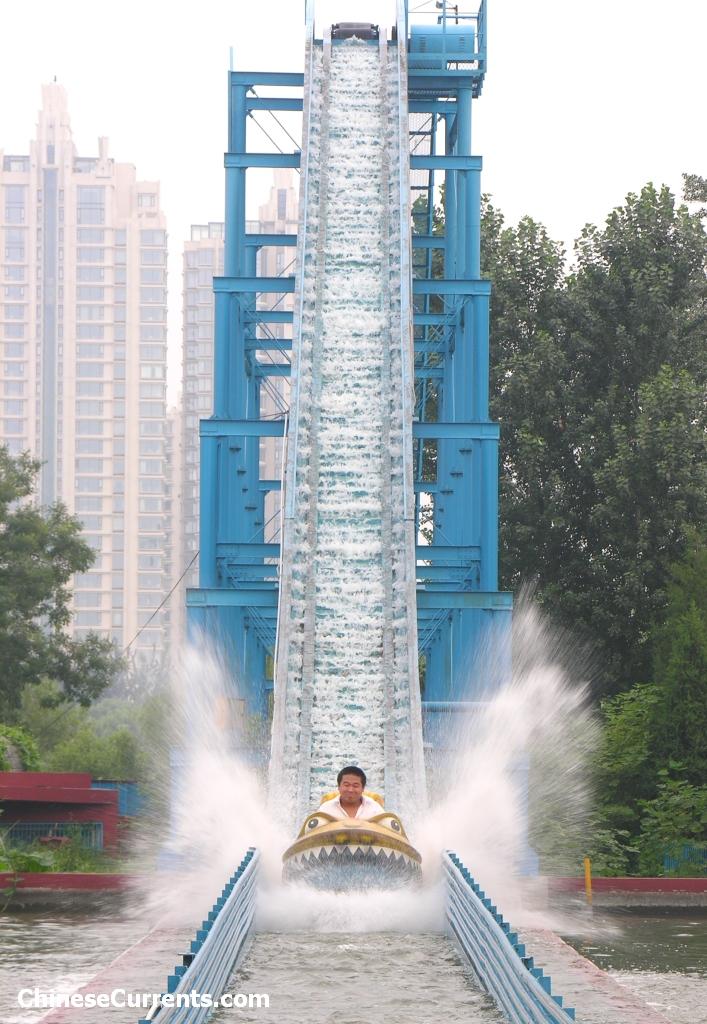
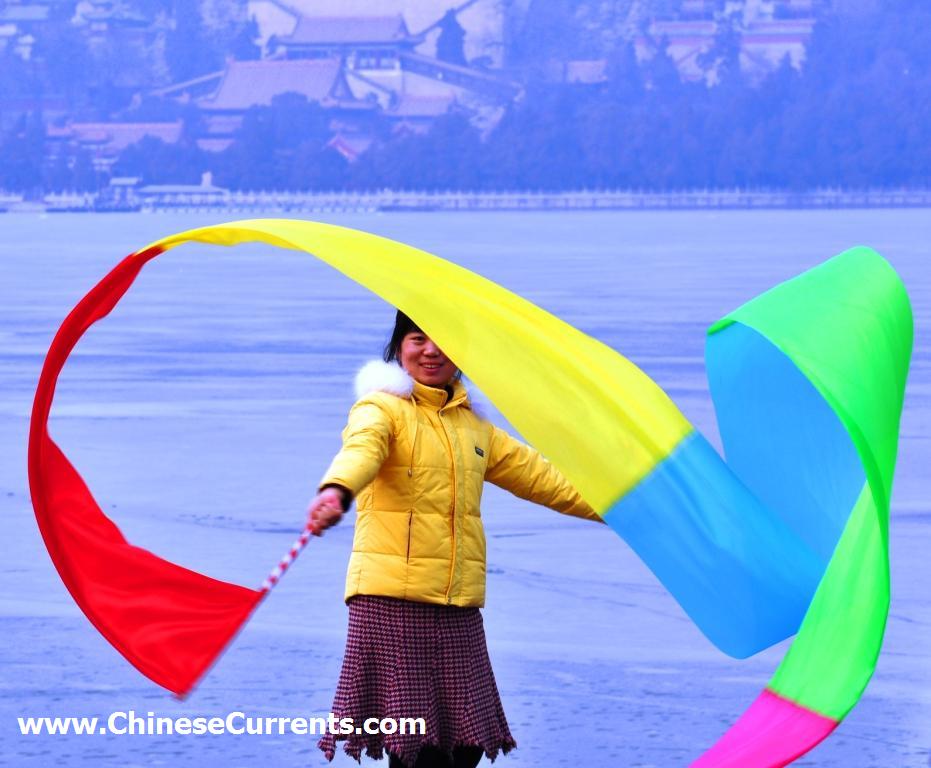
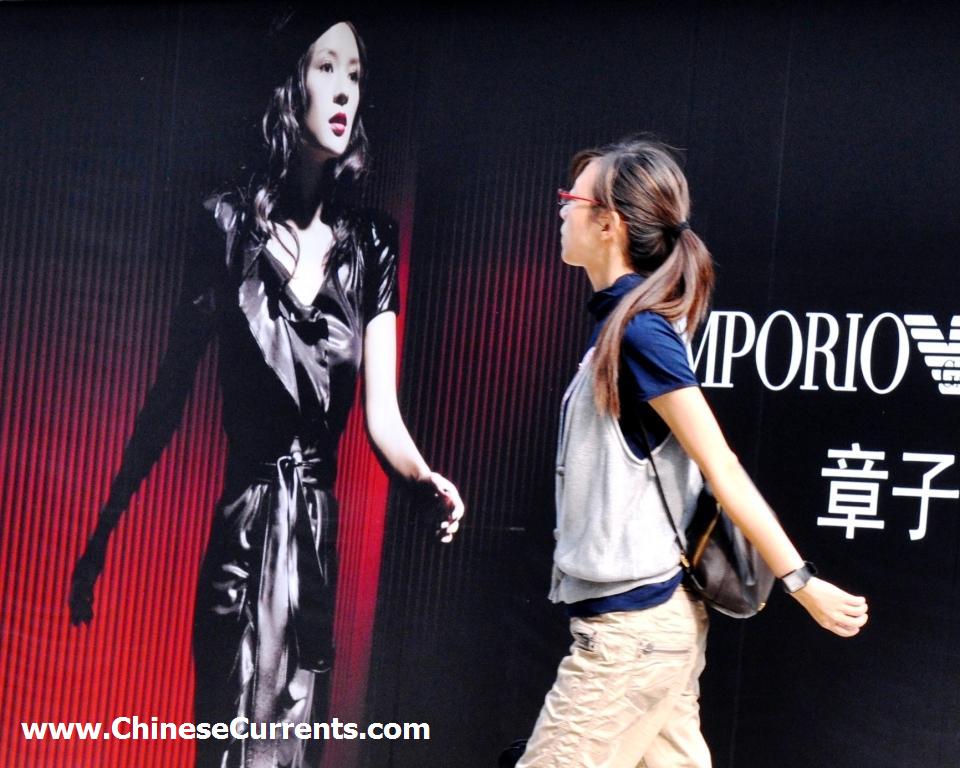
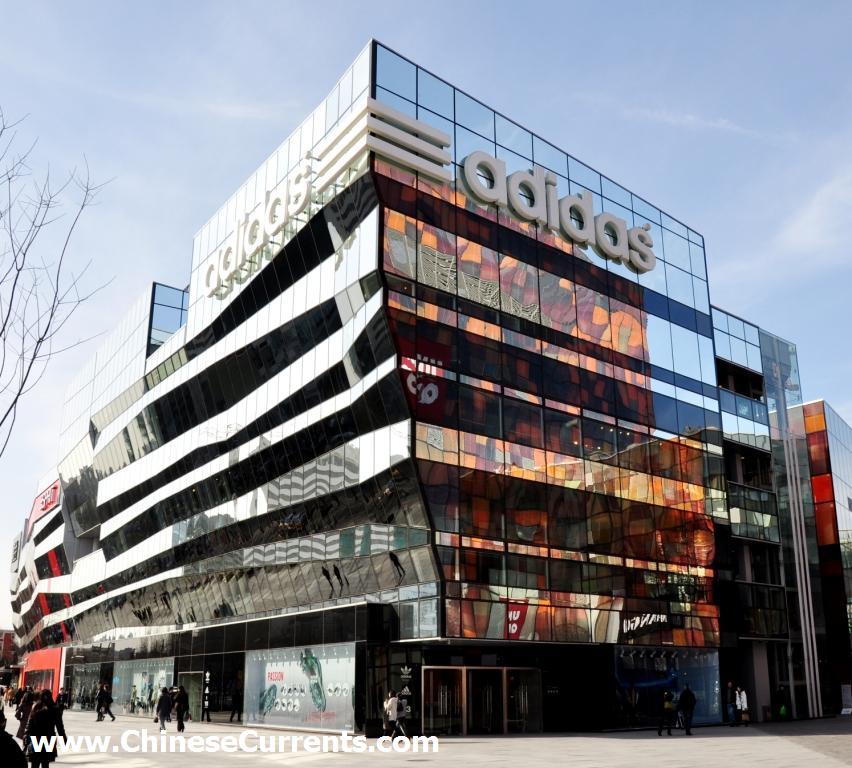
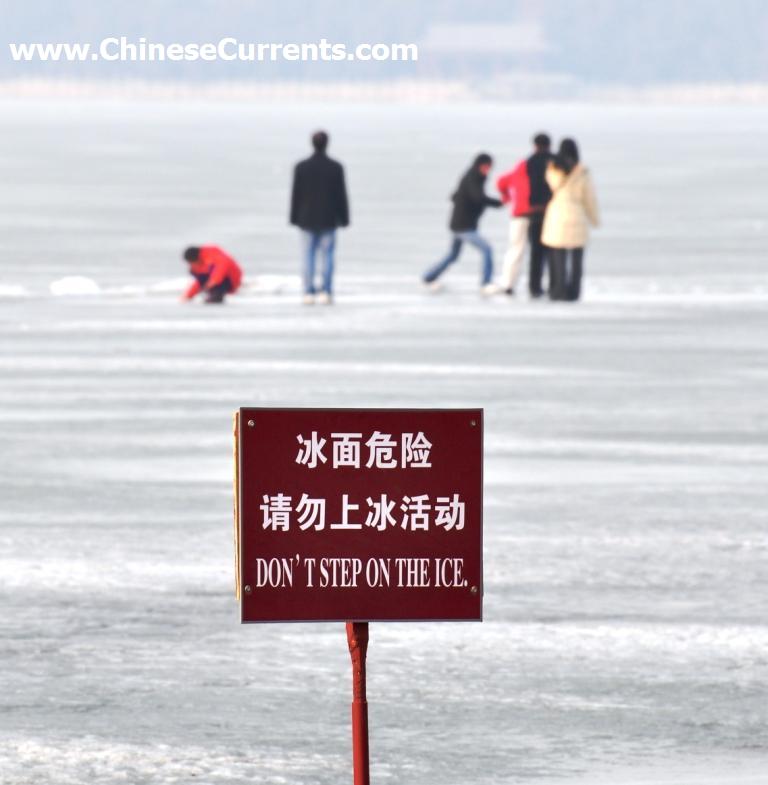
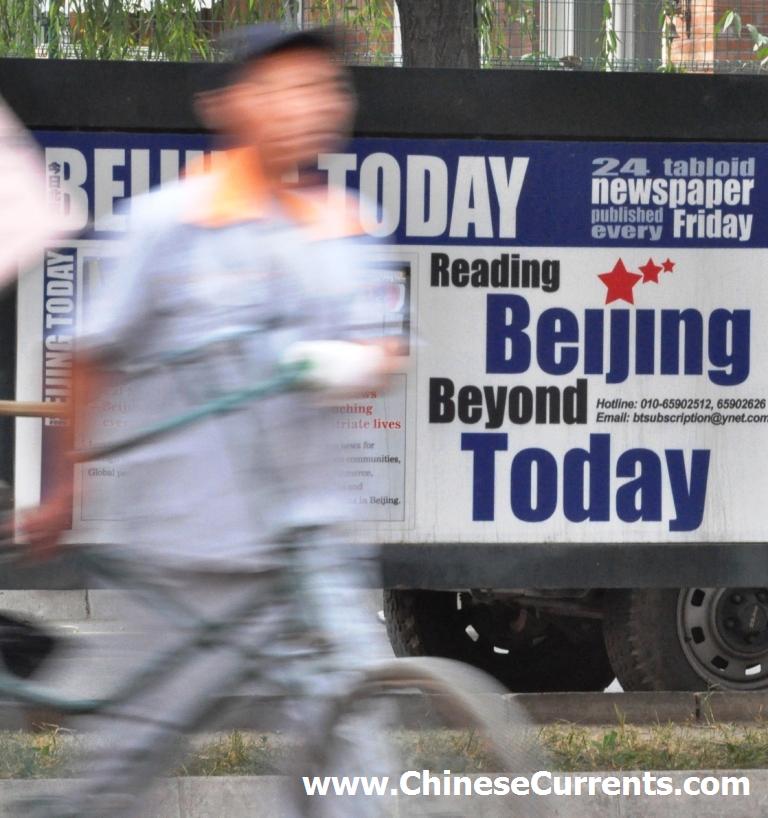
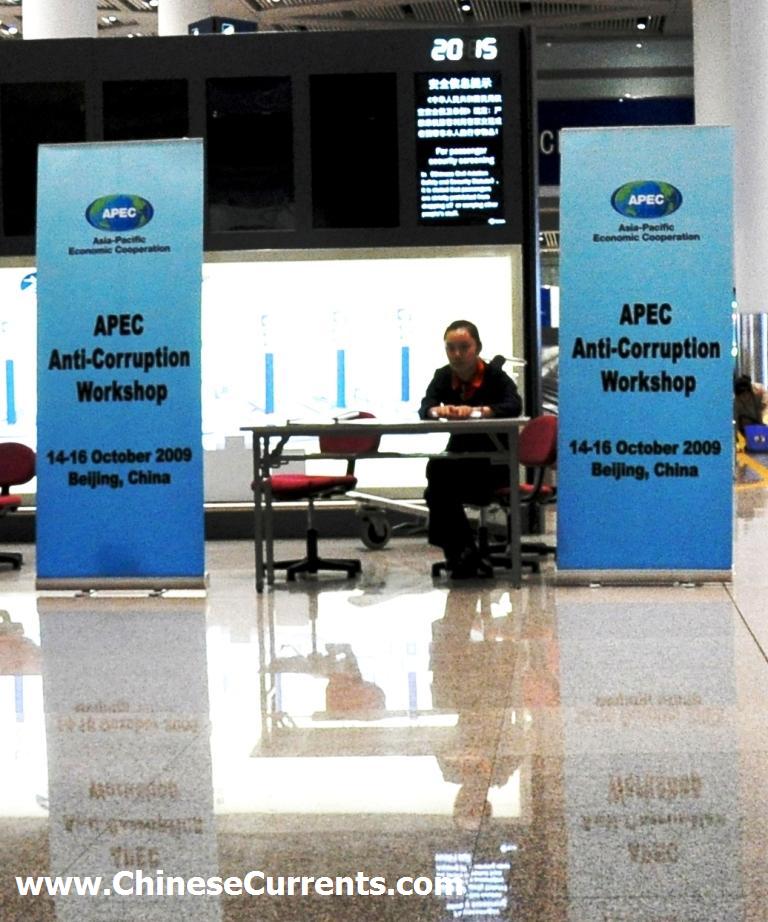
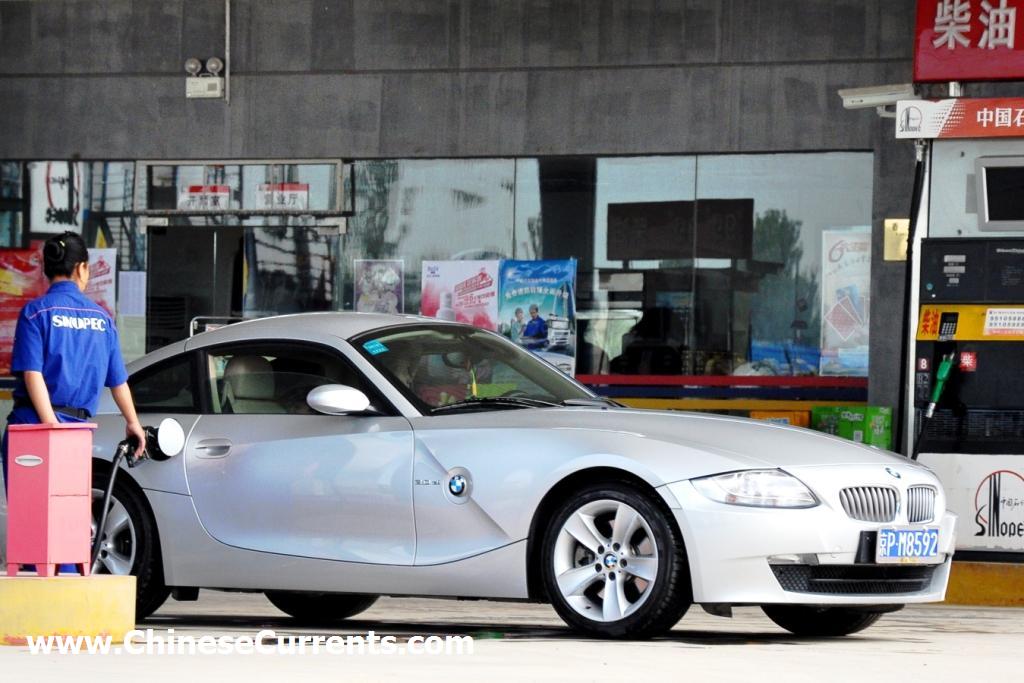
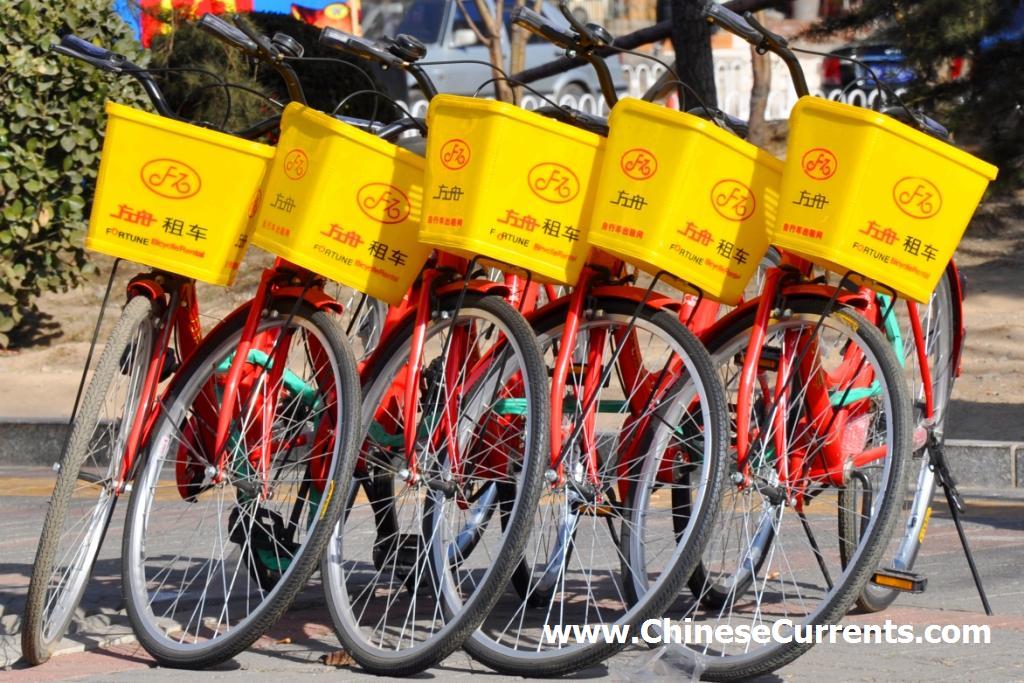
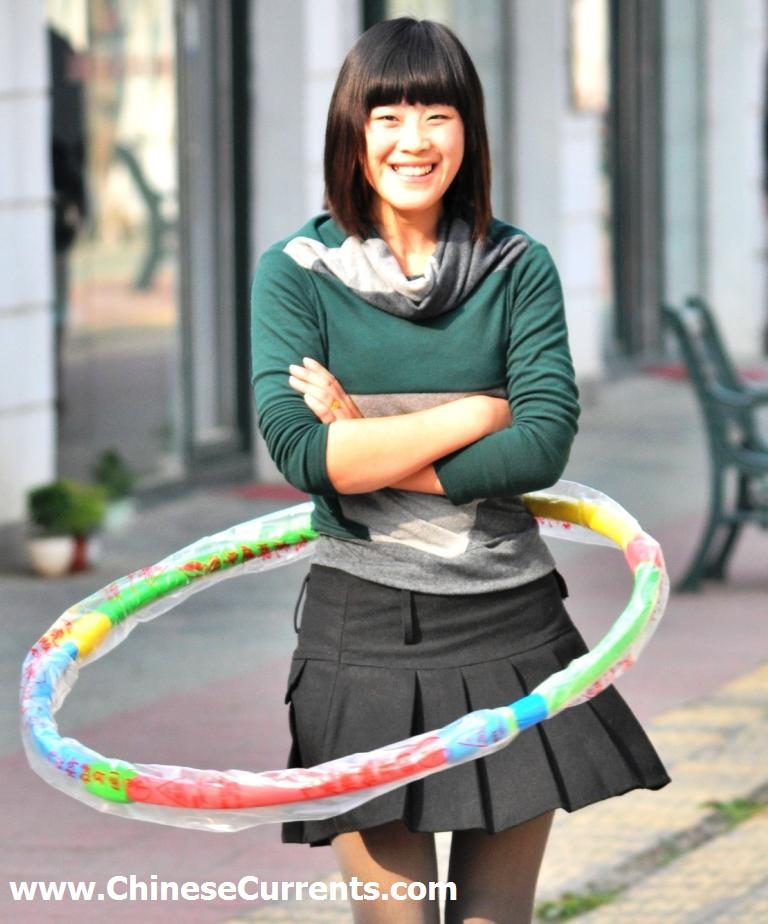
14 flavours Monday, 28th December
2009; Chengdu, Sichuan
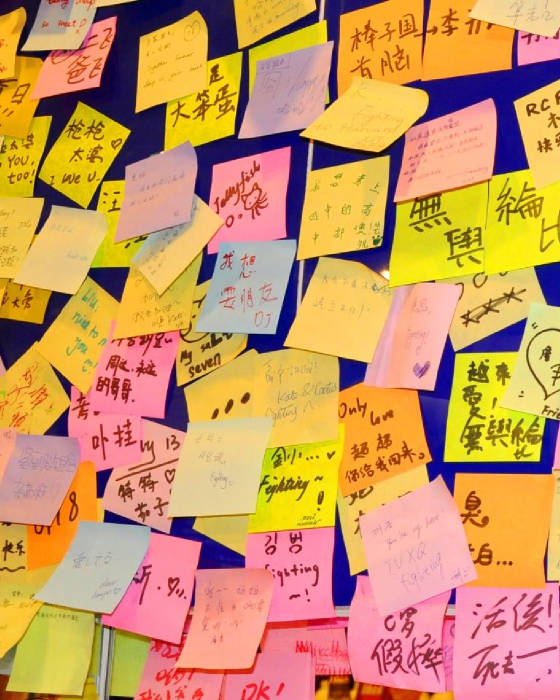
|
| High school students' message board |
“What flavour would you like?” enquired Ms Zhang. “What flavours do you
have,” I asked. I stood open-mouthed as she reeled off an impressive list of exotic flavours
– so exotic that I had no idea what half of them were. Of the ones I did have some idea about, the
Hami melon flavour was the most enticing.
“Are the Hami melons from Xinjiang,” I asked. “I guess so,” she said, “Where else would they be from?”
Her brusque
riposte was exactly what I deserved (serves me right for trying to show off that I actually knew that Hami is a town in Xinjiang). She handed me the Hami ice
cream cornet.
“What do you think?” she asked. I wanted to say it was good, but with a mouthful of ice cream I
had to make do with nodding enthusiastically. I must confess that the reason I had gone in to the “Aike Gelato Italiano”
(literally: Love Customers Italian Ice Cream) shop was to find out about the post-it notes on the wall. As
I had been walking by, the sight of hundreds of brightly coloured post-its had stopped me in my tracks. “Who
had put them there, and what did they say?” I wondered. The three yuan I had just paid for the ice cream had also bought me the
opportunity to find out the answers to these questions.
Ms Zhang told me that most of her customers were from the high school opposite, and that she encourages them to decorate
her walls with post-it note graffiti (she supplies the post-its, in several different colours). "What do they write about,”
I asked. She looked at me as if to say what a silly question, but answered it nevertheless. The messages
that her 15, 16, 17 and 18 year-old customers had pinned up mostly fall in to two categories. Love
notes, it seemed, were the most popular leave-behinds (for the girls). While "fighting talk" was the boys'
preferred subject. “I guess teenagers are the same the world over,” I joked. “Why did you decide to open an
ice cream shop,” I asked.
“I live nearby and was looking to open a shop in this area after the one I had before (a clothes boutique) was
demolished.”
I knew what she meant without asking. Chengdu, along with all the other Chinese cities, is busy
knocking down old neighbourhoods and replacing them with shiny new apartment and office blocks, shopping centres, and arcades.
Ms Zhang’s clothes shop was one of many thousands of houses and businesses that had been sledge-hammered to the
ground (cheaper than bulldozers) in the name of modernisation and economic development. But, rather than
feeling sorry for herself and thinking about how good things used to be, she (and countless others) had bounced back and had
gone on to better things.
Indeed, Ms Zhang’s business sense is highly developed. She told me that the school opposite
is one of the top high schools in Chengdu. As well as high-achieving students it also counts Li Peng, the Chinese premier
from 1987 to 1999, and adopted son of Zhou Enlai, Mao's right-hand man, as one of its alumni. The “quality”
of the school is an important consideration for any would-be ice cream shop owner in its proximity, because
the kids who attend the “best” high schools tend to have richer parents than kids who attend less-acclaimed schools.
That means more pocket money and therefore more money for them to spend on ice cream. Hence the move up-market
to relatively premium-priced Italian ice-cream. But Ms Zhang thinks they deserve their treats. She
told me:
“I feel sorry for them. They are under so much pressure. The gao kao [university entrance
exam] is so difficult, and this school strives to be the best, so the kids have to work even harder. They
start school at 8am and don’t finish until 9pm. The time they spend here [in her shop] is precious
to them.”
I could sense that her customers were important to Ms Zhang for reasons other than their their purchasing
power.
She saw that I was about to sit on one of the high stools next to the post-it wall. “Be careful...,”
she said, “...that one’s broken.” Ms Zhang went on to tell me the story of how one of the kids had
accidentally broken it last week. The student had been really worried because she would not have been able to pay
the replacement cost (Four months ice cream money I calculated). “…But I told her not to worry...,”
she smiled, “...After all, we were all young once.”
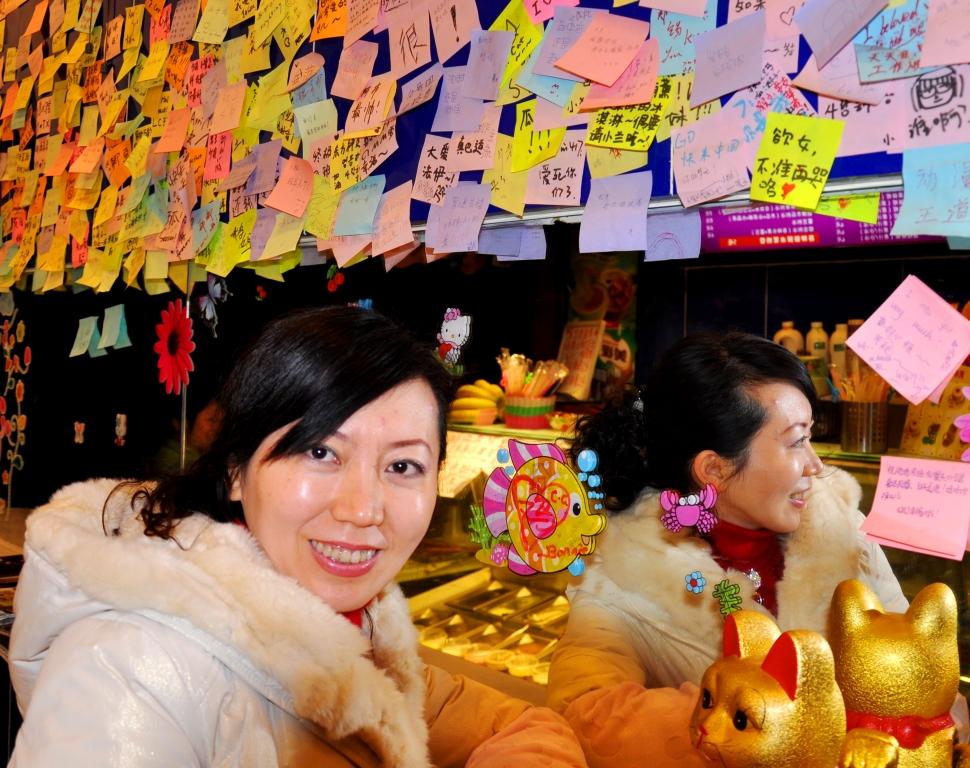
Of MICE and men Tuesday, 22nd December
2009; Sanya, Hainan
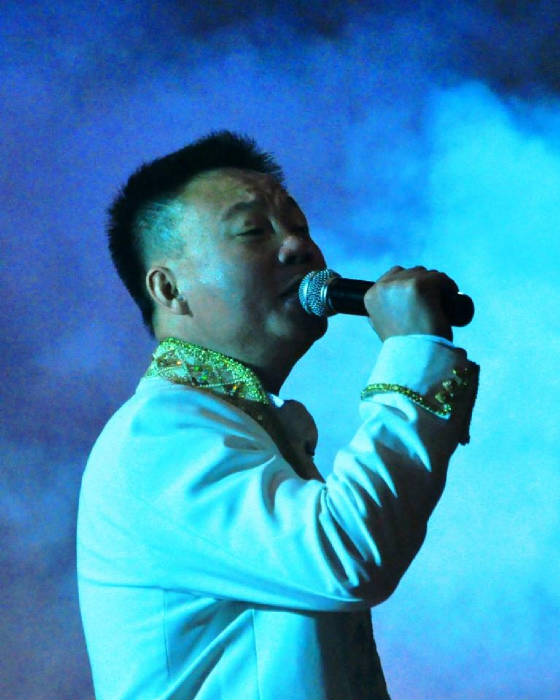
|
| Entertaining an odd breed of MICE |
They are pampered, well-fed, royally entertained, and ferried around in luxury vehicles.
Brightly coloured swarms of them can be seen at midday running harem scarem on Sanya’s golden beaches.
Contrary to popular belief, they are not afraid of water… Indeed, many can be seen splashing
about in the waves that lap gently on to the shores of Yalong Bay – their preferred habitat. At night,
it’s not unusual to see some of them swaying to the beat of an 80s Brit-pop anthem, while knocking back the free-flow
wines, beers, and spirits. They are known – in the hospitality trade at least – as “MICE”.
The industry’s
somewhat discourteous acronym (I, too, have been one of their millions, and I can tell you that the above description is a
bit too close for comfort, for me at least) stands for: Meetings, Incentives, Conferences/Conventions and Exhibitions/Events. In the first
half of 2009, 3.4 million tourists visited Sanya, 3.22 million of whom were mainland Chinese (up 14.5 per cent year-on-year;
while the economic downturn in most parts of the world led to a 40 per cent decline in non-mainland tourists).
And a large number of those tourists were MICE – who contribute more profit to the island's tourism industry
than the average visitor. (Sorry for not presenting the numbers, but MICE are notoriously difficult to count –
at least I managed to find out that there are about 6,000 groups a year of them in Sanya, according to Du Liyin,
the director of the Sanya Tourism Development Bureau.) The
nature of those groups is extremely varied. Let’s look at the Sheraton Sanya Resort, for example.
It has hosted the final of the Miss World Contest on three occasions. It has also played host to
the 108 visiting monks from the Buddah societies of the Taiwan Strait, Hong Kong and Macau. The Sheraton and the other leading hotels of course
love to attract high profile events, but it’s the MICE from their numerous corporate clients that really bring home
the cheese. But the nature of this source of business is changing rapidly. These days
in Sanya, you are just as likely to stumble across an event or activity organised by a Chinese company you’ve never
heard of than one paid for by a world famous brand. This
evening I was walking past the Crowne Plaza in Yalong Bay, Sanya, when bright lights and the sound of a male’s rich
baritone voice caught my attention. A group of locals were watching the performance, pressed up against
the gold rope that marked the boundary of the corporate entertainment area. Naturally curious (well, I was born in the Chinese year of the mouse – aka “rat”),
I just had to find out what was going on. Something in the order of 150 well-heeled guests were helping
themselves to the seafood buffet, while the baritone crooned out a mournful song. They had gone slightly
over the top with the special effects, and the dry ice looked more like smoke that was enveloping the performer.
Undeterred, he crooned on. Behind him I could see the billboard announcing the evening’s sponsor.
It was non other than “Yang Quan Coal Industry (Group) Co., Ltd.” Of course I had never heard of them.
I asked one of the bouncers standing by the gold rope who they are. “From Shanxi,” he
told be begrudgingly. “And what about the guests”, I asked. “Bosses
and their customers,” was his curt reply. Well fancy that... There was I thinking
that the 100 top coal-winning miners had been flown here on an all-expenses-paid jolly. The plight of miners in Shanxi and all over China is certainly no laughing
matter.
In 2008, according to the State Administration of Work Safety, 3,215 miners lost their lives. In Shanxi in 2009, 77
men died in one accident at Tunlan coal mine in Gujiao city, which is close to the provincial capital of Taiyuan.
While there is no suggestion that Yangquan company – one of the country’s top five coal-mining companies,
and China’s largest producer of anthracite coal – is any way culpable in respect of any of the fatalities, it
did strike me as somewhat distasteful that in a year that has been beset by large-scale mining disasters, and
in a year when the Shanxi economy was the only provincial economy to shrink (minus 4.4 per cent y-o-y for the first half of
2009), the company had decided to hold a huge end-of-year bash in Sanya. I couldn’t stop myself thinking that
the money paid out for the large shoal of king prawns being devoured by their employees and guests would have been
better spent on improving the industry's safety record, or providing better support to the loved ones
of those brave men who so tragically lost their lives. I glanced at the singer again. The smoky backdrop suddenly
appeared strangely macabre.
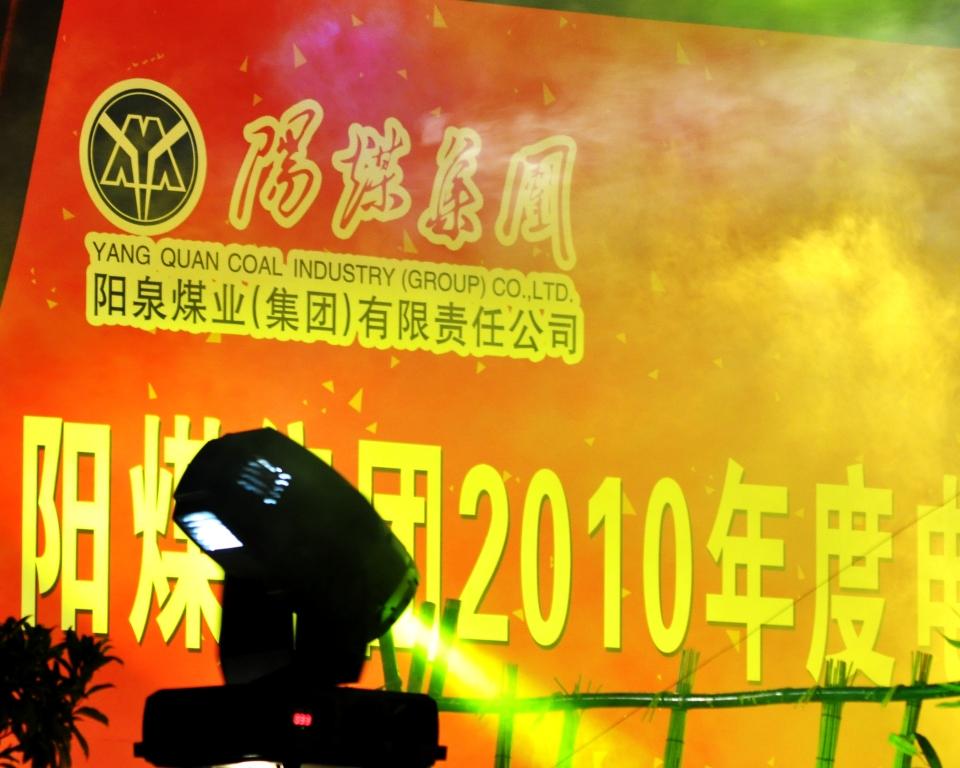
Noodle Wars Sunday,
13th December 2009; Lanzhou, Gansu
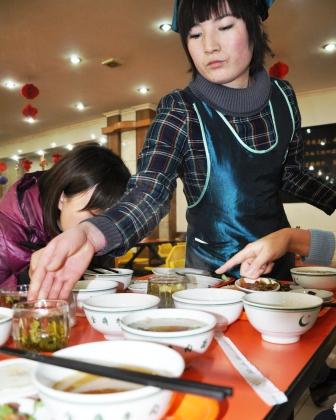
|
| Don't mess with my noodles |
It’s fun playing
the place association game. Ask a number of people at random – at least six to give the exercise
a veneer of statistical robustness – to say the first word that pops into their head when a city name is mentioned,
and one is able to learn a lot about how different people in different regions view the world and the way it works.
Mention “Milan” to a group of twenty-something ladies in Shanghai and you most probably would get “fashion”
as the response.
The mention of “Milan” to older Beijingers is more likely to provoke the response, “football”.
While fans of the football team Chelsea may well chorus in reverential tones “The Special One” (the self-styled
name of Jose Mourhino, the last Chelsea manager to steward them to Premier League success). In case you
were wondering, The Special One now manages Internazionale, aka Inter Milan. What, then, do people think
about when the city Lanzhou is mentioned? I asked several people from various parts
of China to give me their top-of-mind word to describe the provincial capital of Gansu and each one them said the same word,
and they said it with an exclamation mark at the end and with a glint in their eye. “Noodles!” Not being much of a fan of noodles (other than
when I can’t get anything else to eat), I had just about forgotten the findings of my “research” when an
acquaintance told me that I simply must go to the most famous chain of noodles restaurants in Lanzhou – because not
eating noodles in Lanzhou is, it seems, the equivalent of not eating duck in Beijing, fish and chips in London, or not drinking
Guinness in Dublin. In short, it’s not just a cultural faux pas, it’s also an error of judgement
that would haunt one forever (presumably, after one had somehow seen the light). The Guinness analogy caught
my attention, not because I had abstained on my visits there but because it’s frightening to think that there are, I
guess, some people who have been there and not drunk the black stuff. The problem was that Jin Ding Niurou Mian, the most famous Lanzhou
beef noodles restaurant in the world didn’t open at night. In Lanzhou, it seems, noodles are only
eaten at breakfast and at lunch. I’m more likely to skip lunch than not, so the prospect of a midday
bowl of noodles was a little foreboding to say the least. But, despite my excuses, I was somehow dragged
along to the restaurant.
One bowl of noodles would have been more than enough I thought, but this restaurant had other ideas. Their
standard set Lanzhou beef noodles lunch comes with not one bowl, not two bowls, not even thee bowls, but FOUR bowls of noodles.
Each of which contains noodles of a different length, texture, and thickness. The pecking order,
I was told, is to eat the thinnest noodles first and progress to the thickest. There was also a supporting
cast of several side dishes crammed on to the large tray. And all for the price of 30 yuan (about US$4).
Now this may sound wonderful value, but it is far higher than the going rate for beef noodles in the thousands of noodles
shops in Lanzhou, where the local delicacy can be had for a couple of yuan. But this was, after all, the
Savoy of noodle-eating, so I wasn’t about to complain.
The price of noodles is, it seems, always a hot topic in Lanzhou and is capable of stirring much passion and,
if the incident a few years ago is anything to go by, even threatening social harmony. The dark period in Lanzhou’s noodle
history I am referring to was back in 2006 when thousands of locals simultaneously choked on their noodles when they realised
that – literally over night – the price of a standard bowl had risen by almost 15 per cent. Such
was the newsworthiness of this event that the People’s Daily – the mouthpiece of central government – even
covered the story. But it was the investigative journalists from the Western Economic Daily that exposed
the truth (obvious to every one in Lanzhou) that the price rise was coordinated. Outrage of outrages…
there was a noodles cartel at work no less. The noodles barons were influential restaurant owners who were intimidating
other owners. The threat was, put your price up to our price or risk being the victim of an “accident”.
The public outcry and the weight of evidence were such that the city government simply had to take action against the
perpetrators. What
was all the fuss about I wondered?
I finished the first bowl.
It was, quite simply, the best bowl of noodles or, come to think about it, the best bowl of anything I have ever tasted.
Succulent beef, aromatic broth, perfect noodle-texture. The next three bowls were also scoffed in double-quick time.
Still
not satisfied, I looked around for more.
I was conscious that the kitchen staff (the noodle-pullers themselves) were watching when I volunteered to eat the
bowl of noodles that one of my dining companions couldn’t manage. But that wasn’t going to
stop me. It happened
to be a bowl of noodle number four – the really special ones.
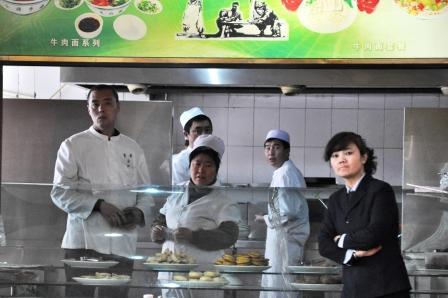
|
| How many ??!! |
Pick a card Thursday,
19th November 2009; Shantou, Guangdong
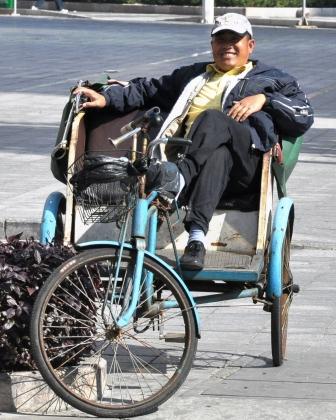
|
| Mr Fixit |
There’s something a little bit special about Shantou, a city of about five million people that abuts the
South China Sea in Guangdong province. But it’s hard to put one’s finger on what it is. The first impression
of the city, gleaned on the ride from the airport to the downtown area, is that it is has just been taken out of the box.
Local governments try hard to make the ride from the airport as impressive as possible, but few manage to paper over
all the cracks. But in Shantou, no matter how hard I tried, I couldn’t spot any building that looked
like it wasn’t freshly painted. But then again it was dark. The air of pristine
order lasted all the way to the start of the downtown area when, at the first traffic lights, an ancient truck with bars at
the back didn’t bother to stop at the red light. The soulful stares of three men caught my eye, and
in a split-second I jumped to the conclusion that this was a prison truck. A second look showed just how
wrong first impressions can be. The truck was, in fact, a private truck and the men were, most probably,
migrant workers on their way to or from their place of work. I would have loved to have stopped them for a few minutes
to find out their story, but chasing after the truck wasn’t a sensible thing to do. I didn’t
have to wait long, however, before I was stopped by a migrant worker, who wanted to know more about me. Mr Zhang is from
Zhengzhou, the capital of Henan province, and came to Shantou five years ago to make his fortune. “Where
are you from,” he asked. I told him. “What’s your favourite food,”
was his second question. I told him that too. “Sorry, I don’t know of any
Indian restaurants here, but I do know a good Italian.” Mr Zhang pulled out a card from his pocket,
and handed it to me. “It’s five minutes away, I can take you there if you like,” he offered.
Mr Zhang gestured to his tricycle rickshaw that was parked some 20 yards away. “Thanks, but
I’m not hungry,” I said. “In that case, why don’t I take you to a really good tailor
I know. They make excellent European suits.” I wondered what a European suit looks like.
A complete dog’s dinner of a 20-odd country compromise I mused. “No thanks,” I
smiled.
Mr Zhang saw that I was looking down at the pavement at two telephone numbers, painted on to a paving slab that had
caught my eye. “Oh, if you want to buy some fapiaos, then I have a number. They’ll
give you a much better deal.” I told him that I was not a member of the British parliament so had
no need for fapiaos – official receipts that are often traded on the black market (and bought by the unscrupulous
who use them to claim imaginary expenses or to offset company tax liability). Undeterred, Mr Zhang tried another
approach. “You must be tired after your trip from Guangzhou, I reckon you could do with a massage.”
With a magician’s dexterity, Mr Zhang pulled yet another card from thin air. This one showed
a drawing of a scantily clad woman, the Chinese characters anmo [massage] and a mobile phone number.
“No thanks,” I said, “I don’t feel tired at all”. But he didn’t
hear me as he was answering his mobile phone. “Wei!” he shouted. “Dangren
you” [“Of course I’ve got some!”]. I didn’t like
to ask “what”, but whatever they were, Mr Zhang would deliver them to the caller within an hour. Mr
Zhang put away the N series Nokia – one of the more expensive ones – and turned his attention back to me.
I gave the card back to him and repeated, “No thanks”. “In that
case,” he said, “why not take a ride with me, “I’ll show you Shantou.” There’s
no doubt that Mr Zhang could have taught me a lot about Shantou but, alas, I had some work to do. Maybe in a previous
life Mr Zhang had been a top salesman, or an estate agent, or a psychologist, because I had an uncanny feeling that I was
being profiled. Every question he asked was related to something he could sell me either directly or indirectly. Shantou is able
to provide Mr Zhang with something that Zhengzhou can’t: An environment that is conducive to his
entrepreneurship.
Shantou has been attracting entrepreneurs for generations. It was one of the Nineteenth century
“treaty ports”, as well as one of the original special economic zones (SEZs). Sons of Shantou
include Huang Guangyu, one of the richest people in China, the founder and former head of the Chinese electrical retailing
giant Gome (who is currently the subject of a criminal investigation related to alleged share-price manipulation); and Ma
Huateng, another fabulously rich individual, who founded Tencent, an Internet services company that, among many offerings,
runs QQ – the most popular instant messaging service on the planet (which has something in the order of a half-billion
registered users). I
asked Mr Zheng if he could put his finger on what it is that makes Shantou such a special place. He thought
for a moment, before concluding that he had no idea. Although he was able to offer one clue:
“People drink a lot of tea here”. Perhaps, then, it’s something that’s
in the water.
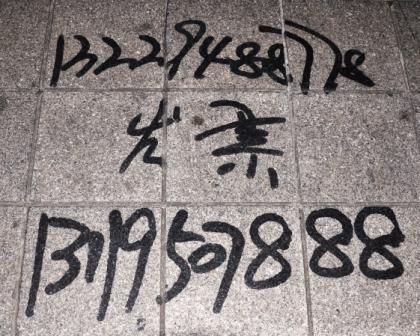
|
| No-cost advertising |
Snow White arrives in Beijing Tuesday, 10th November 2009; Beijing
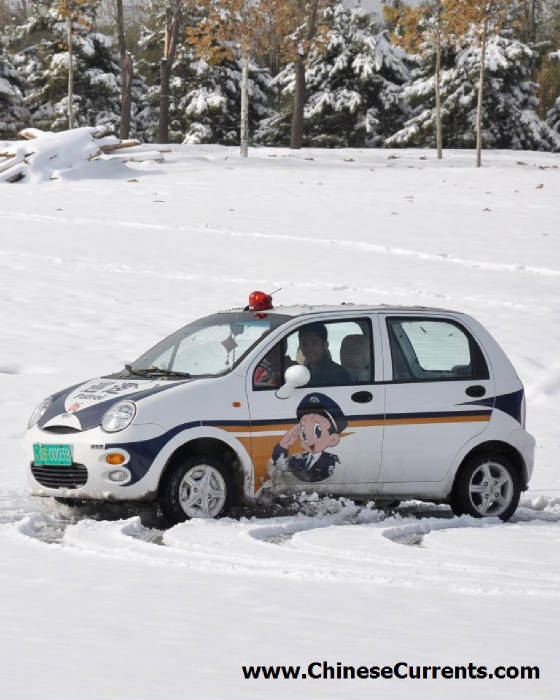
|
| Winter Wonderland in Chaoyang Park, Beijing |
It was one of those magical days. The 5 inches of snow that fell last night
has transformed the Chaoyang district of Beijing. The grey dust that coated the buildings, trees, roads,
everything, has been air-brushed by the thickest blanket of powdery snow I've ever seen in Beijing. So
much for global warming.
Any thoughts of spending the day tapping the keyboard of a computer were quickly hijacked by an irresistible urge to
go to the biggest and best open space in central Beijing, Chaoyang Park. Usually, it takes no more
than 20 minutes to drive there; this morning it took just over one hour. But it was worth the effort. I wandered around chatting
to anyone who wanted to chat and taking photos of people at play. Three chefs had just finished building a snowman.
"Where
are your customers today?" I joked. "No one will come today," the head cook said with
a chuckle, as he added the finishing touches to a snowman that was almost as tall as him. I could make out that he had
buttons made of sliced carrots; carrot-top ears, a bamboo hat, and an eggshell nose. But
there was one facial feature that had me guessing... "What are its eyes made of?" I asked. "Aubergines of course!"
shouted out the junior chef who was standing behind me.
The head chef smoothed out the chin and then stood back to admire his creation. "There, you can now take a photo
of it if you want".
The head chef was right. There would be no customers today. The park, which on
any normal day has many thousands of visitors, held three chefs, a mum and her three year-old daughter, two students, a few
hardy older ladies, and a dozen or so park workers, some of whom were trying without much success to knock the snow off the
tops of conifer trees with long brooms, and two who were driving around in what I can only describe as a Noddy car. As I turned
the corner, I spotted two more people.
A photographer and her model, who
was dressed in a full-length white woolly coat, opened to reveal a white frilly blouse; and a knee-lenth white skirt that
almost touched the tops of her extra-long leather boots - white of course. The photographer, a woman from Henan province,
told me that the two of them had come here to find work, and that she thought it would be good to get some 'snow shots' for
the portfolio she was putting together. After
spotting a Snowman, a Noddy car, and now Snow White, I wondered what
might be the next surreal treat. Teddy bears picknicking in the woods, perhaps? That's because, when walking or cycling in Beijing, you can always be sure of a big surprise.
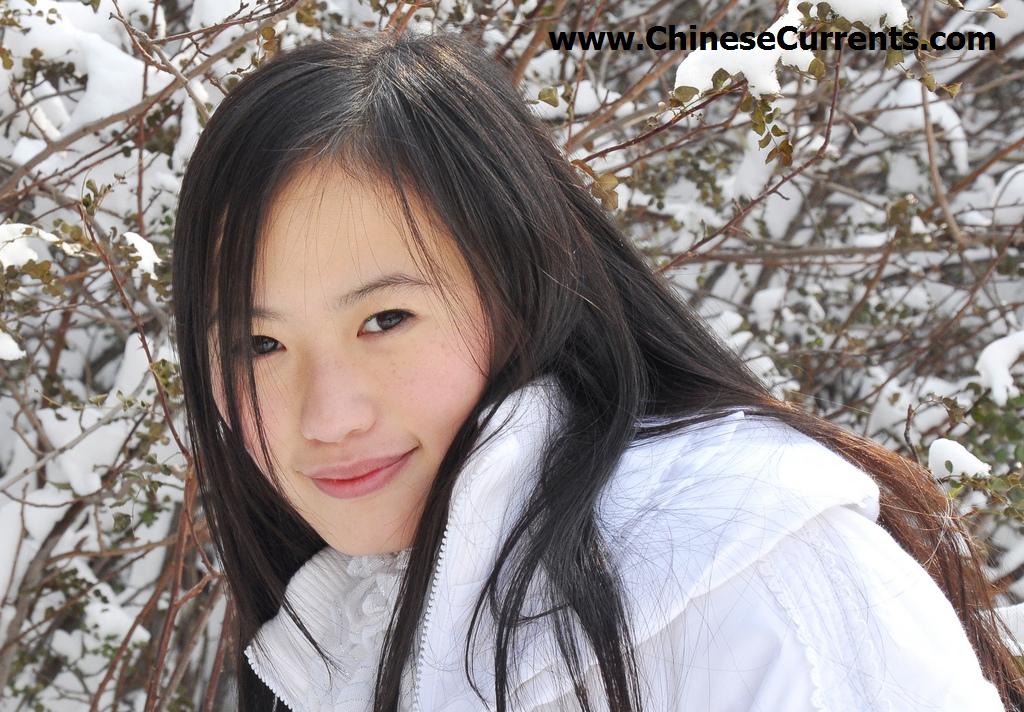
|
| Mirror, mirror on the wall |
Not the ultimate driving machine Wednesday, 21st October 2009; Beijing
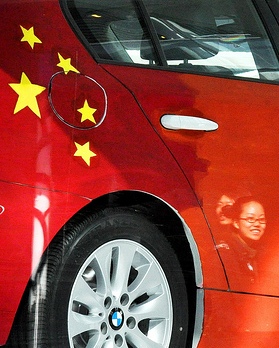
|
| Good idea but dodgy paintwork |
I’ve never
had the pleasure of sitting down with Sir Geoff Hurst and hearing how he scored a hat-trick in the 1966 World Cup final. The
three goals propelled England to their first (and so far, only) world cup victory. However, brand fans may be interested
to read that, 15 years ago in New York, I did have the great pleasure of meeting Martin Puris, the founder and former chairman
of the advertising agency Ammirati Puris Lintas, and listening to him recount the marvellous story behind his creation of
one of the most powerful advertising slogans of all time, “The ultimate driving machine”. In so doing, Mr
Puris scored the copywriter's equivalent of Mr Hurst’s astounding World Cup final hat-trick. This line, written by Mr Puris in the mid-seventies, encapsulated the essence of BMW and, as well as capturing the imagination
of a generation of driving enthusiasts, also acted as a rallying cry for the brand’s designers, engineers, and marketers. The rest, as they say, is history. BMW, a beleaguered brand up until that point, went
from strength to strength to strength.
One of the pillars of the brand was and is its meticulous attention to detail; another was its provenance – Germany,
the fatherland of engineering excellence. So surely BMW, the bastion
of Germanness, couldn’t possibly be made in China? On the contrary, the stellar
sales performance of China-made BMWs has embarrassed the doomsayers who believed that “made in China” would somehow
damage the integrity of the brand and lessen demand. On the contrary, in the first nine months of this year, BMW’s sales in China have increased by about 32 per cent
year-on-year, to around 60 thousand units – most of which are built in the company’s plant in Shenyang, Liaoning
province, where the 3 and 5 series models are produced.
So, if that’s okay, then at what point is a brand’s identity compromised by a cultural
or geographic shift in its identity?
What about the notion of painting a Chinese flag on to a BMW? Surely, that’s going too far? Others may disagree, but I don’t believe that this is going
to change what people think about the brand. That's because BMW has many decades
of German heritage – to the point that, for many, one is synonymous with the other. Painting the colours of the Chinese flag onto a BMW, complete with
its five yellow stars, and showing it off in a glass case on the piazza of one of Beijing’s busiest shopping areas,
will not for one moment make anyone, at least anyone of sound mind who’s ever driven a car, think that BMW is a Chinese
brand. Likewise, painting the Great Wall (and, yes, a
China flag flying over it) on the front of a Harley Davidson – as I photographed a few weeks ago – is not going
to lessen that brand’s association with the United States, Route 66 and, for some, the film Easy Rider. A strong brand needn’t have to worry about
the occasional sortie into unfamiliar territory. The positives gained from improved PR and enthusiastic word-of-mouth (WOM), not to mention the increasingly important
eWOM, far outweigh any possible negatives. That said, I do have an issue with the BMW in the picture. The 'ultimate driving machine' and 'meticulous attention to detail'
sit hand in hand. When looking at the
photographs on this page, please don’t think for one moment that my camera’s colour balance and sharpness are
out, the presentation of the car was, as it appears, nothing short of appalling. In fact it’s one of the worst paint-jobs I’ve ever seen. If it had won third prize in a primary school’s painting contest,
I would be questioning the integrity of the judges. Take a closer look, among other things, at the outside of the fuel-filler cap. Yes, they’ve missed more than a bit. Contrast this with the perfect finish of the artwork that was used on the Harley Davidson I photographed.
Clearly, the Harley was painted in the Harley factory, while this BMW was probably painted by a rogue local dealer or the
dealer's five year-old.
Whoever signed it off should be shown a yellow card, a copy of the BMW brand book, and the
way to the nearest BMW-approved paintshop.
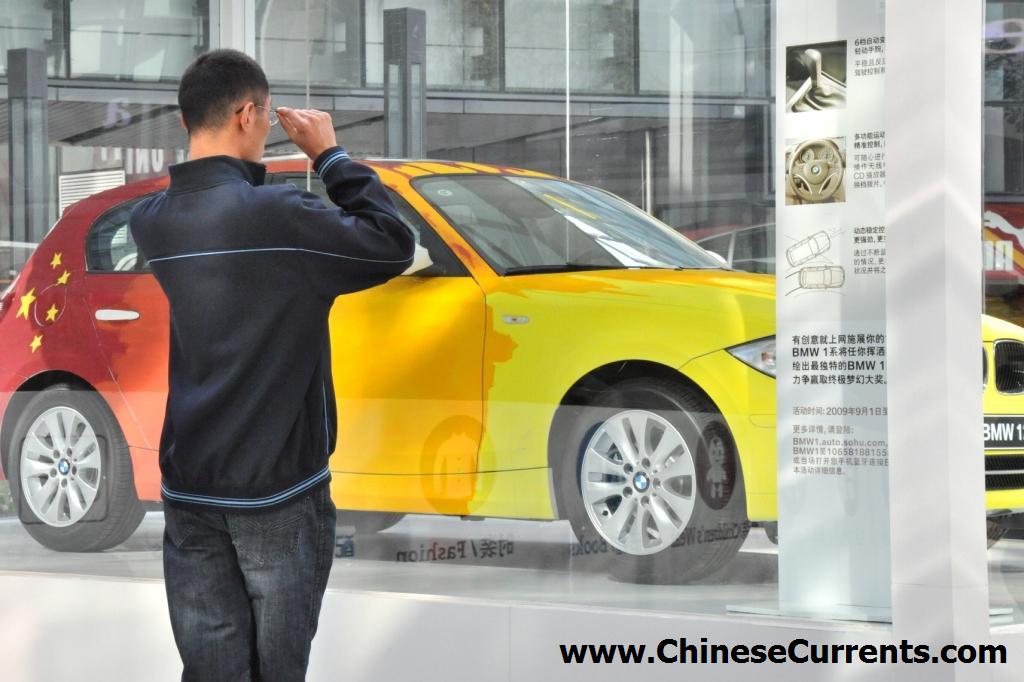
|
| Are my eyes deceiving me? |
Golden Week’s buried gold Monday, 12th October 2009; Hong Kong
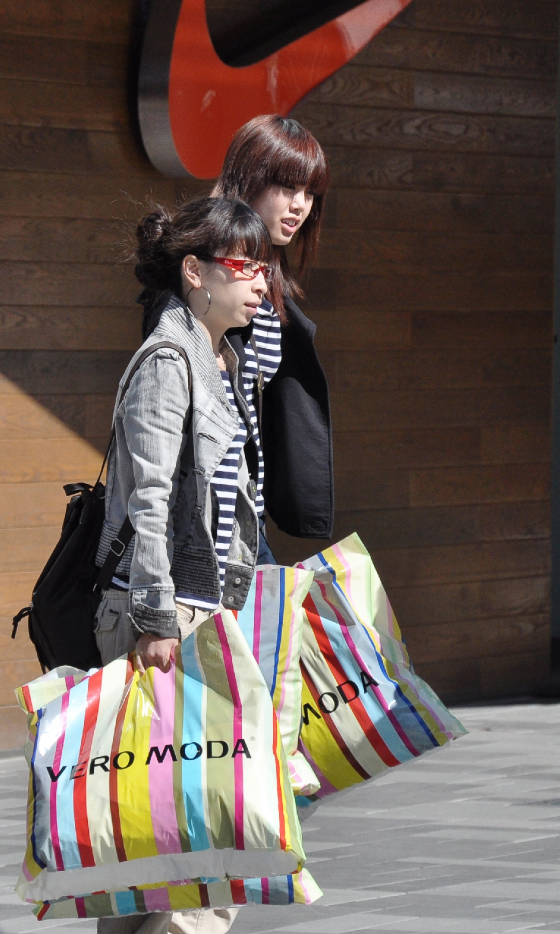
|
| Shopping in Beijing during Golden Week. Next stop Hong Kong? |
I’m in Hong Kong for a few days – all work and no play alas. But,
at least I had a little time today to catch up on some reading and to post an “I’m still alive” message
on to Facebook (which is still blocked on the mainland). Most of my reading material was found during a freestyle surfing session
on Google News – another site that is regularly blocked or neutered by China’s Great Firewall.
Although much faster than on the mainland, it still took Google’s omniscient search engine a few nanoseconds
longer than expected to yield results for my “China retail shopping” search – a sure sign that it’s
a hot topic. But at least the news was worth waiting for. The China Ministry of Commerce has just announced
that retail sales have increased by 18 percent compared with the same holiday period last year, China Briefing reports
today. The so-called “Golden Week” National Day holiday was a day longer this year (The Mid-Autumn
Festival, the date of which changes with the lunar calendar, was added to what would otherwise have been a seven day break),
so the increase is probably not as significant as first appears. Nevertheless, there are encouraging signs
that things are on the up:
The report states that the value of retail sales during Golden Week was the equivalent of 570 billion yuan (US$83 billion).
The biggest increase vis a vis the same period last year was in Guizhou province, one of the poorest areas of China.
There, retail sales grew by 37.6 per cent no less. The second-largest increase was in Chongqing
(32.6 per cent), while Henan made it into third place with 31 per cent. The most compelling evidence that business
is indeed booming was found in Guangzhou, where auto sales “almost doubled”, according to Business Week (7th
October), which cited a Ministry of Commerce nationwide survey of 1,000 retailers that compared
business levels at the start of the recent holiday with those from the same period last year. At a national level, as well as automotive,
the household electronics category did well, as did sales of digital cameras, mobile phones, and jewellery. Tourism is another big “gainer”.
200 million people were classified as domestic tourists by the China Tourism Academy during the Golden Week, a 13 per
cent year-on-year increase. Beijing, thanks to it being the spiritual epicentre of China’s 60th birthday
party, managed to attract the most domestic visitors – 15 million of them and a staggering 59 per cent year-on-year
increase, according to a source cited in the China Journal. The 200 million domestic tourists spent an estimated
100 billion yuan – an increase of 25 per cent. More people may indeed be spending quite a bit more
per capita on domestic trips. But the expenditure is still relatively modest – the equivalent of
about US75$ per person.
These numbers don’t, though, take into account trips to and spending in Hong Kong, Macau and Taiwan.
Taiwan is still at its nascent stage as a destination for mainland tourists (only 11,000 people went there during the
eight-day period), but the people who did make the trip spent heavily – the equivalent of over US$2,100 each.
28 times more than the average mainland tourist spent on the mainland. During 1-7 October, 420,000 mainlanders visited Macau – although it’s not clear
how many of those were also counted in the figures for here, Hong Kong, where (from 1-8 October) there were 590,992 visitors
from the mainland, 16 per cent more than last year.
Most mainlanders were not here to visit Disneyland; preferring instead to spend, spend, spend in the shops.
Their expenditure on luxury goods is particularly significant. In a recently published paper, The Boston Consulting Group reveals that
close to 70 per cent of the buyers of luxury goods it interviewed in Beijing and Shanghai said that they preferred to shop
for these products outside of mainland China. Not surprisingly, Hong Kong, thanks to its close proximity, cultural affinity,
lower sales taxes, generally more reliable product-provenance, and depreciating currency (which continues to be tied to the
US dollar), is the top destination for cash-laded mainlanders. As Hong Kong continues to extend the Individual Visit Scheme (the list of approved cities is generally
linked to the wealth of the city), the number of visitors will rise significantly. This is great news for
Hong Kong retailers of high-end, easily portable goods; but less positive for their mainland counterparts, whose predicament
will ironically worsen as wealth increases. The “second wave” of tourists to countries and
shops in other parts of Asia, Europe and the Americas will make matters even worse. This phenomenon is set to influence the retail strategies
of brands that are premium priced as well as brands that are firmly in the luxury category. To pluck one
example out of the air, Nike shoes are much cheaper at Amsterdam’s Schiphol airport (a key hub), for instance, than
anywhere (legally) in mainland China.
The custodians of the world’s most famous luxury brands have long-since realised that money spent on flagship
stores on the mainland should be thought of as a long term global investment in the brand. In China at
least, it would be wrong to evaluate the stores in revenue terms only. The cash may indeed be registered
on the till of the Guccil store in Hong Kong (below), but the relationship with the brand may well have been cemented in the
Gucci store in Beijing or, perhaps one day, even in Guizhou province. Premium brands should also
be thinking about the future in the same way.
As for mainland China’s retail sales figures… they will increasingly misrepresent mainland consumer’s
actual spending power and influence.
The reality will be much rosier than the numbers suggest, and this gap will continue to widen roughly in line with
the increase in the number of mainland tourists travelling to Hong Kong and beyond. What’s more,
these new luxury-shoppers will increasingly be coming from China’s third and fourth tier cities – the future powerhouses
of global luxury shopping.
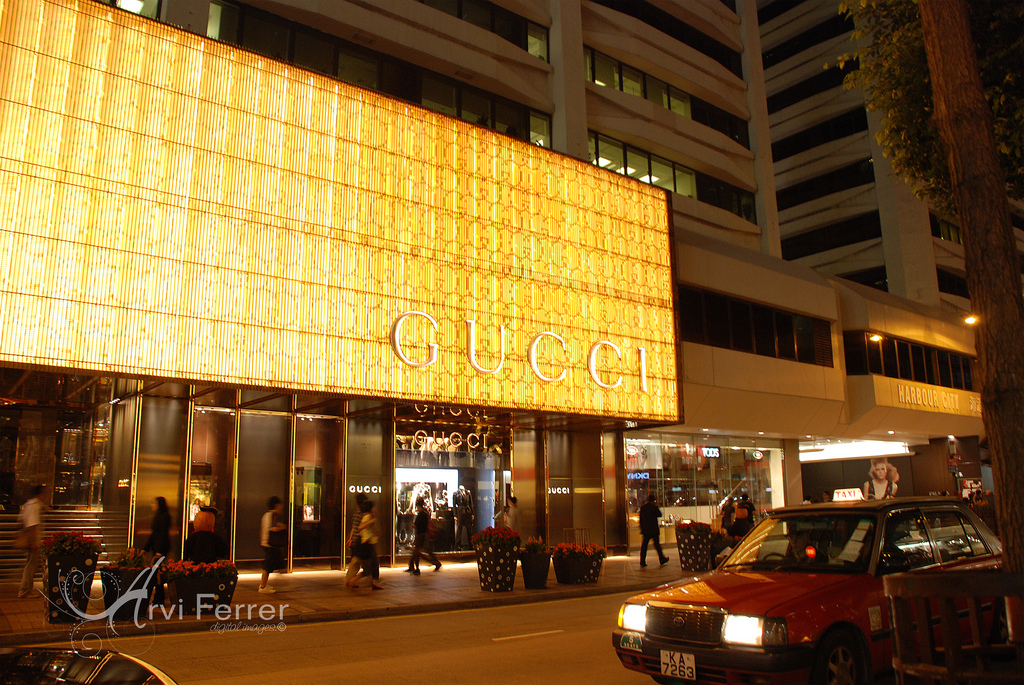
|
| Gucci in Hong Kong. All that glitters is what it seems. (Photo courtesy of Arvi Ferrer) |
Happy Anniversary! Thursday, 1st October 2009; Beijing
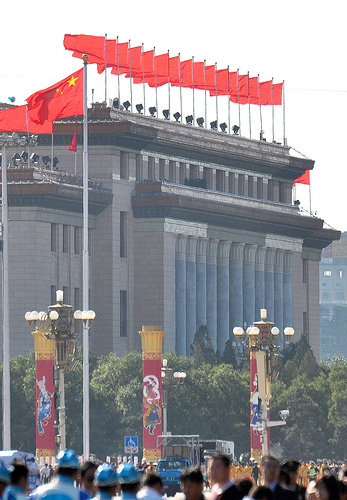
|
| The Red Flag flies in Tiananmen on National Day |
“You won’t be able to get inside the second ring road,” the taxi driver had
told me last night when I asked him about the traffic restrictions in Beijing today. Not easily put off,
I decided that the best way to get close to the National Day celebrations would be to cycle in to the city. My
objective was to get close enough to Tiananmen – the geographic and spiritual heart of the occasion – to be able
to take a photo of the national flag. This, as it turned out, was easier said than done. The day had begun inauspiciously
with a thick blanket of smog that hung around until about 9am. At 8am, I had set off on a wet and very
muddy road – the reported “seeding” of the clouds with silver iodine, to induce rain and thereby clear the
atmosphere of pollution, had had at least some effect. Then, as I neared the city, the veil of low cloud
quickly evaporated and, incredibly, for the first time in many days, the sun began to shine brightly – no doubt much
to the relief of the people who had been given the task of delivering a “blue sky” national day (see previous
article). At
8.45am I was within the second ring road (using a small pedestrian tunnel just in case). Then, after 10
minutes, I hit the first serious road block. Each intersection was guarded by the police; and each hutong
(small lane) was blocked by two or more civilian volunteers, sporting red arm bands, and sitting on small stools.
It took me twenty minutes or so of cycling up and down the road before I found a small alleyway that was poorly guarded.
The volunteers, all five of them, were busy telling an elderly man that he couldn’t deliver the
boxes that were on the back of his tricycle. I raced through the opening that I had spotted and within
seconds had taken a sharp right down a narrow lane. After a series of twists and turns, the alleyway joined
a wider road and, heading west, I was sure I was within the first security ring. The second cordon was harder to negotiate,
but after thirty minutes or so of searching for the right moment, I at last found a breach in the defences, and was through
– and within a stone’s throw of Dongchang’an Jie – the avenue that runs east of Tiananmen and from
where Hu Jintao was to begin his inspection of the troops. But the security here was at a different level,
so I decided to quit while I was ahead and parked my bike outside a restaurant that was close to the junction with Nanchizi
Dajie, at the south-eastern tip of The Forbidden City. Here was parked the coaches that had carried the
VIPs with tickets for the East Grandstand.
A small restaurant, close to the junction, was doing a roaring trade. Groups of soldiers, rotating
every 30 minutes, were dropping in for their meal break. I parked myself at a table at the back and watched
them watching the ceremony on the restaurant's small TV. Jiang Zemin, the former president, who retains
a good degree of influence, was as popular with the soldiers as he was with CCTV, whose cameramen seemed to be torn between
following him and following his successor. The giant portrait of Deng Xiaoping being carried aloft was also well received;
as was the lofted portrait of The Great Helmsman himself, Mao Zedong. Mao had proclaimed the founding of the
People’s Republic of China in front of a crowd that was reported to be in the region of 300,000 people (at the time,
urban Beijing’s population was only 1.65 million). 60 years on and, ironically, Beijingers –
other than the lucky few who made it on to the guest list – can only watch from their armchairs. Then it was time for the air
show. This, at last, was something I could watch live. And what a show it was.
Formation after formation of the air force’s most advanced aircraft blazed a red, yellow, and blue (not sure
why blue) trail across Beijing’s azure sky. The crowd around me were ecstatic; pointing whatever
lens they had skywards. Never have so many Nokias been trained on one single event I mused. From here, I moved on to my next challenge, crossing
a deserted Jianguomen, and thanks to the directions of a man on a child’s scooter, managed to cycle close enough to
Tiananmen to complete my photo-challenge (see above). “What do you think about today,” I asked
him. “Wonderful,” he said, “Beijing has never been so quiet”.
I then spent a couple of hours
trying to penetrate the inner cordon; without success, but it was fun trying. I cycled up to at least a
dozen checkpoints in the alleyways south of the Square. Here, though, they were manned by soldiers
not citizen volunteers. Well satisfied,
I beat a tactical retreat and headed to an Irish pub to watch the evening’s show and fireworks display on CCTV, and
to sort out 60 photos (among the several hundred that I have taken) to post to Flickr to mark my participation,
albeit on the fringes, of a momentous day in China’s history. (The collection of photos can be viewed here.) But what does the event mean to the man or woman in the street? Clearly,
there is a groundswell of national pride and a feeling that China has come a very long way in a relatively short period of
time. 60 years ago, Mao said that the Chinese nation had stood up. Today there
is a palpable sense that it is walking briskly with its head held high.
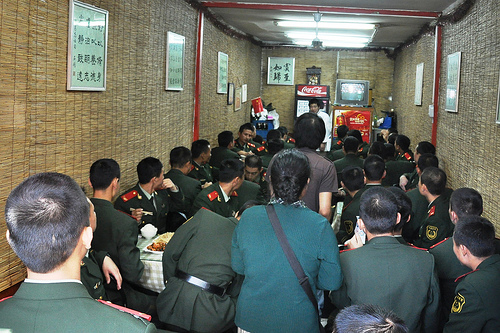
|
| Soldiers watch the ceremony and parade during a break from guard duty |
"Blue sky day" blues Wednesday, 16th September 2009; Beijing
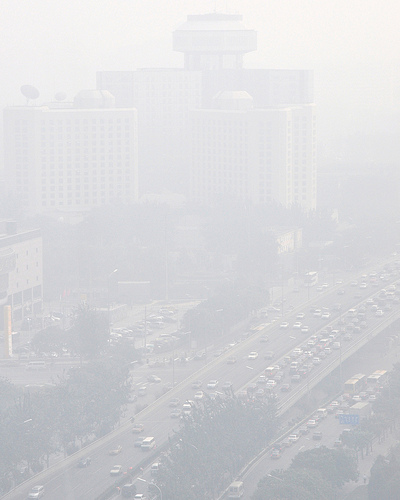
|
| The air quality today is "Good" (API of 95) |
I pushed my bike to the garage door and pressed the button that set the opening-mechanism whirring.
The door had lifted no more than a few feet when I decided that I should take a taxi instead. Cycling
in Beijing can be hazardous at the best of times, but with pollution this bad, it would have been reckless to have cycled
the 12km to my appointment, near to the East third ring road.
I persuaded the taxi driver that he should close all of his windows; despite his protestation that “fresh air”
is good for you. Such is the hardiness of the Beijing taxi driver. Or maybe he had tuned
in to the Beijing Public Net for Environmental Protection, which publishes daily forecasts, and tracks the cleanliness or
otherwise of the capital’s air (their website can be viewed here).
Incredibly, today, which in my humble unscientific view has the worst air quality for several weeks, scores “95”
and is officially a “blue sky day” – a day when the average API (air pollution index) is at or below 100,
and therefore “good”. An air quality score of 50 is regarded as “excellent”, while
300 or more is described as “severely polluted”.
“Blue sky days” were under the spotlight of the world’s media last year in the run up to the Beijing
Olympics. Mindful of the PR significance of a pollution-free Olympics, the authorities went to unusual
lengths to ensure that the air quality during the games wouldn’t provide ammunition to a large section the world’s
media who would have loved to have rained on China’s parade. It’s hard to say whether it was the draconian traffic restrictions
(leading to a significant reduction in car journeys), the closure of many polluting factories around Beijing, or the time
out that was called on the many thousands of construction projects that resulted in a glorious last two weeks of August 2008.
Or maybe it was simply “a change in the weather” that made the difference. One thing
is for sure, there was an awful lot of pressure on the people responsible for delivering the decreed “blue sky”.
The final
score for full-year 2008 was 274 blue sky days. A record number and an incredible tally considering that,
in 1998 – when targets were first introduced – only 100 unpolluted days were recorded in Beijing.
Even more incredibly, it’s looking like 2009 – the auspicious year when the People’s
Republic will celebrate its 60th anniversary – is set to break last year’s record number. The
day that really matters though is the 1st October, National Day, when the live broadcast from Tiananmen and Jianguomen will
be beamed live to the vast majority of Chinese homes. On that day, a score of 95 and therefore “good”
air quality won’t be nearly good enough.
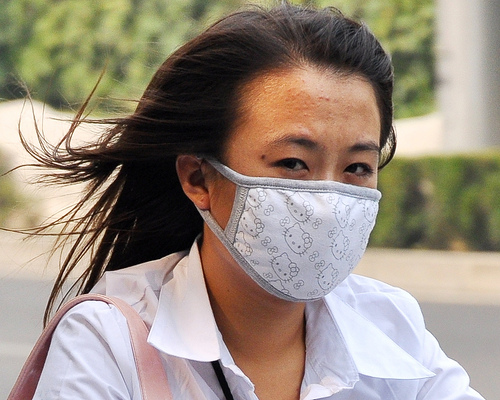
|
| Hello Kitty pollution protection for an electric motorcyclist in Beijing |
. "God bless you!" Wednesday, 9th
September 2009; Beijing
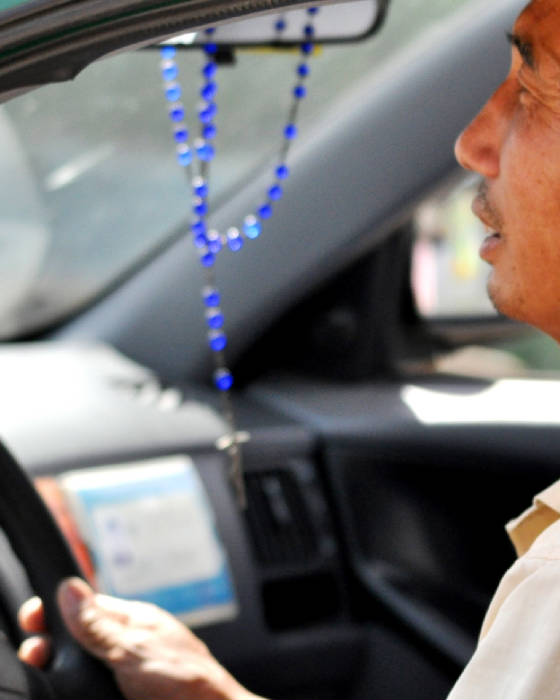
|
| Mr Mao - a recent convert to Christianity |
It had been a long, difficult walk under an unforgiving sun. The track that I had cycled
down only a few months before had been turned into an ant’s version of the Himalayas. Inexplicably, there was only one
man working on the earth-moving project. Shovel in hand, he begrudgingly divulged that “It’s
going to be a highway”. But he didn’t know where it would come from and to where it would go.
I’m a firm believer that, in China at least, there are times when the inexplicable should be left unexplained
and so, without further enquiry, I wished the man good luck. Then, after more than two miles of climbing,
stumbling, slipping and sliding, the obstruction came to an end. As I was descending from the mound to
the level single-track road that stretched for miles, I was thinking that the morning could only improve. It
didn’t.
The next test was the dust. The benign-looking road disappeared each time a car came along –
shrouded in a veil of particulate matter that you could taste and sometimes chew. I knew from my winter
excursions that there would be another two miles of this torture. Missing lunch is one thing; but suffering
long-term respiratory damage is quite another. Even more worryingly, I had promised my wife a leisurely stroll by the river. Then a miracle happened. The noise of the car approaching
from behind made me take a deep breath – thinking that it would create a cloud of dust in its wake. But
that didn’t happen. I could hear it screeching to a halt and, turning round, I saw a sight that was
medication for my sore eyes.
A Beijing taxi!
The surreal was cranked up a notch when he began flashing his lights, smiling, and waving excitedly. These
days, it’s rare to see a welcoming taxi-driver in Beijing, and here we were in the middle of nowhere being rescued by
the most welcoming driver I’d seen for years.
We entered the air-conditioned oasis, and the surprises just kept coming. In English, the taxi-driver welcomed us with
a cheery, “Hello; Welcome to Beijing; God bless you!”. I had heard the “Welcome to Beijing”
greeting many times – it must have been lesson number one in the English-language course given to taxi drivers last
year to prepare them for the Olympic-tourist influx. But the “God bless you” sounded odd to
say the least. I then noticed he had a rosary with blue beads and a small, silver crucifix dangling from
his rear-view mirror.
He drove fast, swerving around the “speed-calming” humps that were at intervals of about 100 yards, while
recounting his story (in heavily-guttural Beijing Mandarin):
“I’m a Christian. [big swerve.] I go to church every Sunday… to the big church
near to Dongfeng Qiao; where I listen to a European priest [even bigger swerve]. I don’t understand
anything he says… because he speaks in English, but I really like the feeling. It gives me a kind of calmness
I’ve never had before." [screech of the brakes, followed by a massive swerve, which caused the car to be enveloped
in an ethereal cloud of dust.]
Now I must admit to have been a little puzzled by Mr Mao's account of “thousands” of locals freely worshipping
at a church in Beijing each Sunday. I had thought that Chinese nationals were not allowed to hear foreign priests deliver
sermons. The River of Grace Church, for instance, notifies would-be attendees of the restriction that,
“Currently due to local government regulations we are only permitted to admit foreign passport holders to our church
services.”
But it seems that Mr Mao’s church – Chaoyang Church (photos here) – is a beacon of progressiveness when it comes to the freedom to worship in China. In 2006, it
was the venue of the first ever sermon to be given in mainland China by Rowan Williams, the Archbishop of Canterbury (which
can be read here); and the church has a string of other firsts to its name. Chaoyang Church has its own website (which can be viewed here – in Chinese); and its own hotmail address – cychurch@hotmail.com. There’s even a bilingual advertisement on its site, which lays out the requirement for the volunteer
team it is seeking to recruit:
“There are often over four thousand people who attend Sunday services in Chaoyang Church. So
we need people to be responsible for receiving and serving this large number. For this reason, Chaoyang Church has organized
The Volunteer Team. Their assignment is to be in charge of greeting and receiving new people who attend Sunday services as
well as certain security issues and watchfulness of other urgent matters. All of them have pure faith, and have for long period
of time trusted in God. They love God, their country and other people. They are willing to devote themselves to Jesus Christ
and to show the Glory of the Lord.”
It is clear from the words and also from reading between the lines that Chaoyang Church is Beijing’s showcase
church and that the administrators of the church are working hard to ensure that it stays that way. When the dust cleared I saw that we had at
last reached the main road. Mr Mao continued his sermon: He told us that he couldn’t
rely on anyone to care for him and his family [he is married and has a 16 year-old daughter who goes to high school in Shunyi],
and that’s why he had turned to God.
He is a recent convert. Six months ago, an old teacher, with whom he has kept in touch,
returned from The US and showed him the light. “That’s a gift from her,” he said, pointing
at the rosary that was bouncing violently as he took a right turn at speed with one hand on the wheel. Mr Mao slammed into third gear while continuing his story: “Before I was a Christian, I used to be in a
bad mood a lot; and this affected my driving… …I
used to be an aggressive driver”. Within minutes we were
at our destination, and in plenty of time for the promised pub lunch. I shook Mr Mao's hand and thanked him for delivering
us from the back of beyond. He happily agreed to pose for some shots, before bidding us farewell with his
trademark cheery wave, and the standard Beijing farewell,"Man
zou" ["Go slowly"].
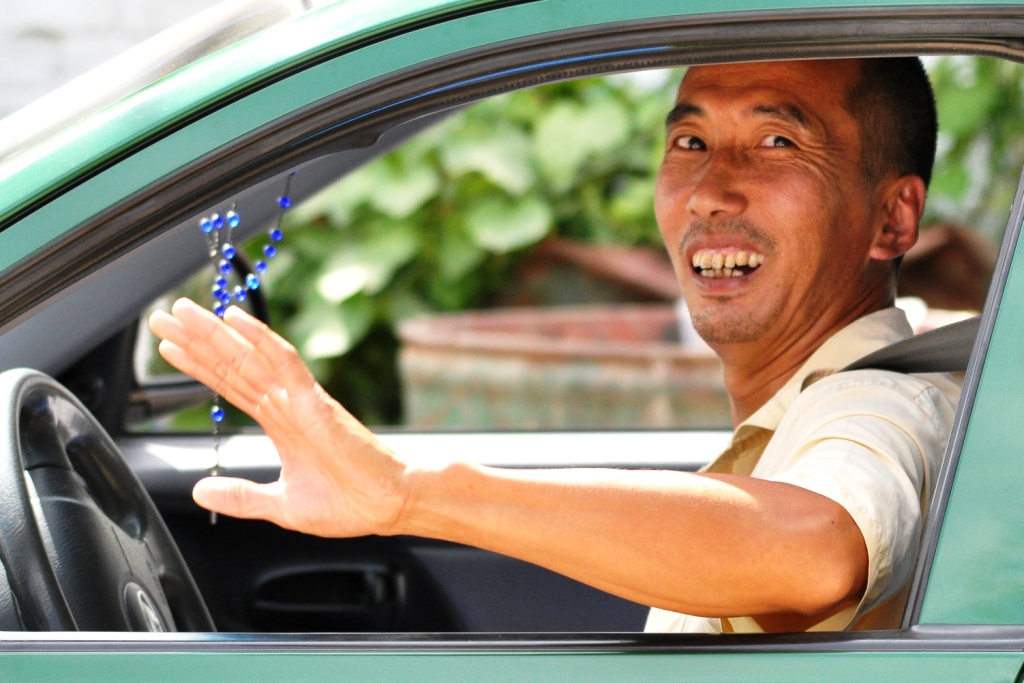
|
| "Man zou", says Mr Mao ("Go slowly") |
. Forbidden Fruit Wednesday, 2nd
September 2009; Beijing
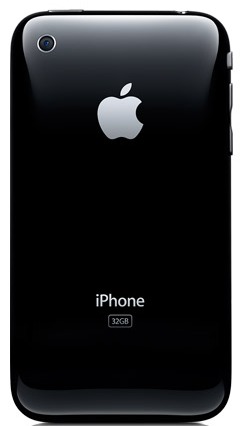
Ms
Zhou had of course heard the news that the Apple iPhone would, at long last, be launched in mainland China. But
she didn’t appear to be overly excited at the prospect. “I already have one of
those,” she told me, “The eight GB version”. She and a million or more other purchasers of iPhones in
mainland China bought their phone in the full knowledge that the people selling it were not able to provide a manufacturer’s
warranty or any kind of official receipt. If it had broken down the next day, Ms Zhou would have
had to have relied on the word of the man she had bought it from – one of the many unofficial iPhone sellers in Zhongguancun,
Beijing’s biggest electronics marketplace – that he would replace it. The seller, let’s
call him Mr Ping, had actually promised her a three-month warranty; and, as well as appearing trustworthy, he had offered
the most competitive price (of the ten people selling iPhones within a few yards of each other), and had also thrown in a
couple of “free” applications. So, satisfied she had got the best deal possible, Ms Zhou
had handed over her hard-earned 4,500 yuan, and hoped for the best. Why trust Mr Ping?
Well, the iPhone is much more than a phone of course. For a high percentage of the million or more
owners of a shuihuo (smuggled) iPhone in China, it’s an important fashion statement. Thanks
to the power of the Apple brand, they are willing to take the gamble of trusting the Mr Pings of this world. Apple, whose global
business model for iPhone relies on revenue-sharing schemes with approved operators, has taken the trouble of installing locking
software that is designed to stop the phones being sold on the free-market (theoretically, the device only works with SIM
cards from operators who sign a revenue-sharing agreement). However, this is China and consumer demand
tends to be satisfied one way or another. So, the entrepreneurs in the supply chain have worked out a way
of ensuring that all of the smuggled phones here can accept whatever SIM card the buyer may already have. The reality is
that the vast majority of iPhone users (perhaps as many as 90 per cent of them) are using a SIM card from China Mobile, the
world’s biggest mobile phone operator. It’s not surprising, then, that China Mobile didn’t
welcome Apple’s revenue-sharing proposition with open arms. Reportedly, they walked away from the
deal because Apple wanted significantly more of the revenue than the Chinese operator was willing to concede. Let’s
do the sums: China Mobile has been receiving… let’s see… yes… 100 per cent of
the revenue from a million or more iPhone users…. so… Okay, I’ve conveniently sidestepped
the point that a significant increase in sales of the official iPhone is likely to push up the average spend per (premier
league) user; but nevertheless I think it’s fair to say that Apple’s negotiating position has been undermined
to say the least.
From Apple’s perspective, the silver lining in this particular cloud was painted by the Chinese government, who
decided that China Mobile would be given the Herculean task of turning TD-SCDMA (“TD”) – China’s home-grown
3G platform – into a success story; and that the much-smaller China Unicom would be given the tried and tested global
3G technology to play with – the very same platform that the iPhone has been designed to run on (it would take a significant
and expensive hardware redesign for iPhone to work on TD, the home-grown China platform). The awarding of TD to Goliath
and the global platform to David is a very innovative way of levelling the competitive playing field to be sure.
It also ensures that the politically important “TD” is given the best possible chance to succeed.
(Talking of levelling the playing field and innovative solutions, it’s perhaps worth mentioning that –
a few years ago – the government decided to job-swap the CEOs of the two companies in an effort to make Unicom more
competitive.)
There’s no doubt that TD’s success, when it happens, will be held out to be another shining example of
national achievement in the field of science.
With so much national pride riding on the platform (and also mindful of the recently announced 42 per cent fall in
half-year profits) it’s not surprising that Unicom has been keen to conclude the deal with Apple. Well, you can
stop holding your breath, because according to numerous reports a “three year” deal has finally been struck.
Beyond that, it’s all a bit hazy – as you would expect from Apple, which rarely talks about its product
or business plans and from where little, if anything, leaks. The Apple omerta – its Mafia-like code of silence – is such that details are likely to stay hazy even after the official China
launch, whenever that may be.
The only thing I do know for sure is that, as well as thinking about how many iPhones they will sell in China in Q4
of this year or in full-year 2010, they should be sparing more than a thought for Ms Zhou and the numerous other highly-influential
first-wave purchasers whose relationship with the Apple brand has been strained: Ms Zhou took a
deep breath before summing up her frustrations: She has not been able to use MSN, because she couldn’t
easily download the application (this has to be bought from Apple’s application store in the US she told me); she has
not been able to use QQ, China’s most popular instant messaging platform, because there isn’t an application available;
she has grown tired of having to use her computer to transfer music from her iTunes library; she can’t transfer her
contacts’ details from her old Nokia; and she can’t even use the ringtones she wants to. In
summary: the phone has worked fine; but the glow of being seen to be a fashion leader was soon blanketed by a mist of frustration. Now, I am sure
there are a few techies who will read this while shaking their heads and shouting out the names of the various software solutions
that would solve Ms Zhou’s problems. But the point is that the vast majority of people who are using
the iPhone in China really have no interest in spending hours on researching and implementing “ways around” the
various Apple-installed roadblocks that presently exist. For the vast majority, therefore, it’s all a “too much
trouble”, so they either resign themselves to the inconvenience or do what Ms Zhou did – she put the iPhone in
the draw and went out to buy a Nokia. She still uses the iPhone occasionally though.
“It’s got a great camera,” she says, “I sometimes use it to take photos.”
Another disillusioned iPhone user, Ms Yang, puts it like this: “Everything is free in China, except
if you use an iPhone; then you even have to pay for ring tones.”
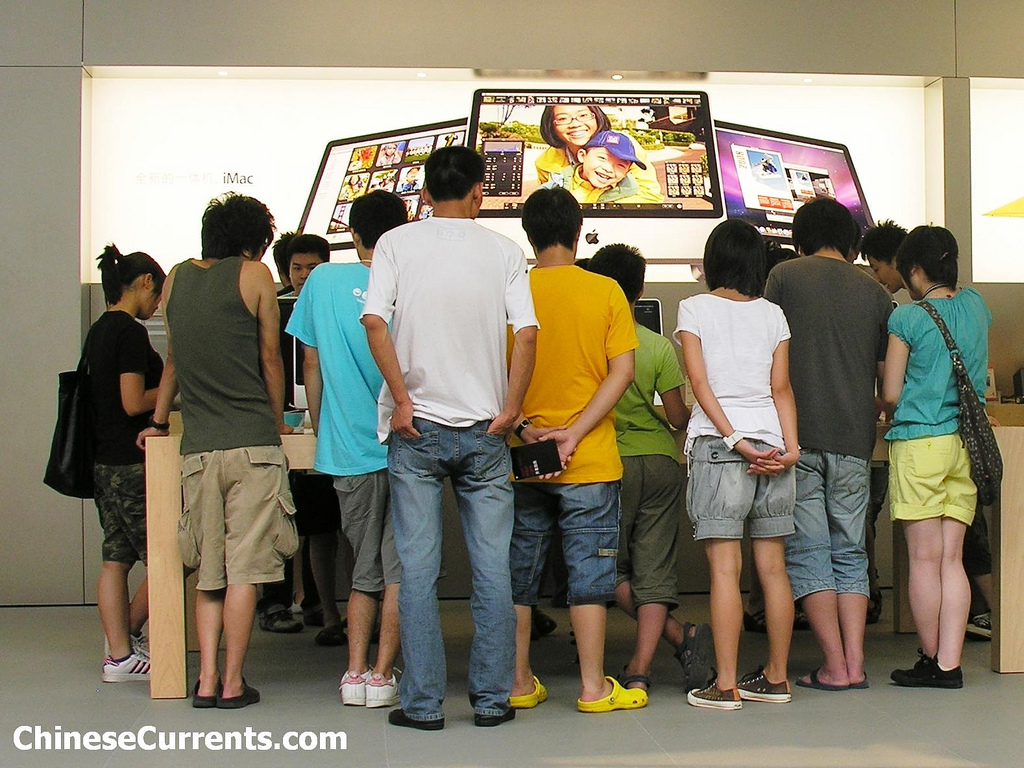
|
| Just when will the iPhone make its debut at Apple's flagship store in Beijing? |
. Ronaldo is back in China Wednesday, 26th
August 2009; Beijing
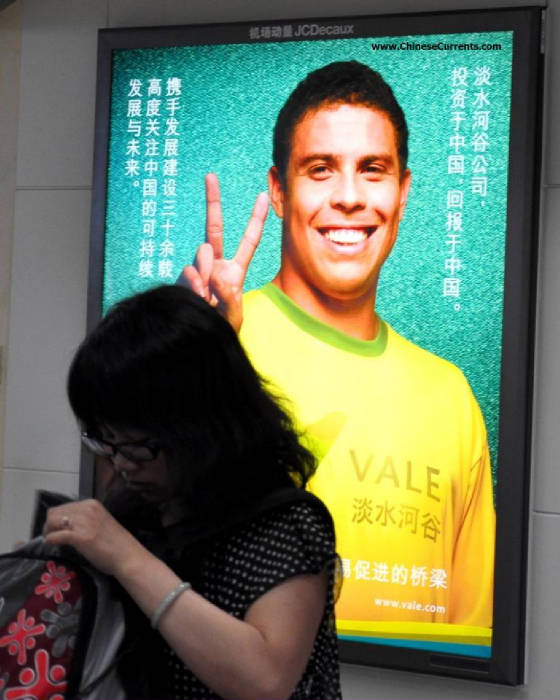
|
| Ronaldo, playing again in China |
The scene has been played out a thousand times before. The
indignant player runs up to the referee who has just awarded a penalty, pleading “I handled it accidentally!”.
The shout is heard usually within a split second of the official pointing to the spot. But, for some reason
Ronaldo Luís Nazário de Lima (thankfully, better known as Ronaldo)
took more than three years to signal his protest. Britain’s
Guardian newspaper reported in January 2007 that, “According to a series of Chinese papers, the Brazilian striker
innocently posed holding a packet of Golden Throat Lozenges [at you might] at a dinner in Beijing in September 2003 when he
and his Real Madrid team-mates were touring China.” The report goes on to say that Ronaldo would be commencing
legal action against the company. However, while Ronaldo was pleading his innocence ("Accidental,
Ref... honest!"), a spokesman for Golden Throat Lozenges was crying “foul!”: YWeekend, the website
of the Beijing Youth Daily, reported that the company was claiming that it had paid Ronaldo US$300,000 for the right to use
his image. Whatever the facts, despite the implausibility of the association, Golden certainly went
full-out to leverage the Ronaldo brand, which was then close to the height of its powers (not coincidentally, Ronaldo
was near to the bottom of his weight range). A TV commercial and a long-running poster campaign, featuring
the same trademark grin, ensured that the brand from Guangxi was catapulted into the spotlight. For followers of English football, this
would be akin to Darlington (a club presently languishing at the bottom of the fourth division with zero points) hiring The
Special One, Jose Mourinho, and getting into the Premier League (in terms of publicity at least). What happened after the flurry of accusations
is a mystery (to me at least). What I do know is that, earlier this year, in China’s far-flung province
of Yunnan, I saw a poster for Golden Throat Lozenges with a smiling Kaka – the latest Brazilian Footballing King
(as well as Golden's newly-crowned Lozenge King). I saw the
same poster design in Guangzhou a couple of months ago, on the side of one of the city's buses (this time I had my camera ready
– see below). The King is dead, long live the King; but that said, it’s far from clear whether
Golden got rid of Ronaldo because there was indeed a legal dispute; or simply because he had become yesterday’s
star. Nor is it clear whether Kaka has been paid for his services, or if it’s another “accident”. Talking of Golden…
the incident involving “Golden Balls” (aka David Beckham) is far easier to fathom. Earlier this year, a
Chinese company decided that he and two other alpha males would be the perfect spokespeople for their Viagra rip-off
brand, USA Selikon. Video footage of Becks playing football is intercut with scenes of him with his wife, Victoria
(aka “Posh”), and rounded off with a Chinese voiceover that purports to be Mr Beckham thanking the brand
for being the secret weapon with which he can satisfy Victoria. The TV commercial, which is attached here, then jumps to Sean Connery, who tells the viewers that, despite turning 70 this year, "with the help of USA Selikon
capsules", "Barbara" praises him "for still being The James Bond, forever 25”.
Yesterday was actually his 79th birthday (a belated Happy Birthday, Sir Sean!) and the name of his wife is not Barbara,
but, hey, why worry about the details. Dressing up as a gladiator for Pepsi is one thing,
but I’m sure that Mr Beckham draws the line way above lending his image to impotence-beating capsules. It
goes without saying that no such deal was ever made; it’s also clear that Selikon, the would-be famous brand, has not
thought this through very well. Putting the legal niceties to one side for a moment, the implausibility of the association
is such is that no viewer in their right mind would believe that Becks and Sir Sean would have actually endorsed the product.
Indeed, according to Victoria, Mr Beckham would be the last person to need such medication: "I'm proud to see
his penis 25ft tall," she reportedly told a US chat show host, referring to the series of super-size posters on which her husband flaunts his revealingly-tight Emporio Armani underwear. Trust plays a pivotal
role in the relationship that people have with brands, particularly those brands that are ingested, so you have to conclude
that Selikon (Sell-a-Con?) has shot itself in the foot, or perhaps a bit higher. But what of Ronaldo? Well, these days he’s playing for the Brazilian
side Corinthians, and trying hard to win back his place in the national team in time for next year’s World Cup
in South Africa. He’s also looking a lot trimmer than he was. In case you are thinking that his slimmer
waistline is thanks to dietary discipline and a rigid fitness regime, then think again. If the report on the Xinhua
website on July 30th (in which they quote Globo Esporte, a sports website) is accurate, then Ronaldo’s tummy-tyre
actually disappeared in less than one hour during a liposuction procedure, during which 700 millilitres of blubber were removed. There are countless football fans who would love to see Ronaldo, who is perhaps
the greatest player of his generation, return to the world stage. These days, he has another supporter, a corporate
one, which will also be praying for a miraculous (he'll be 33 next month) return to the Brazil team that goes
to Africa (where it has a significant commercial interest). Africa may be a destination too far for him,
but at least he's made it back to China: Last Friday, I
was passing through Shanghai’s Hongqiao airport, on my way back to Beijing, when I noticed the familiar trademark
toothy grin. Wearing a lookalike Brazil shirt, Ronaldo was holding out the two-fingered V for Victory sign (or
at least that’s what I thought it meant). Had he and Golden kissed and made up? A closer look revealed that
he has actually signed for a new sponsor, Vale, a Brazilian mineral-mining company.
As well as the poster (above), Ronaldo appears in a television commercial for the China market, which can be viewed
on on CCTV2, as well as Vale's own website. Ronaldo's "win-win" message is that: “Vale is investing in China and is also repaying China”
(it has bought lots of Chinese cargo ships among other things). Vale is the world’s
largest producer of iron-ore and is an increasingly important supplier of that vital mineral to China, so good public relations
are clearly an important part of its China-strategy. Although, it has to be said, the vast majority of the millions
of people in China who will be exposed to Vale’s “aren’t we wonderful” message will have no interest
in the company whatsoever (when was the last time anyone went out to the shops to buy a bag of iron ore). The target for the airport poster of course is the one in every hundred or so thousand people
passing through Hongqiao who is, in some way, involved in the negotiation of the price of iron ore. Bloomberg reports that, following seven months of inconclusive talks, China has dropped its demand that Vale reduces its price by
45 per cent, and is targeting 35 per cent in the next round of negotiations. It's impossible to gauge whether the
PR campaign is working; or if the controversy surrounding Rio Tinto, one of its two main competitors,
is the more important factor in determining China's new negotiating stance. Whatever the cause, after so much talking, and with so much still to be said, Vale must be hoping
that the China representatives are fans of Golden Throat Lozenges.
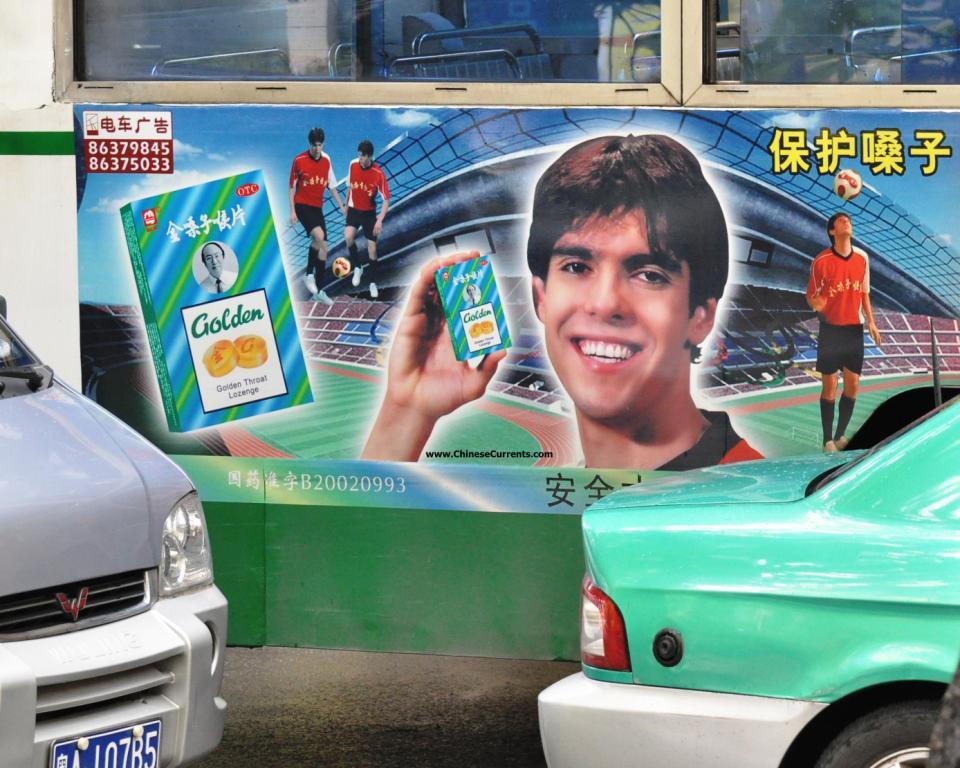
|
| Kaka, Brazil's undisputed Footballing King, not to mention Golden's new Lozenge King |
* Master Class Tuesday, 18th August
2009; Beidaihe, Hebei
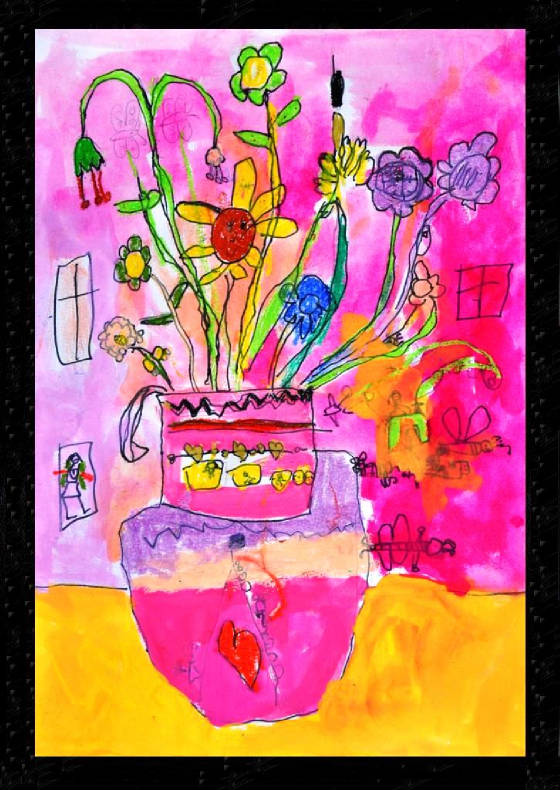
|
| From stick characters to this in five easy lessons |
Hanli Zheng greeted me
with a warm handshake and a beaming smile. “Good to meet you,” he said, “…come
inside and have a bottle of water”.
I had heard great things about Mr Zheng: wonderfully talent artist; distinguished professor of art; gifted teacher;
and great with kids.
Zhou Zhou, who is five years old, is a big fan of his. “I love going there [to Mr Zheng’s
summer art school], it’s great fun and the teacher is really cool.” Before her five-lesson
crash course in art at Mr Zheng’s, all of Zhou Zhou's paintings contained stick characters with round heads and big
smiley faces. After a dozen or so hours of tuition from Mr Zheng and his wife, Ms Wei, she’s gone
from matchstick men to the attached Van Goghesque masterpiece. The burning
question I had to ask was: Why does someone whose work now commands five figure reserve prices in European auction houses
teach art to small groups of five to eleven year olds in his summer school in Beidaihe, a small town in Hebei
province?
Mr Zheng’s face lit up. “Why?!” he beamed. “It’s
because I just love to teach children. They are so open to doing new things”. And how does teaching small children compare with
teaching young adults? “I
can be absolutely straight with the young ones… I can tell them what I think in a direct way, without needing
to dress up the words.”
Mr Zheng’s love of children is apparent in his sensitive depiction of them in some of his paintings; many of
which feature auto-biographical scenes from his childhood in a remote, small mountain village in Dongbei’s [Manchuria’s]
Jilin province, very near to the border with North Korea.
It was there that he developed his love of art. Somehow his talent was spotted and he was able to
progress through the system all the way to study art at university in Changchun. Then the army came calling. He was signed up by the army’s
entertainment division, which toured the region’s bases, performing song and dance (with revolutionary verve and propagandist
scripts no doubt). Mr Zheng smiles at the memory of this. “The army and I didn’t
really get on… we had a different way of thinking,” he says with a glint in his eye while
gesturing to the long black pony tail that has been his trade mark since he was (honourably) discharged. On leaving the army, Mr Zheng took up a post
as a teacher at Yanshan University (where he met his wife), in Qinhuangdao, Hebei province. After several
years there he was awarded a professorship. Although he loves teaching, he most enjoys the time in his
studio painting or sculpting.
I asked him about the future and what he dreams of doing. More than anything he would like to exhibit
his work in the great art cities of Europe. But before he does that, he dreams of fulfilling a boyhood
ambition by travelling there to study the great artists that have inspired him. He lists Michelangelo,
Picasso, Turner, Hogarth and – I wasn’t surprised to hear – Van Gogh as his favourites.
As he
talks about this “dream trip” his eyes light up again. He talks animatedly, in short, sharp
sentences, that are punctuated with smiles of wonderment. It’s as if, as a boy, he were being asked
“what would you like to do when you grow up”. In a word, Mr Zheng, then as now, wants to “explore”
– and, of course, to savour every moment while doing so. He sees the world with the eyes of someone
who is in awe of the wonderful things that can be discovered. Even when he talks about topics that the
vast-majority of grown-ups would consider mundane, Mr Zheng exudes excitement. It’s this boundless
energy and enthusiasm that his young pupils can readily empathise with. Mr Zheng takes his place among the small group
of young children. “Right!” he enthuses, “What are we going to do today?!”.
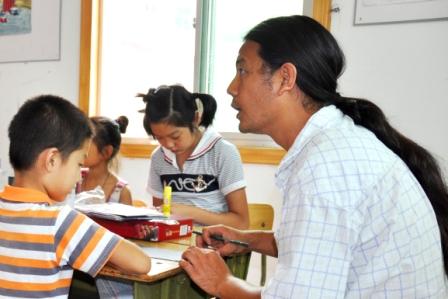
|
| Mr Zheng and some of the lucky children who have been signed up for summer classes |
. Watch with Mother Saturday, 8th
August 2009; Beijing

|
| Dad!? Postman Pat's been kidnapped!! |
I have just returned from a
month's holiday in England. After the heat and humidity in the oven that is the Beijing summer, the cool temperatures
and brisk sea breezes were blessed relief. There's nothing quite like a walk on a Norfolk beach to invigorate
the soul. What's more, after returning from my morning walk and turning on the computer, I would be treated
to yet another breath of fresh air. Open access to YouTube and Facebook no less! YouTube is fantastic for young children. There are many
really wonderful "learn to read" videos; and of course old favourites, like the entire Tom and Jerry library and all
of the other cartoon classics. It's not that I'm against my five-year-old's favourite, Ben 10, a modern-day cartoon
super-hero (who's also blazing a trail in China), but I can't help thinking that the children's programmes I watched
when I was a kid were, well, much better (not to mention far less violent). So, if you want a trip down memory lane
while giving your kids a treat at the same time, then YouTube is the place to be. As a young kid in the 60s, my first memories of television
are of watching Watch with Mother while eating mince pies. Watch with Mother was the BBC's flagship children's
programme of the 1950s, 60s and early 70s. You'll be pleased to know that the early editions of it (copyright expires
after 50 years in Britain) can be found on YouTube. So... with a tip of the hat to the BBC, I'm
sure you are more than ready for me to get to the point of this article. But before I do, please allow me to ask
a question: Are you sitting
comfortably? Yes? Then I'll begin: Once upon a time there was a magician who
could make words and images disappear. The Empress of the Land at the Centre of the Earth heard of the magician’s
power and, fearful that these things could pervert her beloved children, summoned him to her palace. “You are commanded
to rid this land of harmful intangibles,” said the assistants of the courtiers appointed by the minister who had been
handed the Matriarch’s proclamation. The wily magician thought for a moment before conjuring up a
figure from thin air. “This kind of magic doesn’t come cheap,” he said, rubbing his hands
together. “I will need 40 million grains of gold – paid in advance of course”.
The officials did their sums and enthusiastically agreed that any price was a small price to pay for keeping the country
harmonious and Mother happy.
Making words and images disappear (or “green-damning” them if you would forgive the pun) is one
thing; but not nearly as impressive as removing an entire country from the lexicon. That requires very
powerful magic indeed. But, the signs are that the trick to beat all tricks has been pulled off.
If you are in China, try searching for news about the country that, up until 1990, was called South-West
Africa on a local search engine and you could be forgiven for thinking that the place has disappeared off the map –
which is odd considering that the said country is an increasingly important importer of Chinese goods and equipment. Google China’s graph
showing the number of news stories that include the country’s name, flat-lined in July and thus far in August.
And, what’s more, if one tries to access China-related news about the country on the English language
version of Yahoo (which, unlike the English version of Google, conforms to the protocol requirements of local search), then
you will get no further than the all-too familiar error message “Internet Explorer cannot display
the webpage”.
Blogs and current affairs websites that flout the unwritten rules and publish “undesirable word
combinations” run a very high risk of being “disappeared”. So, given that I write in
China and am read by a loyal Chinese following (thanks Mr Liang and Miss Ma, much appreciated), I hope you
can forgive my clumsy efforts to tiptoe around this issue (proving once again that self-censorship is the most effective
form of censorship in China). Suffice to say that the followers of south-west African current affairs will
of course know why Mother is not sitting comfortably. Expunging country “X” from search
engine results is the latest eddy in China’s ever-fluid censorship protocol. As recently as two years ago, even
a popular British children’s Internet site, Cbeebies, was blocked. For those of you who think that
Bill and Ben, Andy Pandy, and Postman Pat are stalwarts of morality who would never conspire to threaten social harmony,
I urge you to put yourself in Mother’s yellow slippers. As any British five year-old could tell you,
“Cbeebies” is a cunning encryption of “Children’s BBC”. From the early days
of the Internet, the BBC was identified as a subversive public enemy and consequently any Internet
page – Wimbledon coverage, woman’s hour recordings, proms concerts and even the shipping forecast – that
included “bbc” in its website address (URL) was automatically blocked. Last year, in a determined effort to be seen to be honouring
the “censorship free Internet” commitment it had given to the International Olympic Committee (IOC) when pitching
for the 2008 Games, the BBC and many previously blocked websites were unblocked. Other beneficiaries included
Wikipedia and Google (both of which, up until then, had frequently fallen foul of the unwritten code of conduct).
Today is the
anniversary of the opening ceremony of the Beijing Olympics and, in respect of Internet openness at least, the
first year's report card isn't looking good. On the plus side, the BBC's website and Wikipedia are still
up and running, but many other websites have been far less fortunate: Access to Google news (non Chinese
versions, whose web crawlers are – unlike Yahoo’s – unleashed outside of China) is frequently disrupted
(presently the search function doesn’t work and the photos, videos and graphics don’t appear). Google’s
YouTube was disappeared in March (around the time of a sensitive anniversary) and hasn’t reappeared (my five-year old
is most upset and wants to know why).
At this point, please allow me to clear something up: If you are reading this website in China, you may
be wondering why the video section of this website doesn’t show any videos. The reason is that they
are linked by html to YouTube, and if YouTube isn’t available, you can't see videos on this site (hence the
numerous "holes"). May saw the arrival of an even more sensitive anniversary and, not coincidentally,
down went Gmail and Flickr for a while. It is also clear to anyone who gets out of bed and visits the toilet in the morning
that the recent disappearance of Facebook and Twitter is firmly connected to events in Xinjiang.
A by-product (conspiracy theorists may disagree with this analysis) of all of these disappearances, reappearances,
and further disappearances is that many home-grown (and therefore home-controlled) social network sites are now regarded by
viewers, and the advertisers who chase them, as bastions of continuous connectivity, which is of course a crucially important
ingredient for the success of any social networking site.
Indeed, numerous Facebook and YouTube look-alike local channels must be laughing all the way to the bank.
As for
the China businesses of the international social-networking brands that created the concepts, I would be very surprised if
they are sitting comfortably. I would be even more surprised if any of them lived happily ever after.

|
| Sorry children, there's no watching with Mother on YouTube |
. A fistful of Chinese dollars Wednesday, 1st
July 2009; Manila, The Philippines
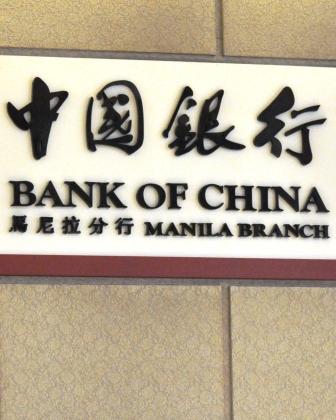
|
| Respite from the heat, humidity, and noise |
“Could I change
some Chinese money please?”
“Only if you have a bank account with us.”
The same question and answer were repeated half a dozen times in an hour as I toured Manila looking for somewhere,
anywhere, to change a fistful of renminbi into the local currency. Then I had an idea. I remembered seeing a Bank of China, just
around the corner. Or was it the second corner? After 30 minutes of going backwards
and forwards in what I can best describe as sauna-like humidity, I found it. The cool air inside was a blessed relief. As was
the lack of customers. No ticket machines. No queues. And plenty
of staff. None of whom looked up.
The guard helpfully pointed me in the direction of a desk, behind which sat a late twenty-something lady of Chinese
extraction. She wore a red dress and a pretty white silk blouse with a rounded collar that was at odds
with her hard expression.
“Could I change some Chinese money please?” “Only if you have a bank account with us.” “I do have an account with you,”
I said triumphantly.
The lady looked at me with more than a hint of scepticism – it was a fully fledged scowl. “Where’s your bank book?” “I’m
afraid I don’t have it, I’ve left it back in China” “In China?” “Yes, I bank with you in Beijing”. “In that
case, we can’t help you.”
“But I have an account with you, the Bank of China. Please help
me.” “I
will have to ask the manager; let me have your passport” The lady took my battered book from me without
a smile and went upstairs.
In the ten minutes it took for her to walk back down the stairs I reflected on how wonderfully serene this outpost
was – a marked contrast to the frenzy you would be swallowed by at a mainland branch. The lady returned, and she had good
news. “Okay,”
she said, “How much would like to change?”
“4,000 yuan please”
“We can only change 2,000 yuan at any one time” “Does that mean I can change 2,000 yuan and come back
in ten minutes to change another 2,000 yuan?”
She was not amused. “Let me check,” she said with a grimace. Ten minutes later she returned
with news, bad news.
“We can only change 2,000 RMB per day”
“But I know where there's a money changer, who will change the rest for you.” She looked at me, puzzled, as I broke into
a laughter fit. The scenario that was unfolding was surreal and had reminded me of my time in Shanghai,
12 years before, where the branches of the Bank of China had their own resident money changers who would actually wait inside
the bank and compete between themselves for your business. Their exchange rates were always better than
the banks that hosted them, so consequently the banks’ foreign exchange counters never seemed to transact any foreign
exchange. Although, for some reason, the tellers and the branches’ security guards always took an
interest when the money was being counted.
I composed myself.
“Sorry for laughing,” I said, “But no thanks. 2,000 yuan will be enough.” I counted out the money.
She then counted out the money. She counted it again. And again.
“2,000 yuan,” she confirmed. “Wait a moment.” Twenty minutes later I was still waiting.
At least it gave me time to transcribe the hilarious episode onto my Nokia. But what was the problem?
After
twenty-five minutes, the lady in the red dress and pretty white blouse, gestured me over to her colleague, who was sitting
behind a glass counter window.
“Sign here.”
I signed against the 2,000 yuan and the agreed exchange rate. “And sign here” I looked at the long roll of paper that seemed to have as many numbers as
a 1970s logarithm book. “What’s
this,” I asked. “Serial
numbers,” she said without a hint of humour.
It then dawned on me that the reason it had taken so long is that she had typed each note’s serial number –
two letters and eight numbers – into her machine and I was being asked to confirm that the numbers were right.
The 20 Chinese notes were sitting in front of her, so presumably she wanted me to do it from memory. It was a game I couldn’t resist.
“Is that number a 6 or an 8…” I said with my best feigned quizzical expression… “…Oh,
I see, sorry it’s a 6.” I then signed on the dotted line, pausing to make absolutely sure that
the 20th and last note’s serial number was indeed as I had remembered it.
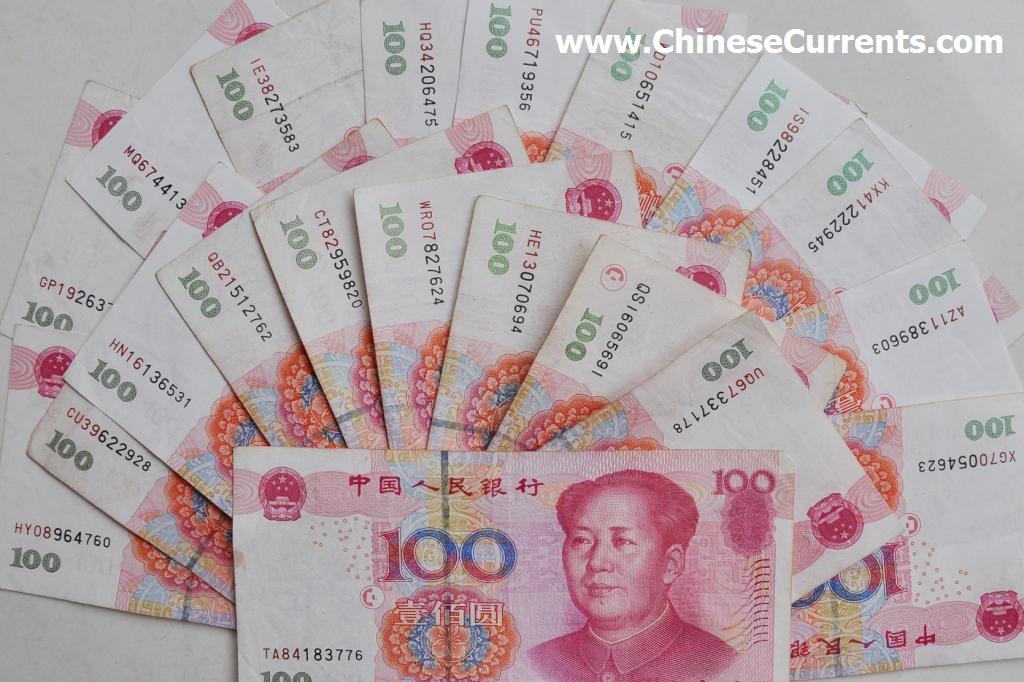
|
| All numbers present and correct |
. A Giant leap Friday, 19th
June 2009; Beijing to Chengde, Hebei
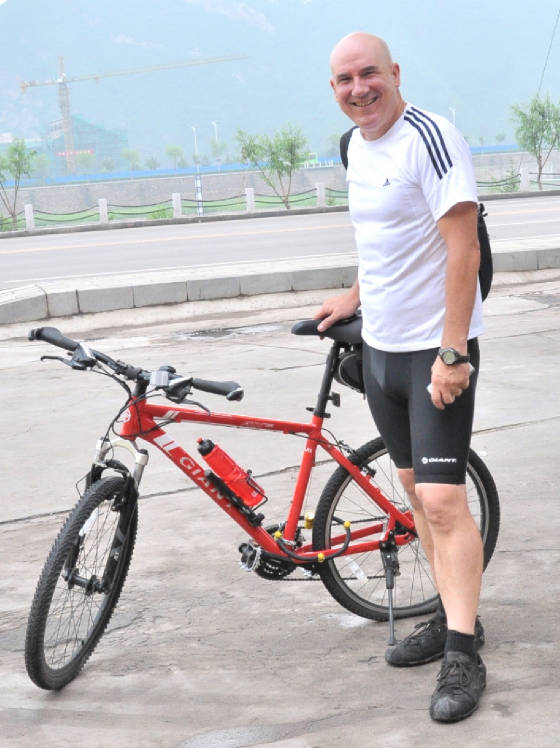
|
| A flat tyre, but not deflated |
His yellow jersey shone
brightly as, head down, the red-helmeted cyclist rode towards me. I was standing by the side of the road,
drinking a cold Pepsi (the full fat version in case you were wondering), and thinking that the 50km I had just cycled should
have been a lot easier than it was.
Mr Liang, who had probably spotted that I, too, was riding a Giant and dressed in cycling garb (without a helmet),
screeched to a halt.
“Where are you going,” he gushed. “I’m heading for the Fragrant Hills, and then to the city,
before returning to where I live, a few miles west of the airport,” I answered. “Where’s the airport?” It was clear that Mr Liang
is not a local. “More
to the point, where are you from,” I asked.
“Inner Mongolia”.
Inner Mongolia is a very big place. I was keen to find out more. Mr Liang, who is in his early 20s, told me that
he is from a small town about 100km the “other side” of Baotou and that he had already cycled 860km (with about
40km still to go). Even more impressively, he had left home the day before. By anyone’s
definition, 450km a day is a long stretch in the saddle. At an average speed of 30km an hour (a pace that’s
way beyond my ability for more than an hour or so) he would have been in the saddle for an average of 15 hours a day by the
time he reached his goal, “Tiananmen”.
“I’ve never been to Beijing,” he said, “I’ve often dreamed of seeing it.
And I thought, why don’t I cycle there.” Mr Liang is, without knowing it, the best possible
kind of endorser of Giant’s advertising tagline and company ethos, “Inspiring adventure” (better than anything
they have ever paid for, to be sure).
“Can I take a photo of you and me together,” he asked. “Only if you promise to
send me a copy,” I countered with a smile.
Photo taken, we exchanged email addresses and shook hands. With a cheery wave, Mr Liang continued
on his way down the G110, the road that connects the capital with Baotou and way beyond to Yinchuan, the capital of Ningxia,
about 1300km away. I,
too, felt inspired. In a flash I had made up my mind to do the following day what I had been threatening
to do for a long time. To cycle all the way from Beijing to Chengde in Hebei province, weather depending
of course. Why Chengde?
Well, it’s a famous mountain resort, which was the summer retreat of various Qing emperors no less.
And I hadn’t been there. What’s more, it’s “only” 220km from where
I live. Problem was, the last time I had cycled more than 200km in a day was more than a quarter of a century
ago. Anyhow, my determination
was bolstered after a hot bath and a look at the weather forecast, which promised a cool day (possible showers) and a head-wind
of no more than 10km per hour. A tail wind would have been better of course, but why make it easy for oneself? I left quite late in the morning,
knowing that this would create a bit of pressure to keep up a reasonable speed so that I could reach Chengde before dark.
The first three hours were a joy – cool, quite flat, and light traffic (with minimal fumes and dust), and I was
on track, averaging a little over 25km/hour.
Then I entered the mountains. I knew that Chengde lies at about 300 metres above sea level.
But I had no idea just how high I would have to climb on the way there. I had conveniently scrubbed
from my memory the snippet of knowledge that the highest point of the Yanshan mountains, 2118m, at Wulingshan, was not far
to the east of my route. Just as well, because I don’t think I would have attempted the ride with
that in mind.
It turned out that the high-point of the journey was “only” 790m, but there were two other severe climbs
from about 300m to just shy of that height. Severe enough for me to wonder what I was doing in the middle
of nowhere, cycling up mountains that made the Derbyshire peak district (my nemesis as a young cyclist) seem about as significant
as a bump in the road.
Then it began to get darker.
It began to rain.
It then rained heavily.
Just when I thought it couldn’t get any worse, it began to rain torrentially. I had no lights, no waterproofs,
and I still had about 35km to go. But, on the plus side (it pays to be optimistic in these situations)
I was much higher than Chengde. There couldn’t be another climb, could there? There wasn’t.
Spurred on by the survival instinct, I raced downhill, managing an average speed of the required 35km per hour, to
complete the 220km adventure in 8 hours and 40 minutes – slightly better than my 25km per hour “goal”.
Alas, my momentary triumph was
deflated in more ways than one when, no sooner had I entered the city, I had a puncture. I was soaking wet, exhausted, and aching in places
I never knew I had. Having no will to mend the puncture, I persuaded the kind owner of a garage to allow
me to house my Giant there for the night. I then found a hotel, a hot bath, and time for reflection. The victory procession was a bit shorter than I had
planned, but the most important thing was that I had somehow managed to cross the finish line – thanks to Giant for
making such a great bike (not to mention excellent cycling shorts), and a big thanks also to Mr Liang for giving me the inspiration.
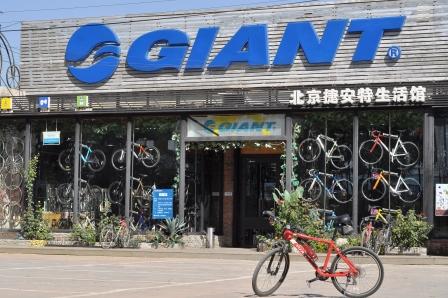
|
| The biggest bike-maker in the world sold 1M in China last year (of 5.2M global sales). |
Tea with the Gao Brothers Friday, 15th May 2009; 798 art district, Beijing
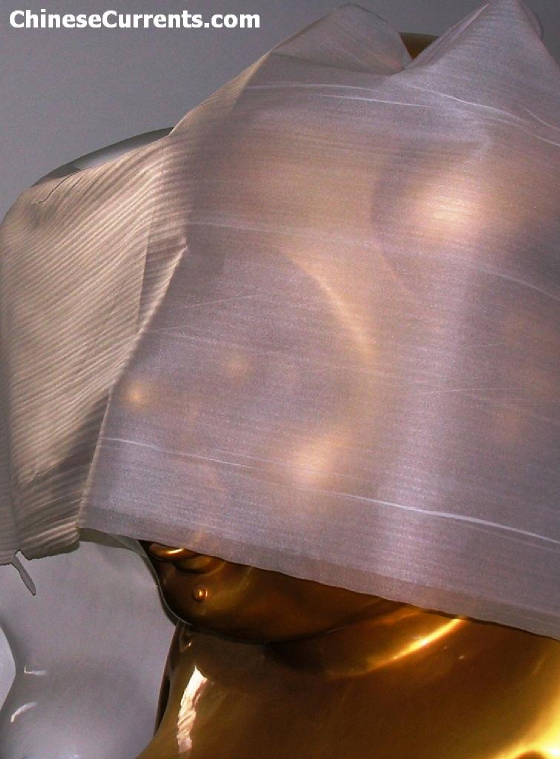
|
| Miss Mao - Still under wraps |
“Great to see you again!” exclaimed Xiao Gao. I was amazed that he remembered
me. He had been the
only person looking after his uncles’ studio in Beijing’s 798 art district on that cold, dark day in December
2007 when I wandered in. Beijing had been one of the stop-offs on my 10,000 mile train ride around China and his uncles, the
two Gao Brothers, had been high on my wish list of people to meet. It had been a long shot.
I hadn’t an appointment; I didn’t even have an address.
The 798 district was (and still
is) a maze of alleyways, lined with numerous studios and shops, so it was only by some stroke of good fortune that I managed
to stumble on their private studio. But that’s where my luck ended, because the famous Gao Brothers
were out of town. Their
nephew, sensing my disappointment, went out of his way to make me feel welcome. He allowed me to look around
the studio and even dashed out to “the gallery” to get a copy of a book on one of the Gaos’ European exhibitions
I wanted to buy for a friend (leaving me alone among exhibits worth many millions of yuan). The Gao Brothers had sprung to fame a few years earlier
on the back of their Miss Mao series of sculptures. The much-larger than life-size busts, depicting The
Great Helmsman with pronounced womanly characteristics was applauded by international art critics and adored by news reporters. Gao Qiang, 47, the younger of the
two, told Reuters: “During the Cultural Revolution, we used to say Mao was like the mother of China.
So we decided to give mother breasts.” The work was less warmly received by the authorities
here; and the Gao Brothers were ordered to remove Miss Mao from public display shortly before the Communist Party conference
in October 2007. 20 months later, the statues are still under wraps.
Xiao Gao and I chatted for a
while, before he stopped in mid-sentence, as if he’d just remembered something important: “They’re here today!” he gushed. “I’ll go and
tell them you are here!” With that he rushed upstairs, and
in a moment was back again, offering a cheery “Please go on up!”
Needing no further encouragement,
I almost ran up the stairs that leads to a private area of the gallery. As I did, I was thinking about
what I would ask them. The elder of the Gao Brothers, Gao Zhen, 53, extended his hand
to greet me. “Would you like some tea?” he asked. His didi,
or younger brother, joined us a few minutes later and we settled down for a thirty-or-so minute tea-fuelled chat. “Have you seen our latest
work?” Gao Zhen asked. At that he took out an eye-catching brushed metal iPhone and showed me photographs
of a huge stainless steel head of Lenin (with a small Miss Mao on top of the head for reasons I wasn’t able to translate)
that “took six months to create”. My friend, who was visiting from England, asked them whether
they had worked on it together. The response, “We always work together on every project”, was
said in a way which suggested that solo work would be unthinkable. As if to signify their close bond, the younger brother took out an iPhone that
was identical to his brother’s, and showed more pictures of their latest work while grumbling “These [iPhones]
are 4,000 RMB in China [they are not available through official channels here]". "Yes..," the elder Gao
continued from where his brother had left off, "...That’s far more than they cost in the US”.
Intriguingly, I didn’t recognise the model of phone. (Could it be that the Gaos are using their metalwork skills
to customise their own iPhones?) I asked them how things are in their art world.
If the dramatic fall in the prices of Chinese contemporary art was worrying them in any way, they certainly didn’t
show it. “Things are really good,” said the younger brother, “…we’re exhibiting
in Paris later this year”. “What about the hugging,” I asked, “Any plans for more exhibitions?” At this point it’s worth noting that the brothers work in many mediums. As well
as exhibiting sculptures, paintings, and photography in London, New York, Rome, San Francisco, Moscow, and many other cities,
they’ve also performed what has been described as “social sculpture” at the Brandenburg Gate in Berlin,
on London’s South Bank and even at the arboretum in Nottingham. The success of what they call “The Utopia of the 20 minutes embrace”
relies on the Gao Brothers’ ability to persuade complete strangers to hug each other. London had
been thought to be a tough nut to crack – and Nottingham an even tougher one – but much to many commentators’
surprise, the stereotype of “English reserve” was blown apart. People simply loved the idea;
and the vast majority of those approached actually embraced the chance to hug a stranger. Not surprisingly, the sight of Chinese people (stereotypically
even more reserved) teaching English people how to hug a complete stranger made the main UK news. The Gao
Brothers were even invited to appear on the BBC's flagship news and current affairs radio programme, Today on Radio 4.
Much to the surprise and amusement
of regular listeners, the programme’s normally straight-laced presenter, John Humphrys, was also persuaded to perform
a live hug. (The three-minute broadcast can be heard here.) “Yes indeed,”
said the younger brother excitedly, “…We have big plans for our hugging project. This year
we will go to Israel and get Palestinians and Israelis to give each other a hug”.
How wonderful that would be.
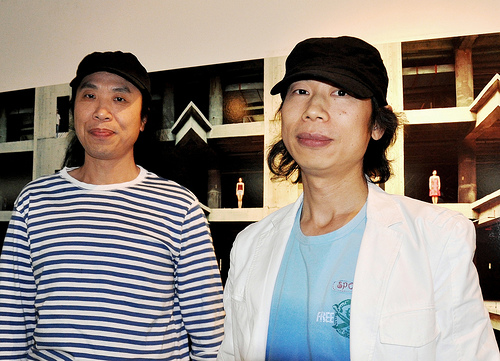 . If you go down to the woods today... Friday, 1st May 2009; Nandaihe, Hebei
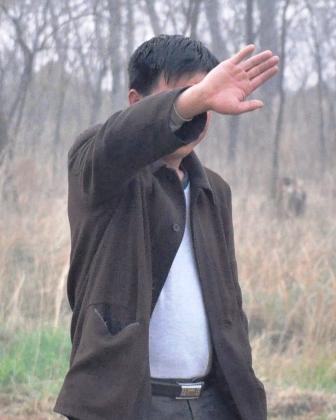
|
| Second thoughts |
May Day isn’t quite the holiday it used to be.
For many years, the 1st May was the start of the second of the annual “Golden Weeks” – public holidays
lasting a full seven days. The other two seven-day holidays – Chinese New Year (in January or February
depending on the phase of the moon) and the October holiday (from the 1st to the 7th October – to honour the anniversary
of the founding of the People’s Republic of China on the 1st October 1949) are still on the calendar. But
the “May Day week” has been relegated to a three day holiday (the other days have been used to mark more traditional
festivals).
But May Day is still an important holiday – in northern China particularly, where the winter seems to go on for
an age. For many in this part of the country, May Day signifies the proper arrival of spring; and the attendant
feel good factor is palpable.
The beaches of Beidaihe – “Beijing’s seaside resort" – were thronged with long-weekenders.
The many fishing ponds around the town were packed with fisherman to the extent that it was difficult for many
to swing their rods. The Olympic Park (the town’s biggest park) was buzzing; as was the Lotus Hills
(the mountain park on the western edge of town). Everyone – locals and visiting Beijingers alike
– was determined to make the most of the day.
As well as beach volleyball, rollerblading, football, table tennis, beachcombing, swimming, and tennis, I encountered
another “sport” that belongs to quite a different league: the league of cruel sports. It was 5.15 am.
I saw
a car stop at the end of the track. From it emerged a man carrying two bird cages, each containing a single
Chinese Grosbeak – whose soulful song, he hoped, would lure migrant birds into the trap he was carrying.
I watched, unseen, from inside of the wood through binoculars as he set up his long “mist” net (so-called
because the thread that makes up the net is so fine that birds can’t see it). Rather than intervening
straight away, I decided to wait for him to finish his work. Twenty minutes later, with his trap set, he
walked the 80 metres or so back to his car to wait for the first unsuspecting migrant to become tangled in the net.
This was not someone catching birds to eat or to sell for a few yuan to feed his hungry family; this was a man intent
on enjoying a morning’s sport.
Having waited long enough, I thought is was time for his net to bulge – but not in the way he was hoping for.
I walked to the far side of the wood, so the net was closer to me than to him; and then I walked quickly up to the
poles that supported the net and tore them out of the ground, before ripping the net to shreds in front of him.
He was
not amused to say the least. Not only was he hurling abuse, he was running towards me with fists clenched.
I then took several shots – of the photographic kind of course – while returning a volley of abuse at him.
“If you
come any closer,” I shouted, “I’m going to hit you”. This literally stopped him
in his tracks. He looked at me, covering his face as he did so. I took some more shots.
Any thought of assaulting a foreigner – particularly one that would have
seemed to him to be seriously unhinged – was dismissed and, instead of running at me, he ran to retrieve his caged birds,
before marching with them across the field away from me.
As he was retreating, I reminded him of the illegality of what he was doing (interspersed with some “street Chinese”
of my own) and, just to rub the salt in as it were, also told him that the police would be calling on him later that day (thanks
to my relationship with some influential people in Beidaihe who care passionately about the wildlife here). I had wrongly thought that things had moved
on in my local town. The last evidence I had seen of this reprehensible activity was more than five years
before. 15 years ago, it used to be widespread. But since then, even would-be bird catchers
could not have failed to notice that Beidaihe is visited, every May, by scores of foreign birdwatchers who come here to witness
one of the great migration spectacles in Asia – the mass movement of birds towards their Siberian breeding grounds.
The local government has embraced the concept that the area is on the world map of important ornithological sites,
and its tourist brochure dials up this as well as its green credentials. So netting wild birds in Beidaihe and the surrounding area is not just
illegal (as it technically is all over the country) it could also be politically damaging. So, imagine my surprise, repulsion,
and not to mention indignation, when I spotted a bird catcher on the edge of the Nandaihe “Magic Wood”.
I’ve visited this fast-shrinking coastal wood in 14 of the last 15 Mays, and over the years I have found
some incredible birds there (hence my naming it “Magic”); and in all of that time today's encounter was the first
time I have seen a bird-catcher.
Let’s hope he tells his bird-catching friends what might happen if they go down to the woods today.
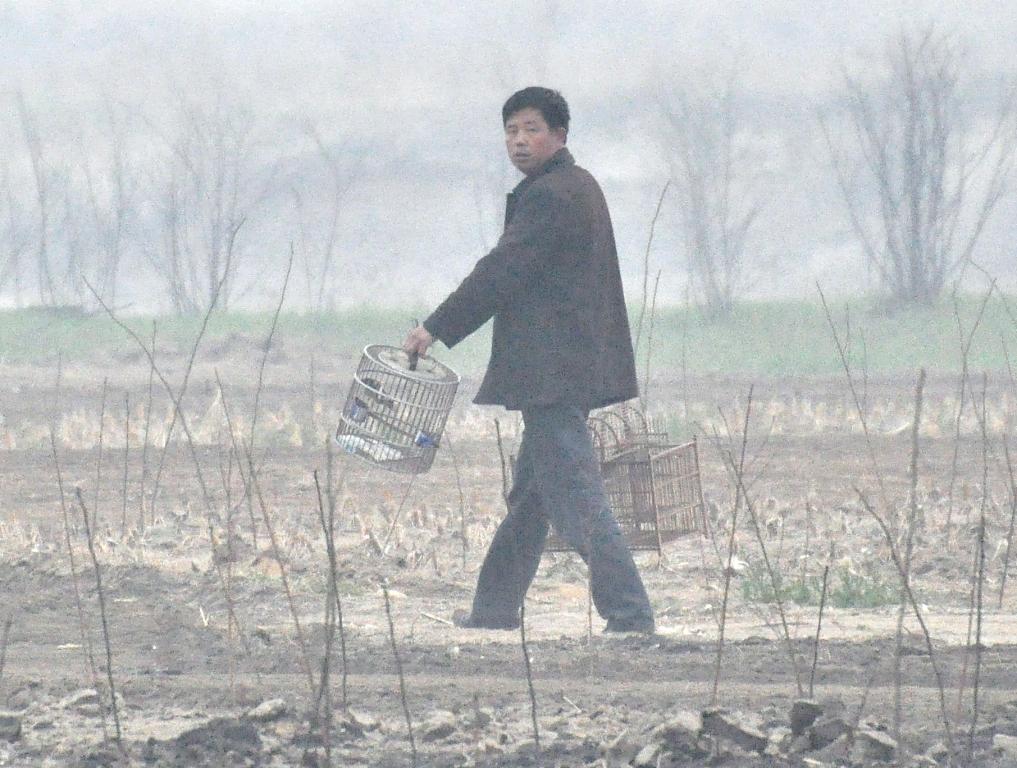
|
| The Bird-Catcher |
. Turning the corner Monday, 20th April 2009; Beijing
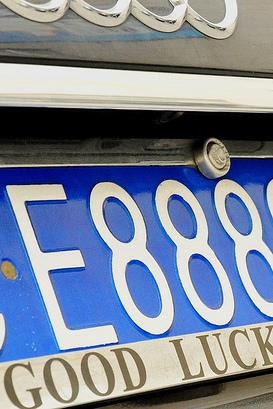
|
| A lucky year for auto companies? |
The much-vaunted four trillion yuan economic stimulus package seems to be working
a treat. That is, if the queue of people waiting for a test drive in the Honda dealership were anything to go by.
The tide turned on January 20th when
the government halved its earnings from purchase tax (from 10 to 5 per cent) on cars with smaller engines. Most of the people watching TV in the Honda showroom, though, had been waiting
to drive the 1.8 litre Civic, which is a splash or two higher than the 1.6 litre qualifying size. But,
thanks to the marketers at Honda’s quick response, no one there was thinking that they would be losing out on the tax
giveaway. That’s because Honda are offering a 5 per
cent special discount on the Civic that cancels out any perceived advantage enjoyed by manufacturers whose stables are dominated
by 1.6 litre vehicles and lower. Before my weekend tour of
the car showrooms I had thought that the strong performance in March car sales had been driven by far deeper discounts than
the paltry 5 per cent that is being offered by Honda. But, no matter where I tried, I found it impossible to get any
offer exceeding that level.
Compared with what’s going on in other parts of the world, car sales in China are in a completely different gear.
In March, passenger car sales (including SUVs and MPVs) increased to 772 thousand. That’s
27 per cent more than in February and more than ten per cent compared with the same month last year. The figures further consolidate China’s position
as the world’s biggest auto market – a position it has now held for three consecutive months. If
China is motoring ahead, then the US is in reverse gear – and a high ratio one at that (last month, vehicle sales were
down 37 per cent year-on-year). “How was the test drive”,
I asked Ms Zhou, who had her eye on a bright red Honda Civic.
“It’s too busy,” she said, “I couldn’t even get out on to the main highway”. The sprawling area of more than 20 car showrooms in eastern Beijing
was indeed jammed with would-be car buyers and an increasing number of people who think that the time is now right to trade
up to a better car. The days when large sedans dominated
the roads, and when black Audis with blacked-out windows took their places in front of the swankier restaurants, are long
gone however. These days, people are choosing a car based on their lifestyle requirements; although status
of course still plays a part (where in the world is that not the case?).
But, in China, the nature of status is changing. Size, although still important, is a less weighty factor
in the decision-making process than it was. Style, technology, and safety are contributing increasingly
more “points” to the buying decision. This changing
attitude is just one of the factors that is driving the growth in smaller cars. In the first quarter of
this year, 1.41 million cars at 1.6 litres and below were sold in China – that’s seven out of every ten new cars.
Ms Zhou, though, was determined to do her bit to help the
‘above 1.6 litre’ category.
“I will buy it [the Honda Civic] because it has a very advanced engine,” she said, “…and I
just love the styling”. But, just as important, she confided, “the five per cent discount means
that I pay the same tax as if I were to buy a 1.6”. Somehow, her mind had been made up before the test drive. Which is
just as well, because she was only able to get the Honda’s “advanced engine” into third gear before the
sheer weight of traffic visiting Beijing’s “car city” slowed her down to a crawl.
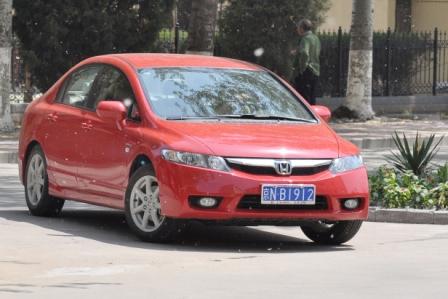
|
| Turning the corner |
. The business of marriage Monday, 6th April 2009; Beijing
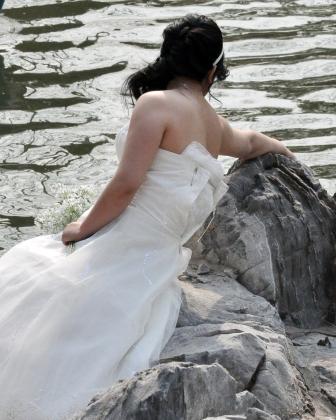
|
| Dress rehearsal for the big day |
Spring is in the air.
A young “bride” – one of more than 10 million young ladies who will tie the knot this year in China –
poses for a wedding photographer in Beijing's Chaoyang Park. Except that she's not yet married.
In China, the official wedding photographs are taken before the wedding, and are displayed – poster size –
at the wedding reception.
Despite the downturn in the economy, the country's wedding photographers are struggling to keep up with the demand.
In fact, at this time of year, you have to be careful where you tread when you go for a walk in China's public
parks. Not because of anything a dog has left behind (dogs aren't allowed in), but because of the profusion
of wedding dress trains that are seemingly everywhere you turn.
Couples from the “no siblings” generation that have been planning to get married, are not, it seems, letting the
economic downturn affect their plans.
This group of people, born in the decade following the 1979 introduction of the jìhuà shēngyù
zhèngcè (the mostly one child "family planning policy") have, over the years, not enjoyed
a very good press. They have been variously described (not by this correspondent I hasten to add) as “China’s
spoiled generation”, or “Little Emperors [or Empresses]”. According to the stereotype,
they are used to getting their way.
My view is that the vast majority of those among this generation who have “got their way” have done so not because
they were handed it on a silver platter – but by striving for it. And, funnily enough, when you’ve worked
so hard for something, you can’t help but feel that there are certain things that you bloody well deserve.
A good wedding is, and will always be, high on that list.
But there is another, far more positive reason why people are continuing with their plans to get married: Wedding statistics tend to reflect the
optimism or otherwise of a nation’s young people. That being the case, China’s future is looking
bright. In 2008 – despite the equivalent of three trillion US dollars being wiped off the Shanghai
stock exchange – 10.6 per cent (more than a million) more couples married than in 2007. That optimism is, not surprisingly, also
shared by the people associated with China’s wedding industry, which (according to the latest figures available from
the Ministry of Commerce and the China Wedding Industry Investigation and Research Centre) is worth something in the order
of 13 per cent of GDP.
If the mood at last week's wedding expo in Beijing is anything to go by, then the industry’s contribution
to 2009 GDP is likely to be greater. More than one thousand companies associated with the industry attended
the three-day wedding-fest and – if press reports are anything to go buy – most were very pleased they made
the effort to exhibit. According to the China Daily, the 34,000 couples who attended spent 29
million yuan there – 30 per cent more than was spent last year. One of the most successful companies,
Perfect & Decorated, a wedding gown and makeup chain, took 1.2 million yuan worth of orders. That’s not to say that couples (and
their parents who support them) are spending money like confetti. The harder times have made soon-to-be-weds
more cost-conscious than ever. It’s a matter of prioritisation though – the things that will
be most memorable tend to get more of the budget.
At the expo, the China Daily spoke with Sun Jingjing, a 26-year-old human resources assistant at a local company
in Beijing, who is getting married in October. Ms Sun cancelled the wedding motorcade, but not to “save”
money. Instead, she used the "saving" to have a wedding dress designed and hand made. "I
didn't cut my budget, but I will spend the money on the right things," she told the China Daily. As well as the right wedding dress and a picture-perfect set of
photographs, the right things also include a honeymoon (France is doing particularly well); wedding sweets (a traditional
gift for the guests); and of course the wedding ring. And, in China, the ring that’s being slipped
on the finger is far more likely to be made of platinum than of gold (last year, according to an industry report, China accounted
for 68 per cent of global platinum sales).
Marriage, it seems, is a joyous
occasion not just for the happy couple.
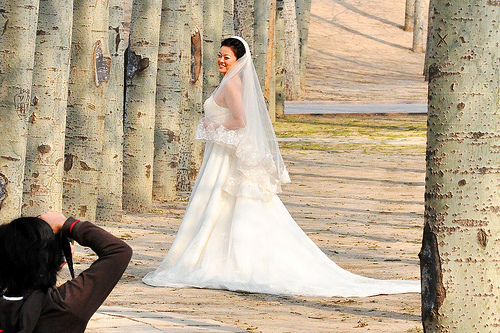
. The Nabang Test Saturday, 28th March 2009; Nabang, Yunnan
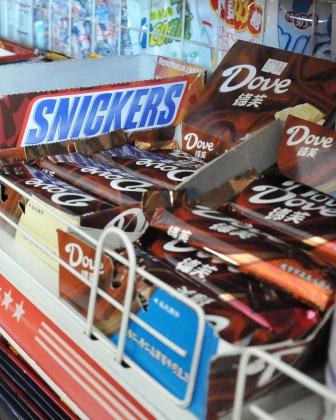
|
| Two brands from Mars that have made it to one of the far corners of China |
This
morning, I continued in a different battered taxi as far west as you can go in this part of China, to the very small border
town of Nabang, which is separated from Burma by a stream that is no more than a couple of yards wide. Bizarrely,
it seemed that more people were crossing between the two countries on planks of wood bridging this, than were crossing at
the official border just down the track. Things just seem to work differently in Nabang – as you
might expect from a place that is just a bit further away than the back of beyond. If a foreign brand can make it here of all remote places, then it’s a pretty good indication
that they’ve cured one of the biggest headaches afflicting foreign brands – distribution to “lower
tier China”. So, then, which brands
have actually passed the Nabang Test? The
first question I felt I had to answer is “what foreign-branded chocolate bars are on the shelves?”. This is an important consideration for me –
and I must declare a vested interest – because Dove chocolate is my staple diet on trips like this (it can add up to
10KM to my daily walking range). I am in luck. Not only do they have a good stock of
“in date” (important to check) Dove, but there’s also a full box of Snickers (same Mars stable as Dove).
My walks in the mountains are set to be that bit more pleasurable (as well as longer). There is Coke of course (one of the first foreign brands to crack lower tier distribution in
China); but there is also Pepsi (I’ve noticed that in recent years they have been making serious in-roads into lower
tier China). And, what’s this? There's also Red Bull?! As well as high profile
Formula One sponsorship they are clearly also investing in grass roots distribution management. Another
surprise is Nestle coffee, and its sister, Coffee-mate. I hadn’t noticed them on my trip here
last year, so they may well be newcomers to these parts. There’s also a good stock of big packs of
Nestle chocolate wafer biscuits (a bit too big for my rucksack alas). In the detergent category, Proctor & Gamble (the masters of lower-tier distribution) have
managed to get an impressive stack of Tide onto the shelves (the only foreign representative in this category, and sold in
the smaller, cheaper bags).
Spending a bit more to look after your clothes is one thing but, surveying the shelves, it’s clear that people
here are prepared to spend a lot of money on foreign brands when it comes to looking after their appearances. And, judging by their share of shelf, the brands that are shining
as brightly as the buyers' teeth, hair and skin are Colgate, and Crest (Proctor & Gamble) toothpastes; Lux (Unilever),
Rejoice and Pantene Pro-V (both Proctor & Gamble) shampoos; and Olay (you guessed it... Proctor and Gamble again) and
Avon skin care products. Both Olay and Avon have an incredibly wide range of products on display
and Avon have even managed to post several items of point-of-sale material – a rare thing in these parts. I watched Ms Peng, a thirty-five year old mother of two, reading
the boxes of various Olay products.
“Sorry, do you mind if I ask you a question,” I asked. “Why do you like Olay?”
“I want to look after my skin, of course."
I thought I should probe further (!)...
“But why Olay?” She spelled
it out for me: “Everyone knows that Olay is a world famous brand you can trust. When it comes to
protecting my skin, I will pay more to get the best”.
“What about foreign shampoos? Do you ever use them?,” I asked. “I sometimes buy them, but usually I buy local brands”. In my discussion with Ms Peng, I learnt enough
to confirm that she will not compromise on skin care because the ultra-violet rays in these parts are thought to be particularly "lihai"
("aggressive") – I already have a sunburnt neck to prove the point. I also gleaned
that she thought that a foreign-brand shampoo was a “special treat”, as opposed to a “necessity”. Talking of necessities, I purchased two bars of
Dove chocolate and a Snickers bar for my hike in the mountains tomorrow. Which is, I hasten to add, one
bar of Dove more than my normal daily intake (when walking long distances that is). Then again, I am planning to walk
an exceptionally long way tomorrow, perhaps more than 30KM (1.5KM of which will be a climb in altitude), in search of very
rare and elusive hornbills. You see, no matter
where you are, when there’s so much at stake, only certain brands will do.
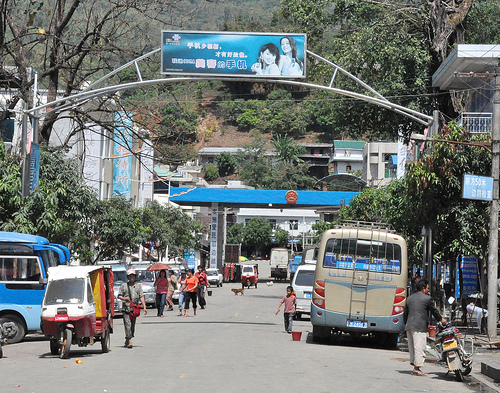
|
| The Nabang border post and beyond it, Burma |
. Land of extremes Friday, 27th March 2009; Shanghai to western Yunnan
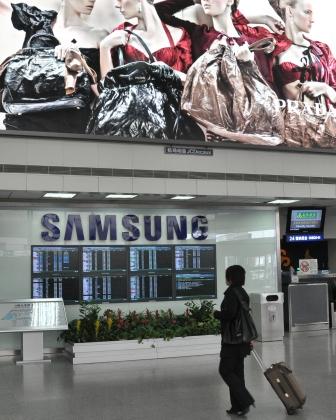
|
| 7am in Shanghai, the richest city in China |
China
is a land of incredible extremes.
Last week I was in Beijing. At the start of the week, a cool wind from the north kept temperatures at or below
the seasonal average of the low-teens (centigrade); then on Wednesday (the 18th) something very strange happened.
The temperature hit an incredible 29.2 degrees. The hottest March temperature there for 59 years. There are numerous examples
of extreme climatic variation and differences. One of the most extreme is the contrast between the winter temperatures
in Heilongjiang and Hainan. While sunbathers are basking in temperatures nudging 30C on the beaches of the
tropical island of Hainan; their compatriots in the north-eastern province of Heilongjiang are wrapping up like Michelin men
to protect themselves from minus 30C.
You can choose whatever measure you like – culture, altitude, attitudes, the economy, zoology, geography,
art, education standards, household income… (go on… really, whatever you like…) – and you
could be almost certain that the two poles of the given category will be miles apart. The variation in household income is as extreme as the
above climatic contrasts. For example, in the first nine months of 2008, the average rural household
income in Gansu province (the country’s poorest region) was 1,952 yuan – or just above seven yuan per day (about
US$1); while the average Shanghai urban household (the richest part of mainland China) earned the equivalent of 225 yuan a
day (or about US$32). A 32 times difference is quite something, but compare the top ten per cent of Shanghai
urban households and the bottom ten per cent of Gansu rural households and you begin to get the idea of just how extreme
the extremes are – particularly if you compare the figures after spending on essentials has been removed. The differences in discretionary spending power are simply enormous;
but that’s not to say that some people in the rural areas of the further flung regions of China are not able and willing
to pay a significant premium for foreign brands. The size of this group varies greatly by region,
area, and district, but suffice to say that even in the most unlikely of places, certain foreign brands are selling like hot
dumplings (or cakes if you prefer). When
it comes to remote places, Yunnan province (which, in terms of rural income, ranks the 4th poorest region in China) has more
than its fair share…
This morning, I touched down at Tengchong airport, in western Yunnan. It’s one of those
airports that is either difficult to land at, or downright impossible to (in which case you have to do a U turn and fly back
to Kunming, the provincial capital). The peculiar topography of the area, which is in the lower levels of
the Gaoligong mountains, make for an entertaining (for any masochists on board) final approach. The pilot
was battling the strong winds and unpredictable updrafts right up to the moment the wheels of the China Eastern flight bounced
on to the tarmac. Usually, in these situations, you can comfort yourself with the thought that the pilot
“must have done this a thousand times before”. Not so with pilots flying in to Tengchong I’m
afraid. The airport was opened on the 16th of last month – and has the worrying distinction of being the newest
airport in China. After calming my nerves,
I grabbed a battered taxi, which somehow looked incongruous parked outside the shiny-new airport terminal. We
headed west, towards Burma. And, four hours later, I finished the long day in a remote part of rural western Yunnan,
chatting with a couple of farmers about the water levels of their local river. Talking of extremes and contradictions… only 12
hours earlier, I had been in one of the country’s oldest airports – Hongqiao – in super-rich Shanghai.
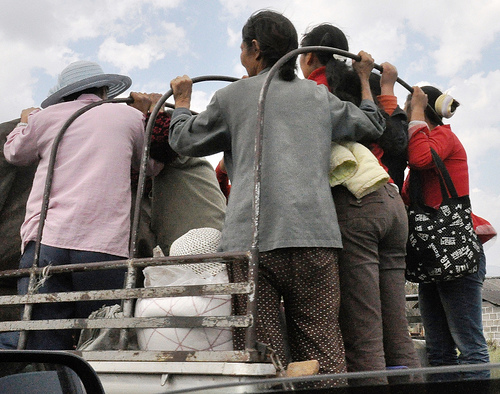
|
| 7pm - rural western Yunnan, in the 4th poorest region in China |
. In not just any
Barbie World Tuesday, 10th March 2009;
Shanghai
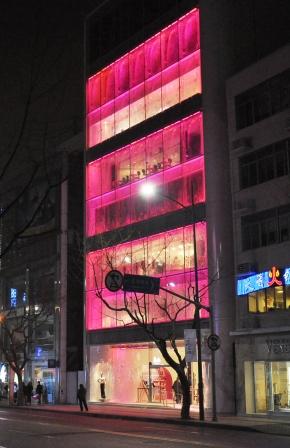
|
| The Pink Palace in Shanghai |
“Could
I have a Barbie passport please?” I asked the pink-jacketed sales assistant. Smiling, but without
a hint of sarcasm, she asked for my name and date of birth. “No, it’s not for me; it’s for my five year old daughter”. That straightened out, I was asked to take her
over to the Barbie photo studio for her “glam shot”. “I’m
afraid she’s in Beijing,” I replied. “No problem, she can have her photo taken when she comes to Shanghai.” The lady said it as if it were an incontrovertible
certainty that my daughter will make the pilgrimage to Barbie’s pink palace on Huaihai Zhong Lu. And
the extreme likelihood is that she will be proved right sooner rather than later. The exact timing will
depend on how quickly I show her the photos I took today – not to mention her shiny pink Barbie passport of course.
When she realises what’s here for her in Shanghai, I’m sure that Hong Kong Disney will be relegated from
top-spot on her wish list of places to visit; and that she will start taking a keen interest when she next hears I’m
off to Shanghai on business. The Barbie store in Shanghai is the world’s
first Barbie “experience centre”. The grand opening was last Friday, timed to coincide with
Barbie’s 50th birthday. This
emporium of pink pleasure provides young (and young-at-heart) girls with six floors of eye-popping displays and activities.
Why not take a day to test out the Barbie anthem’s claim that “In a Barbie world, life is plastic, it’s
fantastic”: You could start by having a Barbie makeover in
the beauty centre. Then why not try on a few new outfits and show them off to an admiring audience as you
strut your stuff on the runway. Or what about spending some time chatting online to your American friends
in the computer room (pink of course); before stopping by at the professional-standard photo-studio to pose while seated on
a large pink throne (plastic may be fantastic, but purists will be relieved to know that this material doesn’t feature
in the camera they use here – the Nikon D200 has a die-cast magnesium alloy body). If you fancy a work-out, or even a yoga class, there’s a large dance studio with
wall to ceiling mirrors. And, when it all gets a little too much, you could always retreat to the reading
room. By which time, you will undoubtedly be ravenous, so you’ll need to make your way to the top
of the shop – the 6th floor – to dine at the Barbie restaurant that was, according to the Barbie press office,
“created at the direction of renowned chef and chocolatier David Laris”, who put together a menu, “designed
for divas of all ages”. Not feeling spoilt enough? Then, you’ll
be needing a facial, or perhaps a body wrap or massage at the Barbie spa (“designed to rejuvenate and transform Shanghai
women into urban princesses”). By now, you will probably be thinking that you
would like to buy a few things. Shanghai’s House of Barbie has something for everyone, no matter
what your budget may be. You could spend just a few yuan on a Barbie book; or for those of you who could
afford to build your own pink palace there’s the 280,000 yuan diamond necklace. Then again, you could
use the same mountain of cash to buy something a little less showy. Let’s see now… 280,000RMB…
How about his and hers Honda Civics (price not including Barbie and Ken sun visors). As
for me, I settled on a Barbie early-reading book; and the three princesses and their sparkly horses from Barbie’s latest
blockbuster film. This
is where the Barbie passport came in handy. The 20 yuan cost of the passport was redeemed and I also received
a 5 per cent discount off the total price. As well as my first stamp in the passport (a full page of stamps
qualifies for a special free gift no less). I handed over the required number of appropriately-coloured
100 yuan notes (the flagship note here – in China that is – is indeed Barbie-pink. How’s
that for a marketing coup). I descended the spiral staircase – the walls
of which showcase no fewer than 875 signature hand-made and individually styled Barbies – feeling that I had just
had one of the greatest retail experiences in the history of shopping. Imagine
what a five-year old would think.
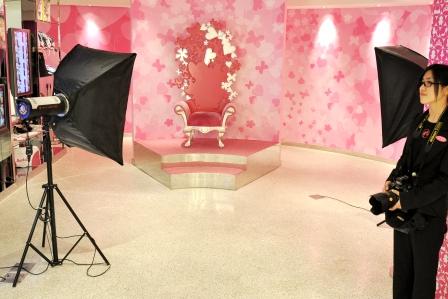
|
| Waiting for a princess |
. The other side of Shanghai Sunday, 8th
March 2009; Chongming Island, Shanghai
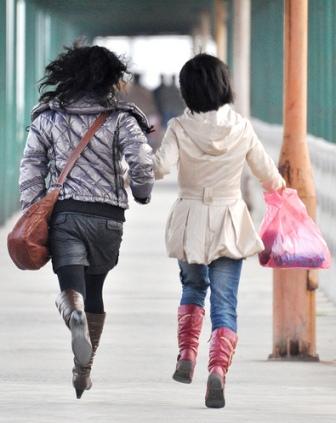
|
| Mum and her daughter run to catch the boat back to the Shanghai "mainland" |
The taxi driver’s puzzled look told me that I was in for
a much longer journey than I had planned. “Where to??” he repeated. I spoke more slowly: “To Chongming Island”. “Which port?” he asked. “Not to a port; please take me to the island.
I want to go to Dongtan in the east; very close to the main highway.” “Which port?” he repeated, with more than a note of exasperation in
his voice. I was beginning to
raise my voice: “Please take me to the island via the bridge; I don’t want to go by boat”. “There isn’t a bridge; there’s a tunnel,”
he said with a grimace. “Then
please take me to the island via the tunnel,” I pleaded. “I can’t. It won’t be open until next year!" This stopped me in my tracks. The map I’d
bought only the day before clearly showed a bridge – or maybe it was a tunnel after all – linking the Shanghai
“mainland” with Chongming island and another bridge (tunnel?) connecting the island with Jiangsu province.
I showed the taxi driver the map. “That’s
right,” he said, “that’s what they say is going to happen”. “Sorry,” I said, realising that my map was “before date”
as opposed to “out of date”. “In
that case please take me to the port” “Which
port?” he asked. We eventually
arrived at Wusong, which is the closest port to the centre of Shanghai and I bought a ticket for the next fast boat to Chongming
Island, which would take about 50 minutes to cross the Yangtze. I had about 40 minutes to wait, which was
just enough time to buy a thick tracksuit top in a nearby shop (it was much colder than I thought it would be).
The hydrofoil docked on the island, and in a few minutes I had negotiated a round-trip to Dongtan nature reserve and
four hours waiting time for about the same price that the same driver had initially wanted for just taking me there. Chongming island falls under the jurisdiction of Shanghai and
holds a population of about two-thirds of a million people. If plans for an eco-city there are to be believed,
then up to another half million people could be added to that figure in the next several years. It’s
never been very clear though just how eco-friendly the eco-city will be – indeed many environmentalists have been up
in arms since development plans were announced because the area that has been ear-marked is very close to a nature reserve
of international importance (the very reserve that I visited today). Although, having said that, things
have gone a bit quiet on the development front since one of the main supporters of the project in the local government fell
spectacularly from grace. On the plus
side, Chongming island is getting bigger by the day; soil washed down from Yangtse is attaching itself to the island at an
impressive rate. Indeed, the New Scientist reported in 2006 that the land area of the island had
doubled in size since 1950 – and is now more than 100km long by about 30 wide. Funnily enough, walking around Dongtan nature reserve
and watching the reed harvestmen (most of whom are migrant workers from Anhui) plying their trade as they sing their haunting
melodies to coax their reed-pulling water buffalos forward, you could be forgiven for thinking that you’ve been caught
up in a time warp that has whisked you back to the 50s – the 1850s that is. This place is the proverbial million miles away
from downtown Shanghai and its boutiques and bars. Let’s hope it stays that way.
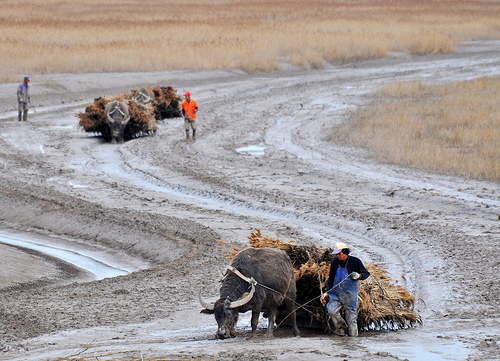
|
| The other side of Shanghai - a million miles from the boutiques and bars |
. . Journey to the far
corner of the Earth Friday, 27th February
2009; Sanya, Hainan

|
| Taking photos of romantic rocks |
A call on Monday
changed my plans for the week. I put down the phone with a smile. Instead of freezing
in Beijing, I instead flew to Shenzhen in Guangdong province the following morning for a business meeting in the afternoon.
The temperature in Shenzhen was in the high twenties and the contrast with Beijing could not have been more marked.
Beijing really is an inhospitable place in the winter. So,
faced with the prospect of flying back to the frigid north or staying in the pleasantly-warm south, there’s no prize
for guessing which option I took. The only question that remained was, where in the south should I go?
I toyed with the idea of flying to Xishuangbanna in southern Yunnan – a place I have been to twice before –
which is a great place to spend a few days (there’s even an outside chance of seeing wild elephants there).
But the flight was via Kunming, the provincial capital, and so would take about three hours. The
best option, I decided on my way to Shenzhen airport, was to take the short hop over to Sanya, in southern Hainan (China’s
most southerly province and a popular island tourist destination) – a flight time of not much more than an hour.
I had visited Hainan twice before, but had never had time to do any birding there. I arrived at Shenzhen airport three hours early, with the intention of dropping my
bag there and venturing out to find some birds nearby. The golf course to the north had some good habitat,
and so I spent a couple of hours walking around its fringes and the wasteland next to the airport’s perimeter fence
– a little noisy perhaps, but I saw some quite nice birds. The
flight was delayed by an hour and a half and so it was gone 11pm by the time I stepped out into Sanya airport’s modern
terminal building. In front of me was a large map of the island; which was just as well because I hadn’t
had time to do any desk research on exactly where to go. I remembered that there is a famous nature reserve
called Baihualing, but wasn’t sure where it was. One look at the map made me realise that it was
far too far from Sanya to make a trip there feasible (To go there, it would have been far better to have flown to Haikou,
in the north of the island). I had a fuzzy recollection that there was a reserve
much closer to Sanya – the name of which, “Jianfengling”, had kindly been confirmed by SMS by a birding
friend back in Beijing. And there it was on the map, no more than two hours drive to the north-west.
I checked in to the hotel opposite the airport for a few hours sleep, before rendezvousing at 6am with the car that
I had arranged through the hotel’s concierge as I was checking-in. Two hours later I arrived at the
forest lodge at Jianfengling, where I stayed two nights. My time there was nothing short of wonderful.
I managed to see 21 species and sub-species of bird that occur only on Hainan island, including some very special “firsts”
for me (the “Wild Side” section of this site has some of the photos of the them). I also managed
to walk more than 50km, and lose quite a few pounds in weight (as well as a layer of skin on various parts of my body that
would eventually peel off – the ultra-violet rays here are a bit of a shock to skin that’s spent most the past
six months much further north). And so, with a broad smile, I said goodbye to
the reserve staff at 10am this morning (promising to return in the not too distant future) and headed back to Sanya.
I had booked a later flight back to Beijing so I could take a detour to one of China’s top tourist attractions.
As well as a good place for people-watching it transpired that Tianya Haijiao is also a good place to watch birds –
I managed to complete the full set of 10 Chinese-occurring sunbirds by adding Olive-backed Sunbird to my list. Tianya Haijiao, which means something like “The end of the sky and the corner
of the earth” is a must-visit site for visitors to Hainan. As well as being the most southerly point of
the Chinese mainland (despite Hainan being an island), the place is immortalised by a number of ancient poems
that recount the poignant tale of two lovers who, under pressure from their respective families to end their relationship,
flee to the furthest point in the world in an attempt to stay together. Alas, they are tracked down and,
rather than surrender to the approaching agents of their families, throw themselves into the sea in a sort of Romeo and Juliet
finale. But, this being Chinese folklore, the story ends with a dramatic twist when the Thunder God, impressed
by the two lovers’ devotion to each other, sends down a thunder bolt that hits the entwined lovers at the moment they
jump into the sea. The magical power of the bolt turns them to stone and thus they are able to remain together
for eternity. These symbolic rocks have become the focal point of Tianya Haijiao and attract countless
numbers of couples from all over China and beyond who come here to reaffirm their undying love for each other. Bizarrely, every year hundreds of couples arrive here to enjoy the “International
Wedding Festival”. They gather on the beach in their wedding clothes and participate in a number
of activities including the piggy back race to the sea. (The bride jumps on her groom's back, who races towards
the lovers’ stones.) I asked one couple there what they thought about
the place. Ms Zhang and Mr Yang are from Haerbin in Heilongjiang – one of the coldest places in winter
in China (famous for its ice festival). Ms Zhang recounted the story of the lovers and said how much
she had been looking forward to visiting here. Mr Yang nodded respectfully as his wife spoke.
“And also,” he said, “The weather here is great this time of year!”.
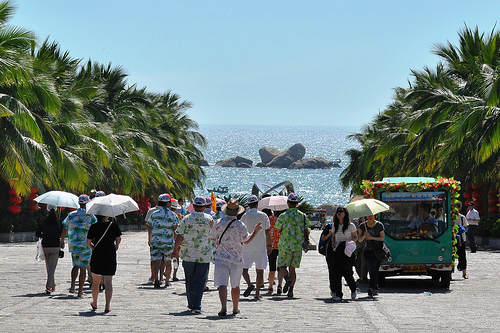
|
| On their way to the edge of the sky and the corner of the Earth |
. . Keep riding Saturday, 21st February 2009; Wenyu River, Beijing
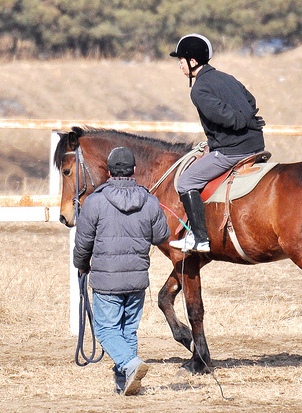
|
| Learning to ride in Beijing |
The Wenyu river is a surprise
in many ways. Walking by the river, with open countryside stretching in all directions, downtown Beijing
seems to be much further away than the 20 minutes drive it would normally take from the Jingmi Lu bridge (that’s
up to 60 minutes during the rush hour mind you).
Now unfrozen, hundreds of
water birds, recently arrived from the south, fly around in raucous bands when disturbed by dog-walkers, a shepherdess and
her sheep; or indeed by off-road cyclists and joggers from the nearby “expat compounds”. The foreign-influence in these upmarket housing
estates is on the wane, however, as more and more locals move up the property ladder and in to the area, replacing the expats
whose China adventure has come to an end.
But, despite the changing ethnicity of the local villa-dwelling population, jogging and bike-riding by the
Wenyu River remain the preserve of the “laowai” (or "old-outsider", the most-often heard Chinese expression
for foreigner). After all, why ride a BMX by the river when you can drive a BMW to the golf course?
Let’s face it, bike riding in Beijing is a pursuit that millions
are striving to avoid.
Horse-riding, though, is in
a completely different league. There is a large equestrian centre by the Wenyu River – one of the reportedly
60 or so that has opened in Beijing – that, judging by the standard of horsemanship on display, caters more for the
beginner than the seasoned rider. If
I were to take a stab at the make-up of their clientele, I would say that the vast majority are under 35 and that two-thirds
are female. No matter what the level of the rider – not that I am qualified to judge – all are equipped with the
“right gear”: stylish breeches and riding boots (most probably bought from the tack shop that’s on Jingmi
Lu - aka Jingshun Lu). Horse-riding, it seems, it as for much for fashion lovers as it is for horse lovers.
This is confirmed by Sherry Kuang – a new fan of horseriding
– who was interviewed by the China International Business (CIB) magazine (Feb 10th) for its article “Ready
to jump the hurdle”: “China’s ambitious professionals see in horse riding something that combines
fashion and sport,” she tells the magazine. Interestingly,
Ms Kuang, a “28-year-old accountant”, bought her stuff from the aforementioned Jingmi Lu tack shop and, according
to CIB magazine, spent “RMB 300 (USD 43.90) on her breeches, RMB 400 (USD 58.50) on a protective jacket and RMB 1,400
(USD 204.75) on boots”. Then there’s the cost of the horse-riding sessions themselves of course:
a block of ten hour-long lessons cost Ms Kuang 2500 RMB. Just to repeat, I’m far from expert
on these matters but, although the magazine article doesn’t mention it, the shopping list would surely have included
a hat. The only other thing I know about horseriding is that riding at speed without holding
the reins is asking for trouble. And that's exactly what I saw through my camera's viewfinder as the shrill
scream of a woman diverted my attention from taking photographs
of a flock of seven Smew (a type of duck). I watched in horror as what I can best describe as
a bronking mule tried to unseat its lady rider, who was fighting a losing fight to keep her balance by using her
arms in the manner a tight-rope walker might when about to lose her footing above a swirling torrent of water.
Although I was a few hundred metres away, the picture below clearly
shows the poor girl about to hit the ground.
The way she fell was horrifying; and I was expecting the worst after she lay motionless for several minutes.
(The picture also shows the concerned
looks of four of the bystanders, who also looked over when they heard her scream.)
I am very happy to report however
that, miraculously, ten minutes later she sat up. A few minutes after that she rose to her feet and, incredibly,
in five more minutes she got back on the very same horse that had unseated her.
Now that's what I call courage.
The admiration - not to mention relief - of the bystanders was palpable. The incident offers a clue as to why a series
of “Keep Walking” TV commercials by Johnnie Walker has resonated so well here among young professionals
– many of whom are feeling particularly vulnerable during these uncertain times. The moral of the
storyline is that, no matter how bad things are, and how many knocks you take, real courage manifests in the ability to pick
yourself up, dust yourself down, and use the bad experience to your long-term advantage.
I’m looking forward to seeing
the lady in the picture on my future walks (or bike rides) by the Wenyu River – and I wouldn’t be at all surprised
to see her becoming one of the centre’s star riders.
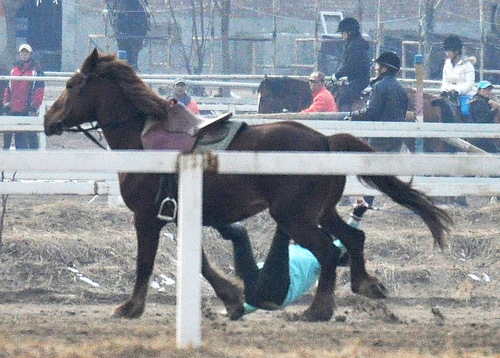
|
| Fall before the pride |
. A strange Valentine's day Saturday, 14th
February 2009; Shenzhen, Guangdong
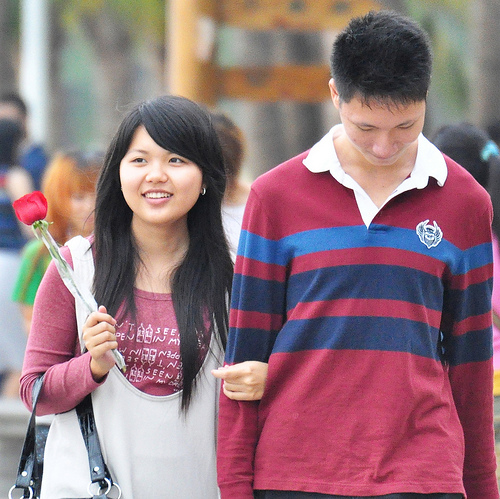
|
| A happy Valentine in Shenzhen |
It was all arranged. After four nights in Shanghai, I would travel back to Beijing
on Friday evening – arriving in time for dinner. And then, on Saturday, I would enjoy a Valentine’s
day with my wife. What could possibly go wrong, I naively thought.
Life is full of uncertainties, but life in China seems to deliver more than one’s fair share of them. At
2pm on Friday afternoon my plan was changed. And it wasn’t a slight change either. Instead
of flying north to Beijing that evening, I would be flying south to Guangdong province’s “special economic zone”
of Shenzhen, which is just across the bay from Hong Kong. And instead of meeting my family for a Friday evening dinner, I
would be presenting some ideas to someone from one of China’s leading technology companies. The arrangement edged into what I can only describe as the surreal, when
I realised that the meeting would start after midnight.
I was picked-up at the airport and, by 12.30am, the meeting was underway. At 3.15am, handshakes all round
signalled that it was, at last, time to check into my hotel. I’ve been in China for so long that
I’ve somehow been able to cultivate a tolerance level – at odds with my genetic make-up – that enables me
to shrug off minor irritations. But the next thirty minutes would have even tested the patience of Job. It took three return visits to the check-in desk to get a room card
that worked. And when I at last managed to get the door open, I wished I hadn’t bothered. It was
literally at eye-level with a rather busy overpass. Shenzhen doesn’t sleep, so even at 4am, it was
like being in a track-side hospitality box at Silverstone on Grand Prix day.
I was too tired to even contemplate changing my room, so I put the television on, hoping the drone of CNN or BBC World would
enable me to forget the decibel level outside of the window. But the TV wasn’t working.
Things couldn’t get any worse I
thought. Until, that is, I flushed the toilet. The handle came away in my hand and,
with it, water sprayed everywhere. I managed to stop the surge of water; and was left with nothing worse
than a very noisy water tank (that refused to fill despite its cacophonous efforts to do so). Strangely, the noise from the bathroom seemed to neutralize the road noise,
and with about eighty decibels coming from either direction, it was not unlike being in a sleeper carriage of a Chinese
train. Last year I did 10,000 miles on Chinese trains in a month and never had any problem getting to sleep,
so I gave it a try. I woke up at 8am. The noise
levels were exactly the same, but I had somehow managed to sleep soundly for four hours. I went downstairs
to politely ask for a change of room. The new room was perfect – except, that is, for a used condom
on the floor that the cleaner had somehow failed to notice. But, at least, it was wonderfully quiet. By 9am I was in a taxi and heading for Hongshu Park
– the “red tree” mangrove bird sanctuary. The area hosted a magnificent array of birds
– of particular note was the flock of about 60 Black-faced Spoonbills (one of the rarest birds on the planet); and tens
of thousands of various ducks and waders, which were making the most of the low-tide. I visited the public area first, which was also great for people watching.
And, being Valentine’s Day, there was plenty to look at. Valentine’s Day is widely celebrated
in China and one could see from the number of couples walking hand in hand that the marauding bands of rose-sellers –
Shenzhen’s entrepreneurs are never slow to spot an opportunity – were well-placed for a busy day. But Miss Zheng, a migrant worker from Hunan province, who’d
invested a sizable amount in 30 roses, was feeling less confident.
“I’ve only sold three all morning,” she lamented. “It’s a disaster…
I guess [the slow traffic is] because of the poor economy”.
“Don’t worry, I’m sure business will be better this afternoon,” I reassured her. “How do you know?” she said, “You’re only
trying to make me feel better”. “Afternoons
are more romantic than mornings,” I joked.
Miss Zheng didn’t think it was funny. I
tried to placate her. “Really; when it becomes obvious that quite a few girls have roses then the
ones that haven’t will soon make sure that their boyfriends buy one for them. It will swing really
quickly.” “Would
you like to buy one?” she asked.
“If you haven’t sold at least two-thirds of them by the time the sun sets, then I’ll buy at least one,”
I promised. I then spent the next five hours
walking several miles around the paved paths of the bird reserve (despite the patrolling police and soldiers).
Somehow, the sight of my camera with a long lens and me mouthing “sshhh!”, with a raised finger in front
of my mouth, deterred people in uniforms from getting close enough to ask me to leave.
I returned to the promenade as the sun was going down. As expected, there were now dozens upon dozens of
young ladies clutching beautiful red roses.
There was no sign of Ms Zheng, who had most-probably managed to sell all of her roses and head off home for an early dinner. I checked with another seller – Mr Deng –
who had just a few roses left.
“Business was good,” he said, “It was slow in the morning, but really picked up”. I was happy that my hunch had been right, but I was left hoping that
business in Beijing hadn't been quite so brisk.
The key question, of course, is... would there be any roses left at the airport when I arrive home tomorrow? Fingers crossed.
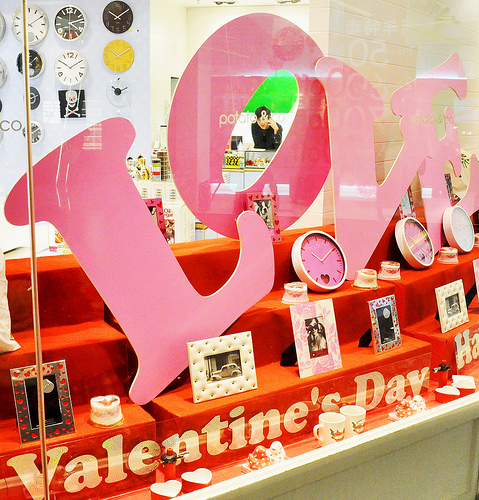
|
| Chinese retailer, stocked up for a bumper Valentine's day |
. . Domestic Arrivals Monday, 9th February 2009; Beijing
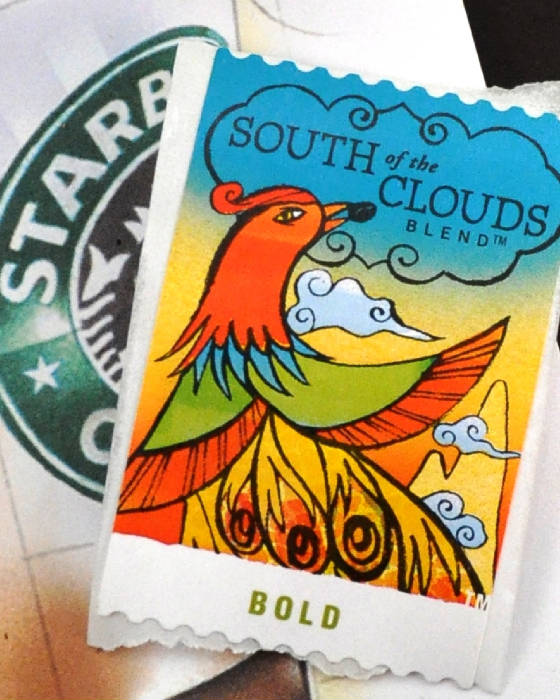
|
| South of the Clouds |
“Have the Chinese beans arrived?” “Chinese beans?” Yes, you know… the Chinese beans.”
The furrowed forehead, pursed lips,
and far-way stare told me that Lee didn’t know. In fact, Lee (the name on his Starbucks’ badge)
had absolutely no idea what I was talking about. “Chinese coffee beans,” I
punted. “Ohh!
I see! Coffee beans!”
Lee’s eyes beamed with
pride: “They’re not here yet, but they’ll be here next week. It’s really exciting,
I’ll show you.” With
that, Lee literally ran toward the counter. I was still trying to work out what he would return
with when, as quick as a flash, he re-appeared with a sticker that showed a brightly coloured bird. The
drawing looked like a cross between a chicken and a peacock, but I guessed it was meant to conjure up notions of a bird of
paradise and all the exotic imagery that goes with it. Above the chicken’s head were the words – written in the kind of soft typography
you see these days in corporate end of year reports to help soften the hard blow – “South of the Clouds”.
“I guess the beans are from Yunnan,” I said. Lee looked at me as if I were some kind of soothsayer. “That’s amazing! How
on earth do you know?” “Well, I’ve been there several times so I know that it’s mostly very
sunny and that yun nan means ‘south of the clouds’. I also know that coffee
is grown there. But, to be honest, the main reason I’m so sure is that I’ve also read about
Starbucks getting beans from there. The story has appeared in quite a few foreign newspapers.” “Really?!” said Lee, clearly pleased
that Chinese coffee beans had, at last, bounced on to the world stage. But why, I wondered, had it taken so long for
Starbucks to spot the quality-potential (not to mention the marketing and PR potential) of Yunnan coffee beans?
Yunnan, after all, produces about 30,000 tonnes of coffee beans a year; of which 70 per cent is exported.
Nestle, apparently, has been buying Yunnan coffee beans for ten or more years – or as least as long as Starbucks
has been in China. The answer – according to the China Daily and others – is that “Starbucks
has been working for three years with farmers and government officials in Yunnan to look for coffee beans that meet its strict
standard”.
I don’t doubt this,
but I’m not a great believer in coincidences either. In 2008, Starbucks’ global net profit
reportedly fell more than 50 per cent year-on-year. 200 stores in the US (where is has 11 of its 16 thousand
stores) have closed in the past 12 months; and its global expansion plans have been recently cut back.
Could it be that, these days,
China – where it has 350 shops in 26 cities – has been getting more of the company’s top execs’ share
of mind? If it has, it’s not hard to imagine that they have concluded that the great hope for their
business is China, where the coffee habit here is still in its infancy; and that one of the barriers to growth is negative
PR. The PR disasters of its very own
“water gate” (the company’s former global policy of keeping a tap constantly running in all of its stores
was widely reported here) as was the Forbidden City “incident” (when, following a reported public outcry, it was
forced to withdraw from one of the bastions of national identity).
There is no doubt that the huge
amount of positive PR they’ve received here in the past few weeks has gone down well and has pushed them that bit closer
to their ultimate goal of making China their number one market.
It has been a great week too
for Yunnan coffee. What’s the betting that, when Nestle and other bulk buyers next come calling,
they will find it that bit harder to drive a hard bargain. After all, they now have Martin Coles, president
of Starbucks Coffee International, fighting in their corner: "The essence,” he said recently, “is
about how we create a presence of Chinese coffee in the world. I hope one day when I walk into a local store in Washington,
my barista behind the counter would ask me to taste the South of the Clouds blend and tell me the story of the village from
which it came."
Any story of Chinese brands going out there, and winning battles in the international arena, is bound to be widely
reported here. Likewise, any brand that fights on their side is also likely to enjoy good press.
So, talking up Yunnan coffee is also good for the brand that has obviously
invested a lot of money, energy, and brain-power in the plan.
“South of the Clouds”
is just one example of how companies are thinking differently about their marketing in China and leveraging innovative ideas
(instead of “business as usual” marketing spend) to meet double-digit growth targets.
I’m looking forward
to sitting down with some “bai ling” (white-collar workers) next week to talk about what they think of
China’s very own coffee. Not to mention sampling the brew myself. In the meantime, I’ll have to settle for the Colombian coffee
of the day and a muffin... But, what’s that? Today’s
special isn’t just any muffin. It’s a “mandarin cranberry muffin” no less!

. . Ox tales Tuesday, 3rd February 2009; Beidaihe, Hebei province
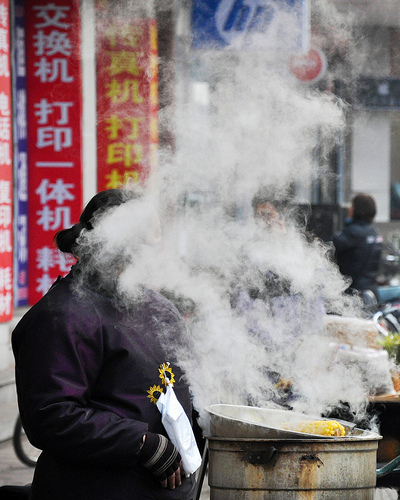
|
| Sweetcorn seller in Qinhuangdao: "I make the same money, I just have to stay out longer" |
It’s time to go to Beijing; having spent ten days in the ice box that is Beidaihe – a small town (by
Chinese standards) on the northern coast of the Bo sea, 280km east of Beijing. Every year at this time
I plan to do what every sensible bird has already done – fly south to warmer climes. And every year
the charade falls flat on its face and, instead of donning shorts for Hainan or Yunnan, I add layer upon layer of the thickest
clothes I can find and head to Beidaihe to spend the Chinese New Year. This year it was particularly cold. Not only was this year’s
Spring Festival – as the Chinese New Year period is called – very early (blame the moon); it coincided with the
arrival of a blast of exceptionally cold air from Siberia (not sure what was to blame for this; perhaps global warming, which
seems to be get the blame for all of the world’s climatic ills – even cold weather). Whatever the reason, this unfortunate alignment conspired to turn an already
cold sea into a frozen wasteland. If you haven’t seen a frozen sea, you may be thinking “how
wonderful”. It isn’t. In such conditions, a walk on the beach is a lot more
than bracing, it’s downright painful. And, more to the point, if you’re interested in wildlife
and perhaps keen to see lots of interesting birds (not that I imagine this would be high on many people’s agenda), it
could – if you’re in the wrong frame of mind – bring with it a grey depression. But, funnily enough, I had a great
time. The warmth of the family helps a lot of course. But even the birding was excellent.
Not by Yunnan standards needless to say. No, the province that is literally yun nan or
“south of the clouds” would have been good for close to 300 species of birds this time of year. In
Beidaihe, I had to make do with 42 species. And I had to work really hard for them – going out every
day but one for at least a couple of hours. The day time high of minus six centigrade (and night time low
of minus 16) had driven even the hardiest of seagulls away from the area.
But, as is often the case, hard-work and perseverance
were rewarded. Each day at least one – and sometimes a couple of quality birds were found that raised the spirits,
and kept my camera-trigger-finger warm. If you're interested, some of the fruits of my labour,
including a photo of the frozen sea, can be found in the "wild side" section of this site. (Many more shots can be seen in my Flickr wild side set)
I digress. The connection –
albeit a tenuous one – with the title of this piece, is that I could see a connection between my experiences and expectations
in Beidaihe, and the way people are dealing with the downturn in the economy in the Year of the Ox. Think
of the good old days of 2007 (and perhaps the first half of 2008, the Year of the Rat) as analogous with a trip to Yunnan
where, if you’re a naturalist, your very large drinking vessel is overflowing with vintage wine (or whatever tipple
takes your fancy). But, even though you fondly remember the good old times in Yunnan, the cold-certainty
of a trip to an ice-bound Beidaihe makes you reassess your expectations. Or at least it should.
If you spend your time here dreaming of Yunnan instead of working hard searching for rare treasure then,
whatever the result, you’d be disappointed. The disappointment would affect the will to get up early;
which would then mean fewer things would be found, resulting in more disappointment. And so on and so forth. A vicious circle to be sure.
But once your goals are realigned; and the criterion of success is reappraised, then the discovery of a flock of Bohemian
Waxwings, a Chinese Grey Shrike, or even a Water Rail amidst a frozen reed bed are suddenly things to write home about.
In a similar vein, people are rethinking their goals for the Year of the Ox. They are reappraising the definition
of “success”; and reworking their values and life-plan. As the situation changes, and the ice
starts to melt, then people will change with it. When it comes to the crunch –
credit or otherwise – success, status, reward, and optimism are movable feasts. As one street-hawking sweetcorn
seller told me the day before yesterday in the city of Qinhuangdao: "I make the same money [as last year] I
just have to stay out longer".
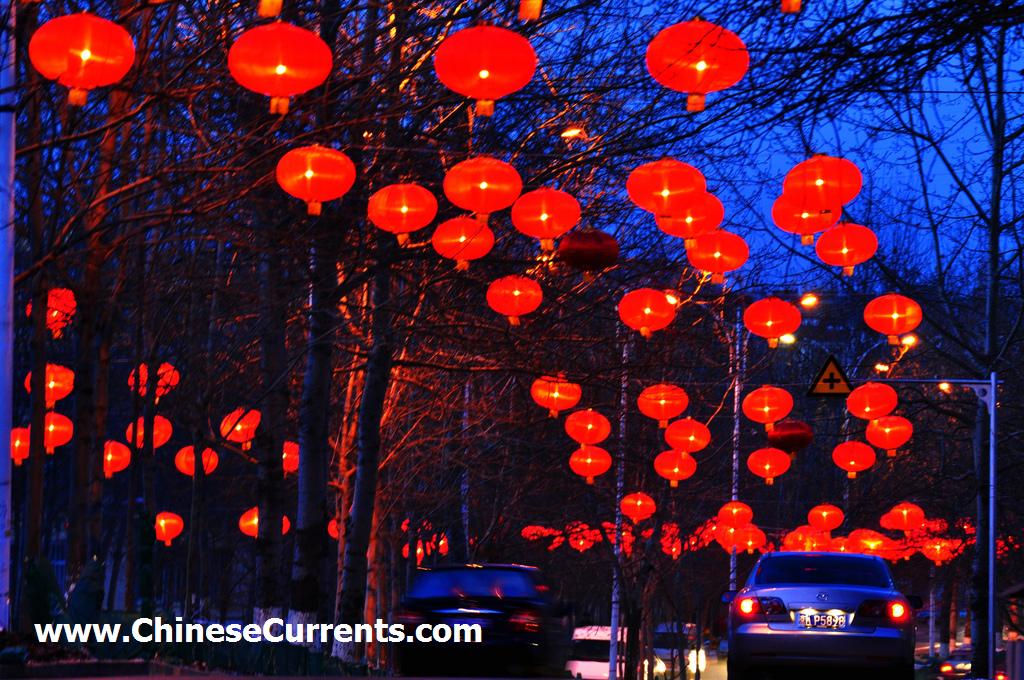
|
| New Year Lanterns in Beidaihe |
"Obama will save the world!" Sunday, 18th January 2009; Shanghai, China
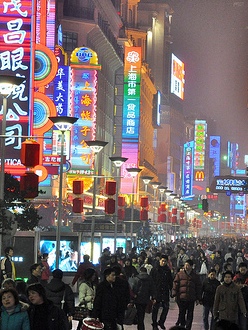
|
| Shanghai shoppers this evening |
I arrived in Shanghai on Tuesday afternoon,
having flown from Beijing where the temperature was an unwelcoming minus 10 degrees Celsius. Shanghai was
15 degrees warmer and, in the bright sunshine, one could have been forgiven for thinking that Spring is just around
the corner. Wednesday was spectacularly clear; the blue sky was bluer than any of the numerous blue skies
I have seen in this city over the years. It was certainly the sharpest possible contrast with the weather I had
to endure on my last visit here, in January 2008, when the heavens opened for the length of my stay. But, more
to the point, what of the mood of the city? Bright, like the weather that greeted me this time round; or grey
with perhaps brooding clouds on the horizon?
The city's vital statistics are indeed slowing down. Reuters, for instance, reports that: “Shanghai
[is] set for [its] lowest growth in 17 years”. But this is a slow-down with Chinese characteristics.
Those who read past this doomsaying headline would have been surprised by its negativity, because the full story is
that Han Zheng, the mayor of Shanghai, has said that the city’s GDP growth in 2009 is forecast to drop to… wait
for it… “nine per cent”! It’s also reported that the mayor said that “2008
was a difficult year for Shanghai’s economic development”. All the figures aren’t in
yet, but it’s thought that the 2008 end-of-year figure is likely to around 10%. Outside of China,
it’s hard to believe that any other city’s mayor would be bemoaning a double-digit growth. Judging by the proliferation of
construction projects I’ve seen around town, it seems that the city’s chiefs have been digging deep into their
municipal reserves to ensure that Shanghai’s fire continues to burn brightly. It's as if a good
few flocks of cranes – that had moved north to Beijing several years ago – to help that city
get its infrastructure into shape for the Olympics, have now returned to their "natural" home. In the past few days, I’ve
spoken to a broad section of people – from brand managers to club owners; from students to a DJ; and from taxi drivers
to a construction worker; and the mood, although somewhat cautious when the time frame of “the next 12 months”
is mentioned, is still decidedly optimistic. As one taxi driver, Mr Zhang, told me: “China
has survived the most terrible hardships in the past 100 years, what’s happening now is nothing. We’ll
easily get through it.” Taxi drivers the world over seem have their fingers on their city’s
or country’s pulse, so Mr Zhang’s views are certainly worth listening to. Another “taxi test”
is the supply-demand equation (available taxis vs waiting punters). Judging by the dearth of cabs displaying
“For Hire” signs in the evening in this city, it seems that Shanghai doesn’t have too much to worry about.
A few evenings ago I walked for two hours and didn’t see a single taxi with an illuminated sign – much
to the chagrin of the numerous people waiting in the cold night air for tens of thousands of drivers to finish their
extended evening slots with their families. Taxi drivers, at least, are in no rush to
work extra hours for a little bit more financial security. But what about the mood in the rest of the country? No doubt that people are being laid off in
droves and that many, many more are fearing for their jobs. No doubt also that consumer confidence indices
are down; and that people are generally pessimistic about the next 12 months. But when one asks people
what they feel about “the future”, rather than about the short term, one tends to get a rather different response.
One of the best places to find and to talk to Chinese people from outside of Shanghai is the Bund (the area that runs
for about a mile, adjacent to the Huang Po river – directly opposite the skyscrapers of Pudong). It was there I met three friends, each in their mid-twenties.
They were from different places, had pursued very different careers, but they spoke as one about the future.
Now, although they were what consumer research companies would call “a good qualitative group”; as a group
of three, their opinion obviously cannot possibly be held to be representative of “young people in China”.
I will have to have the same outcome in a few dozen more of these types of discussions, in many different places, before
being in any position to claim that the hypothesis that I’m unfolding here has any statistical robustness.
But, nonetheless, my instinct tells me that I was hearing the voice of the young people of China: “Of course times are really difficult,”
said Mr Li, a pipe salesman from Xian, Sha’anxi province. “A few people have been laid off in my company, so of course I’m worried”. His friend, Miss Wang, from Xiangfan in Hubei province,
who is a salesperson for a wholesaler of mobile phones, nodded in agreement. Miss Cao, from Nanyang in
Henan, was expressionless. She is a state kindergarten teacher, and the only one of the three who has complete
job security in these times. “Yes,
the world is in a mess,” said Miss Wang. Miss Cao was quick to jump in on this: “Yes, so many problems… the global recession,
the problems in Palestine…” “Some say there’s going to be a war in the Middle East,” responded Miss Wang. “No there won’t be,” said Mr Li,
“there’s too much to lose”. “Mr Obama, won’t let that happen.” It was wonderful to listen to these young people
talk so animatedly and knowingly about world affairs – thanks due to the Internet of course, not to mention the decision
to fast-track its roll-out. Mr Li was
on a roll: “Obama will save the world. But even so it’s going to be a difficult 2009 for all
of us.” They all nodded. But when the subject turned to “their future”,
there was a very different response. “The economic problems in China are short term,” said Miss Cao. “Yes,” said Mr Li, “short term…”
“…We Chinese have
come a long way. These present difficulties won’t set us back. It’ll just
make us stronger”. All three of them nodded. That was a few hours ago. On the way to Nanjing Lu – Shanghai’s shopping magnet – I thought about how to summarise these
comments (in case you were wondering, yes indeed, it took almost an hour to find a taxi!). I’ve come up with the following line that captures
the spirit of these three friends (as well as, I believe, encapsulating the general mood of young people in this country):
“Despite the current adversity…
YES, WE CAN!” ---
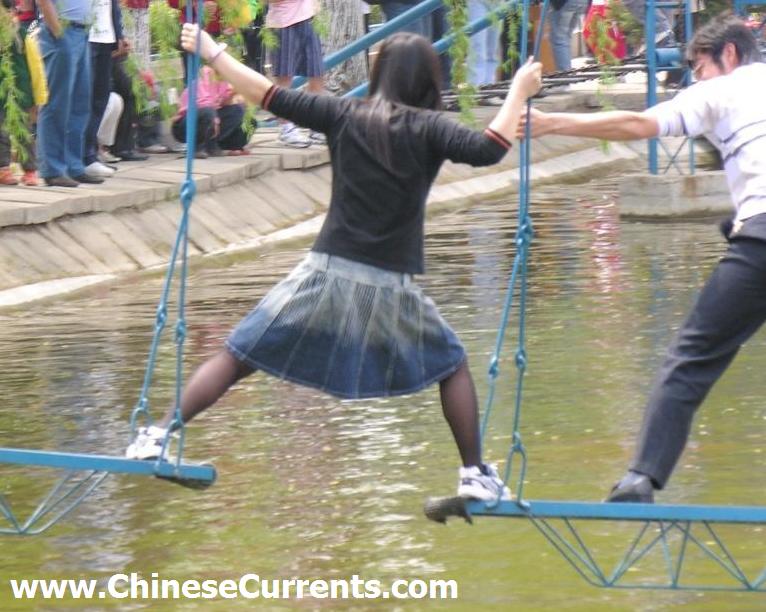
|
| Whatever the challenge: "YES WE CAN!" |
. . Happy New Year? Saturday, 10th January 2009; Norfolk, England
|

